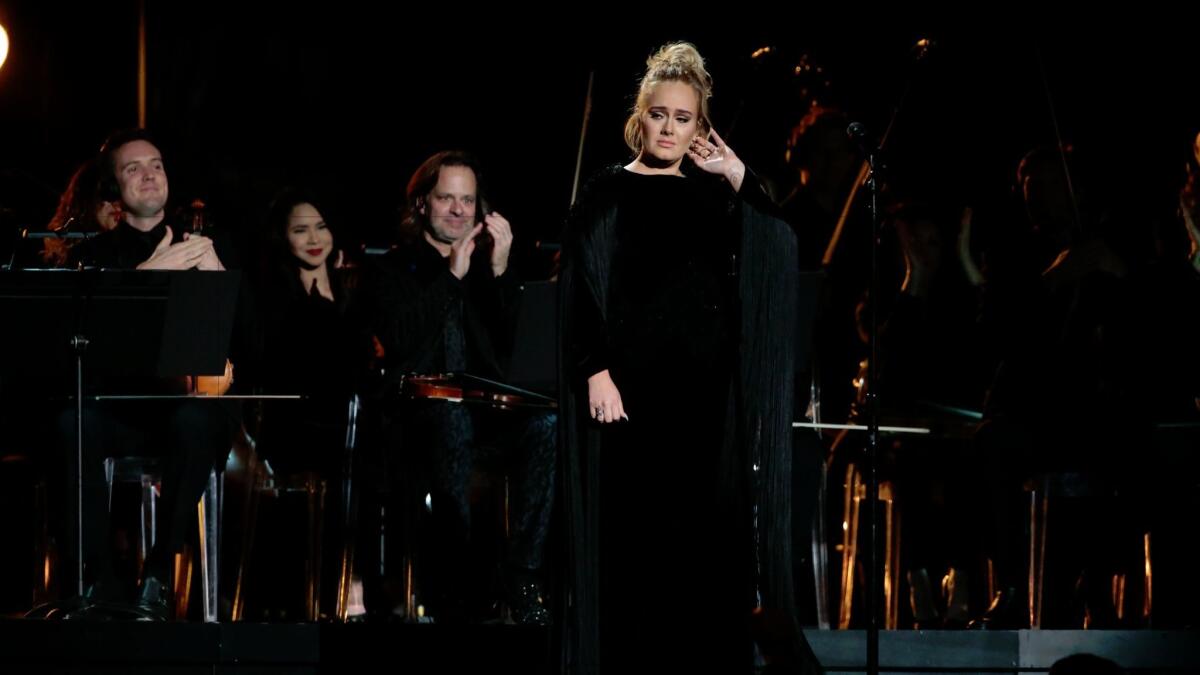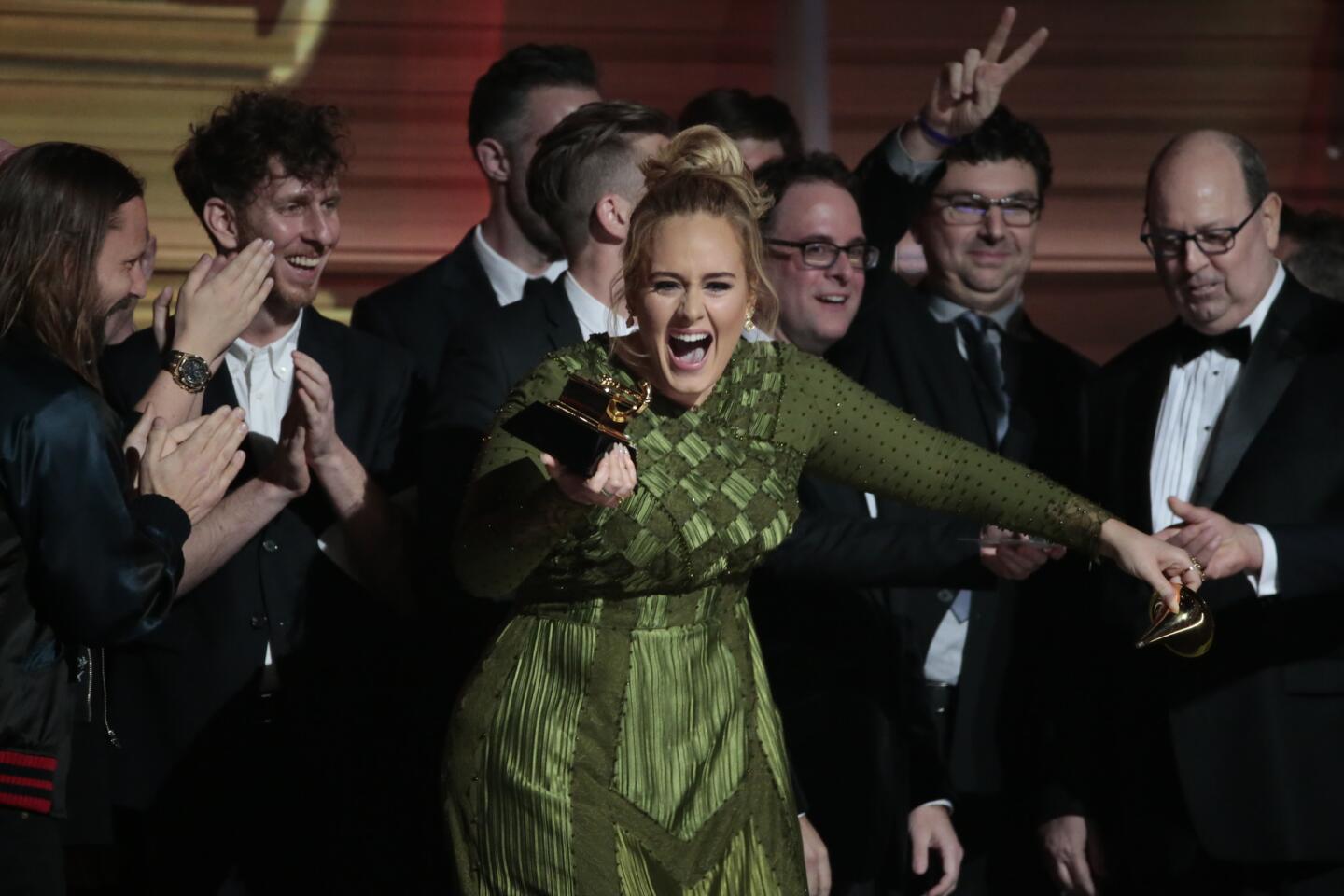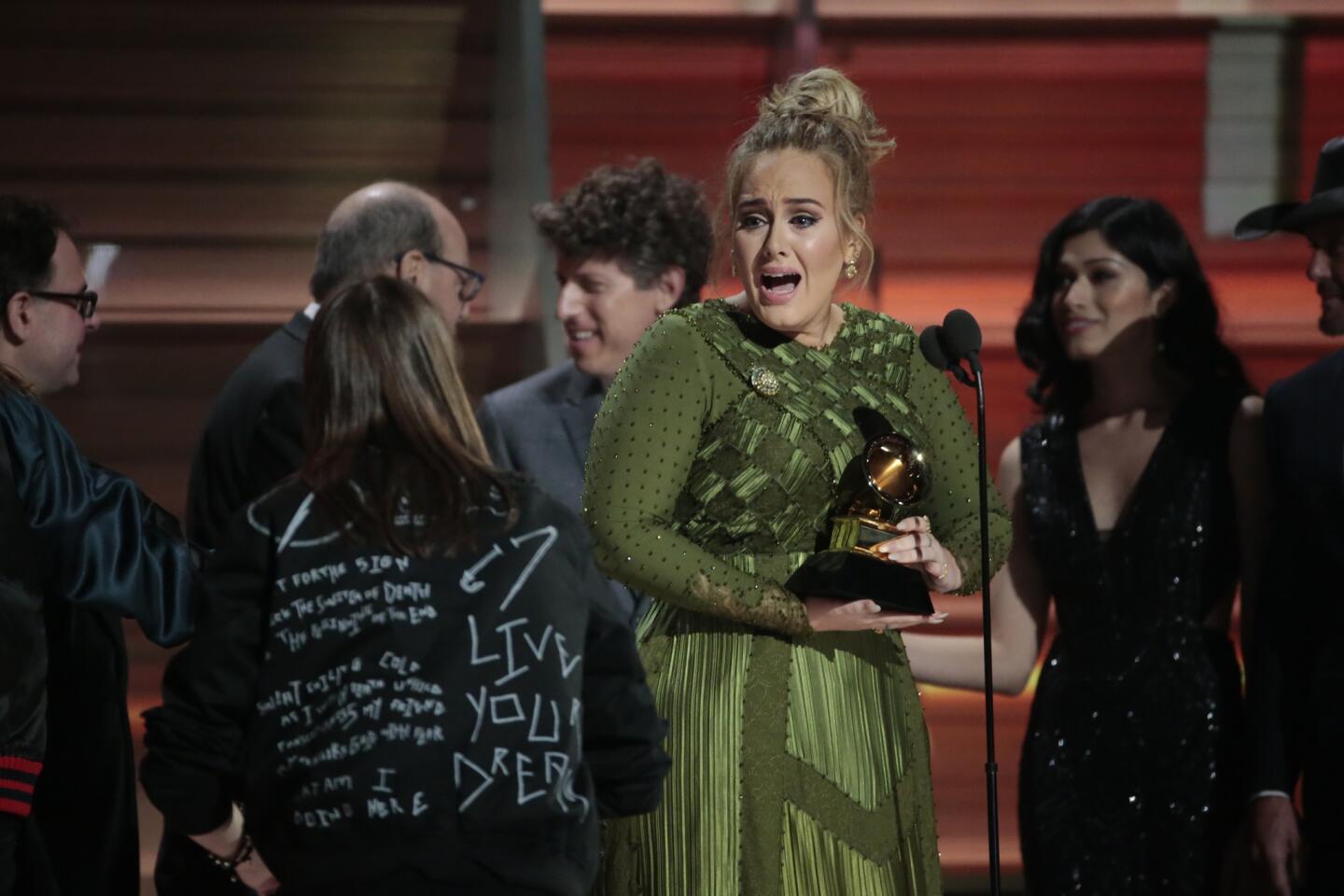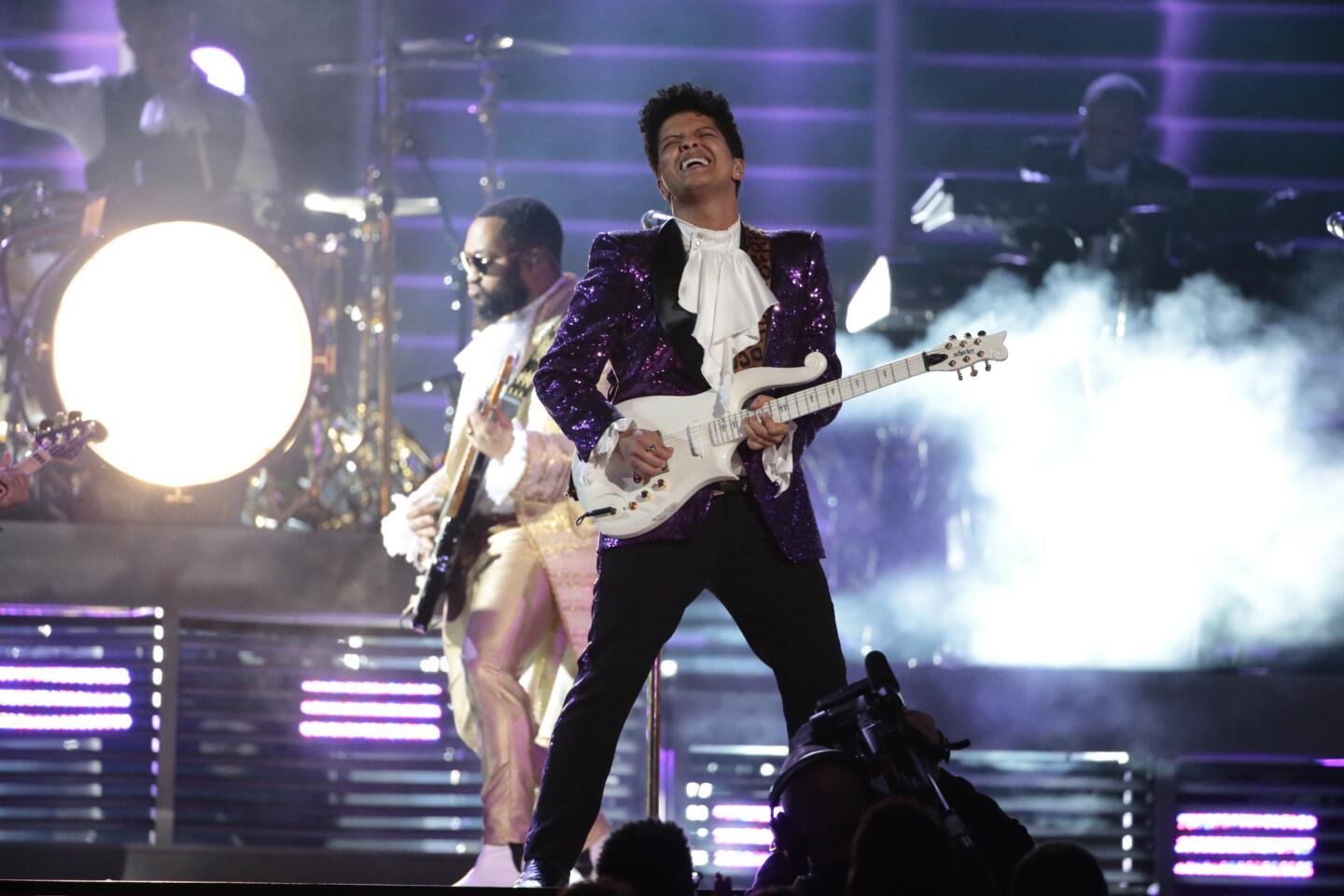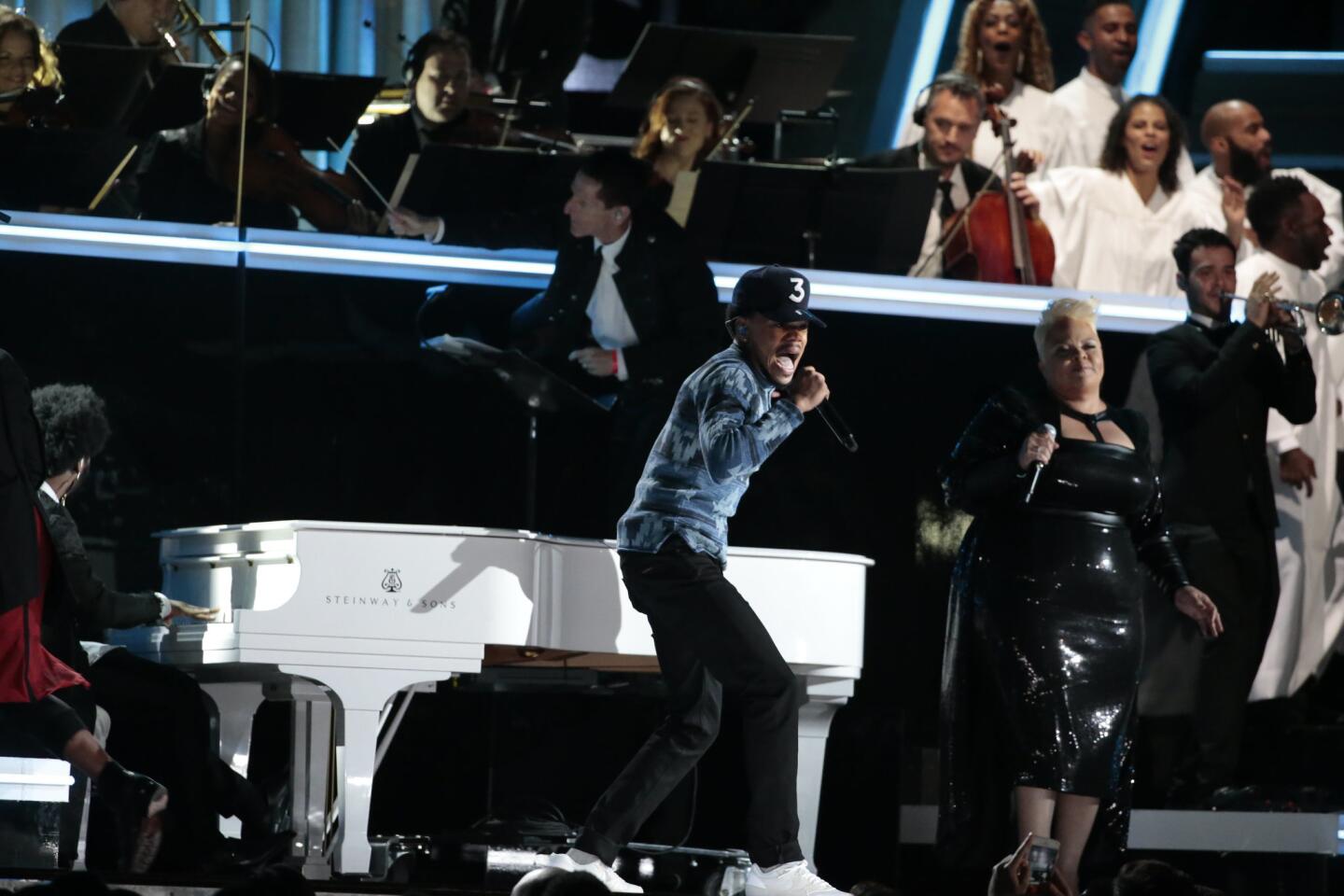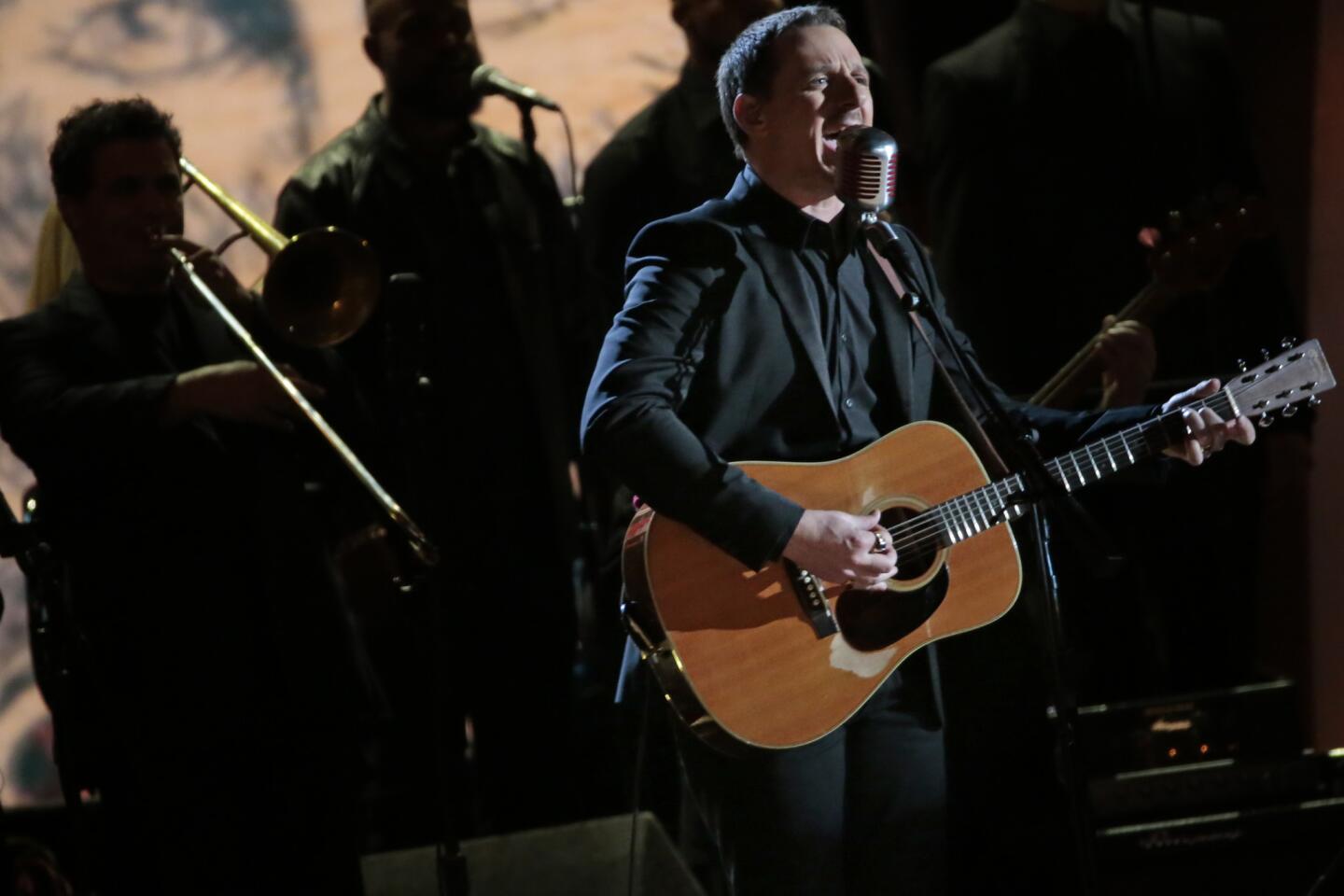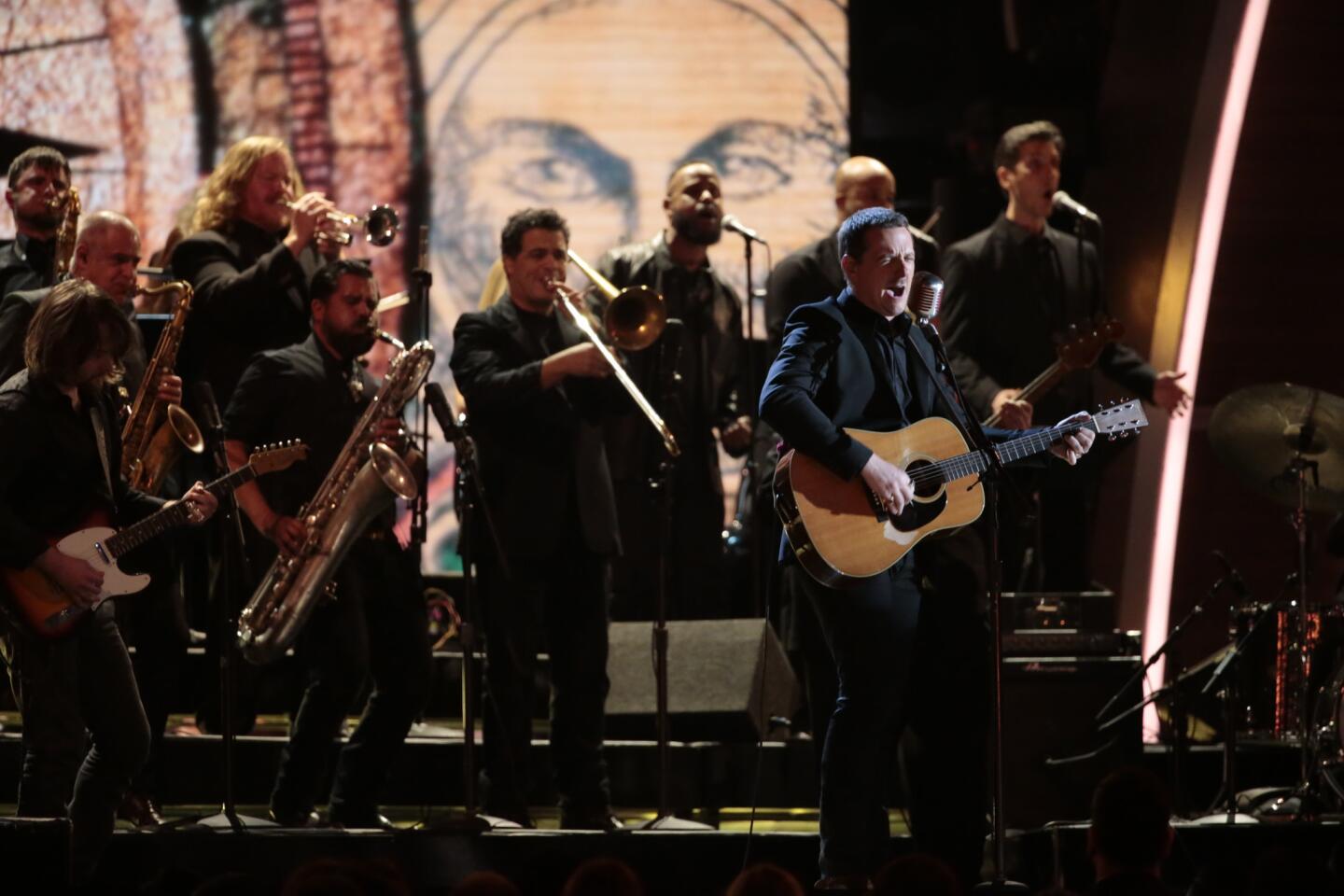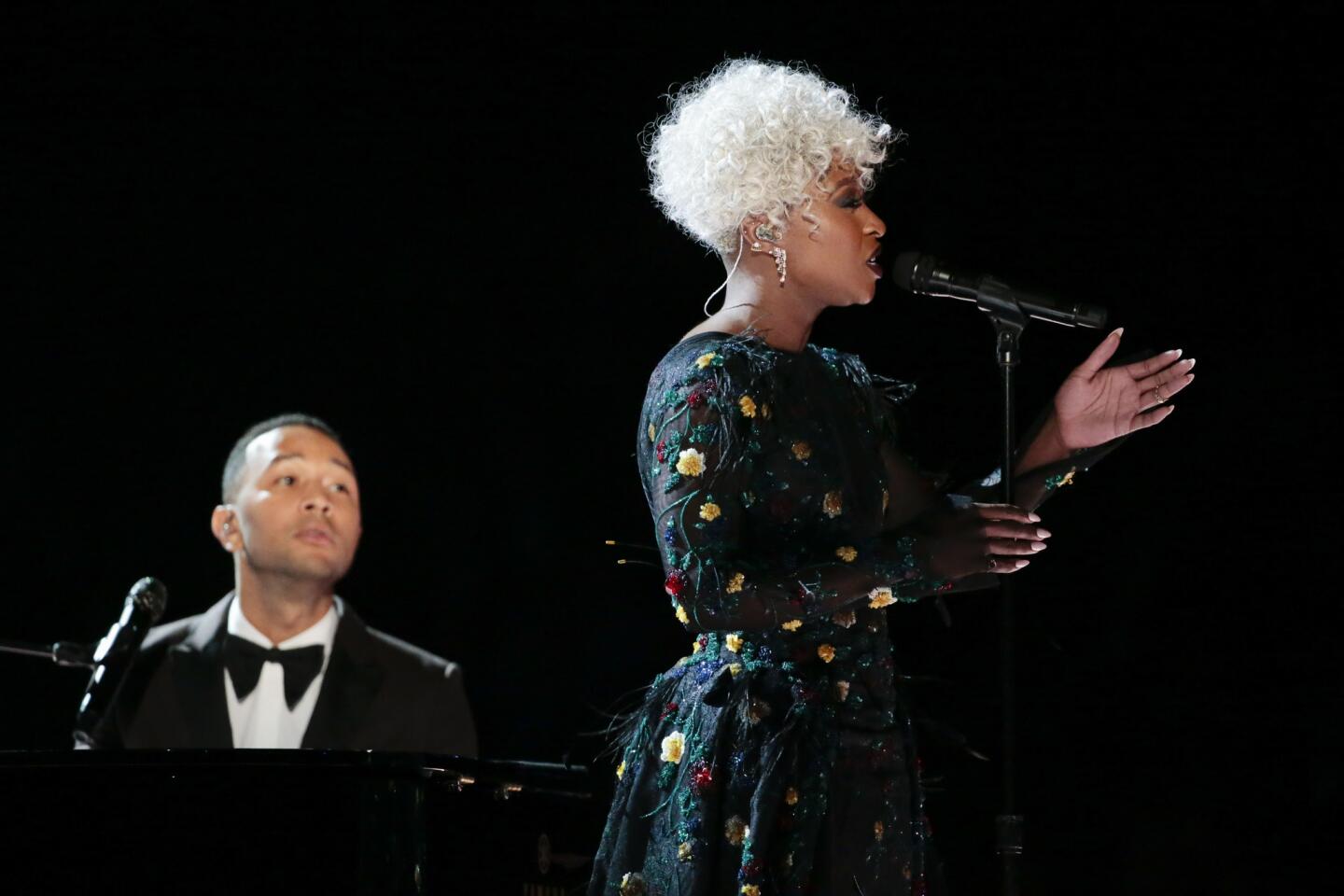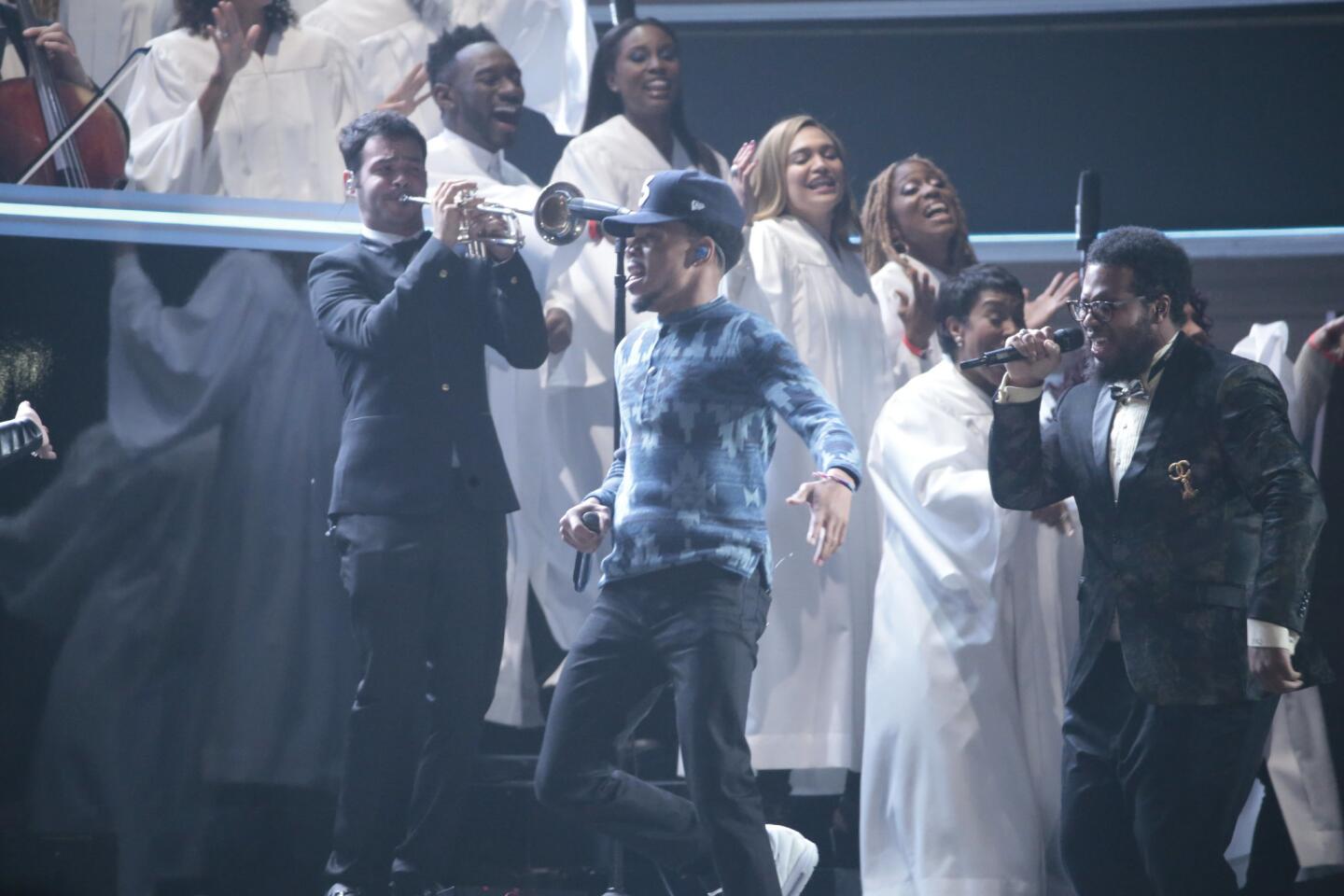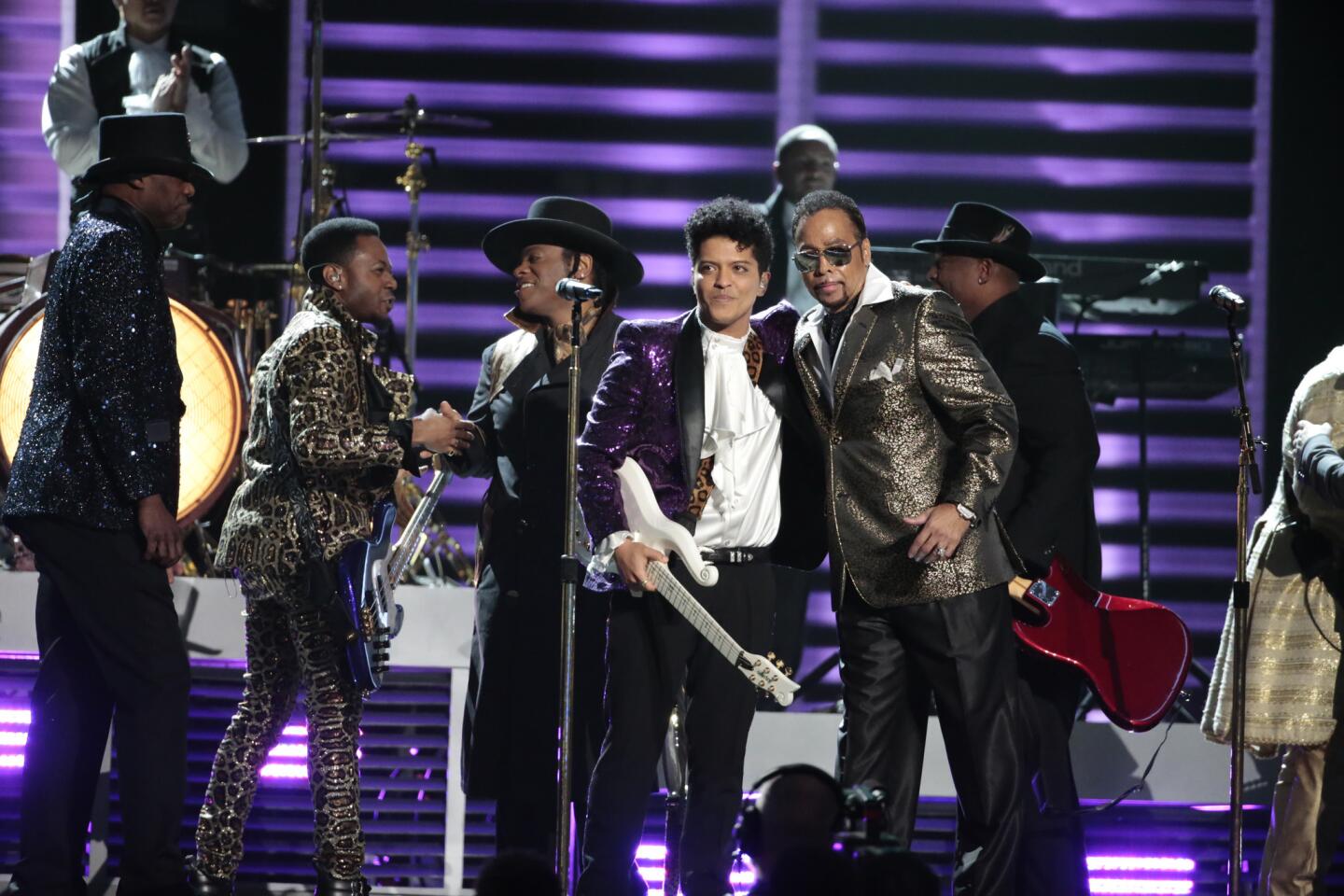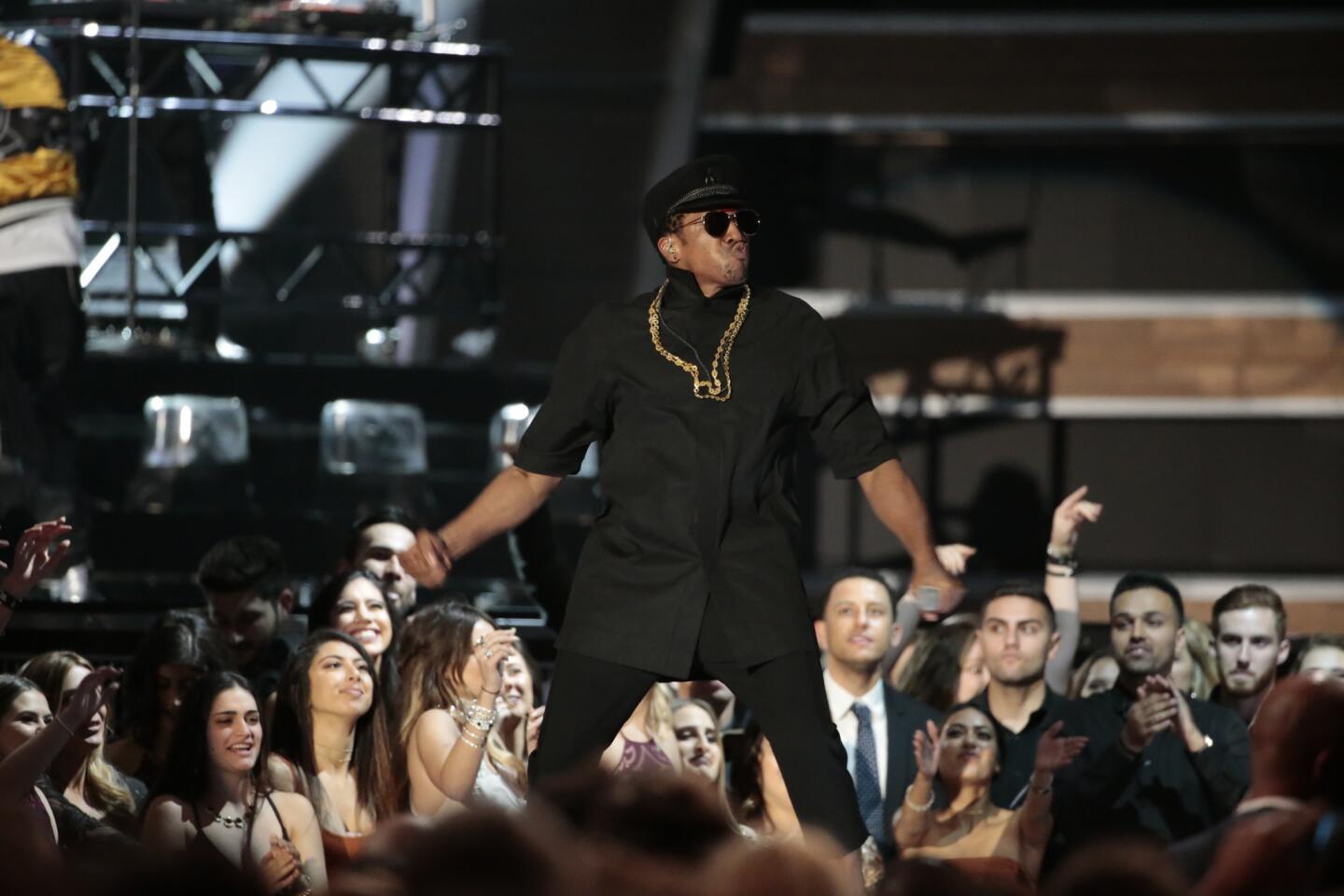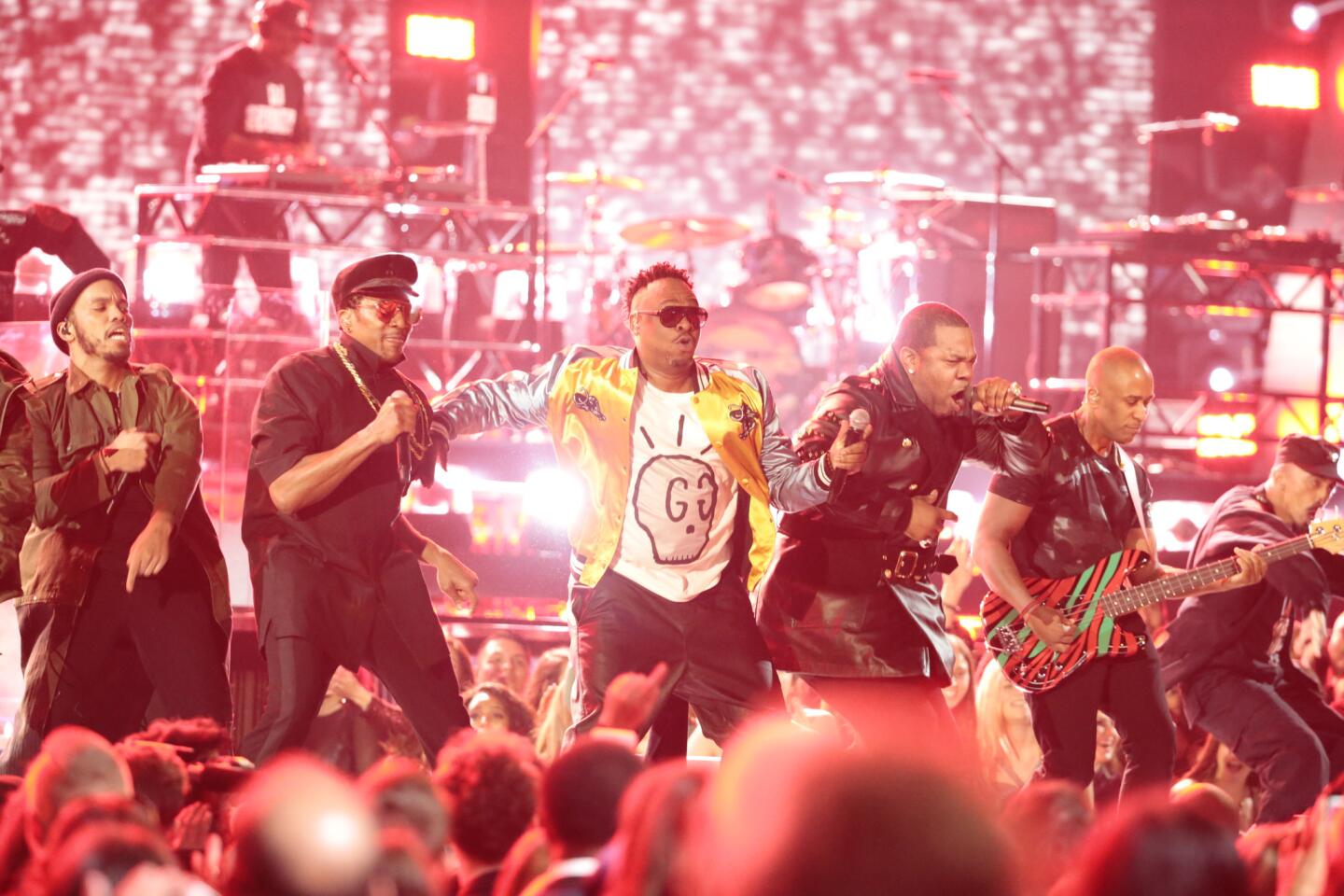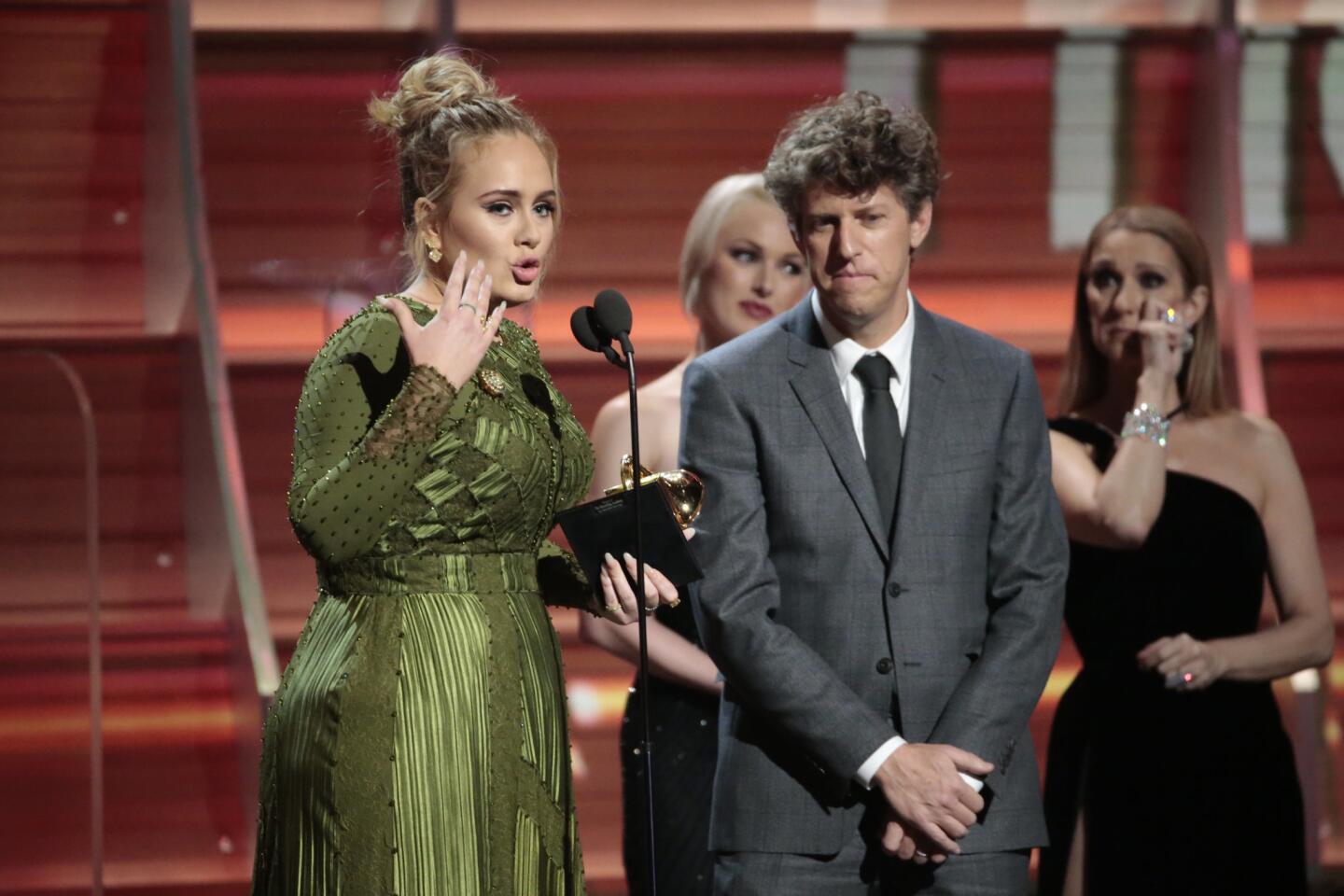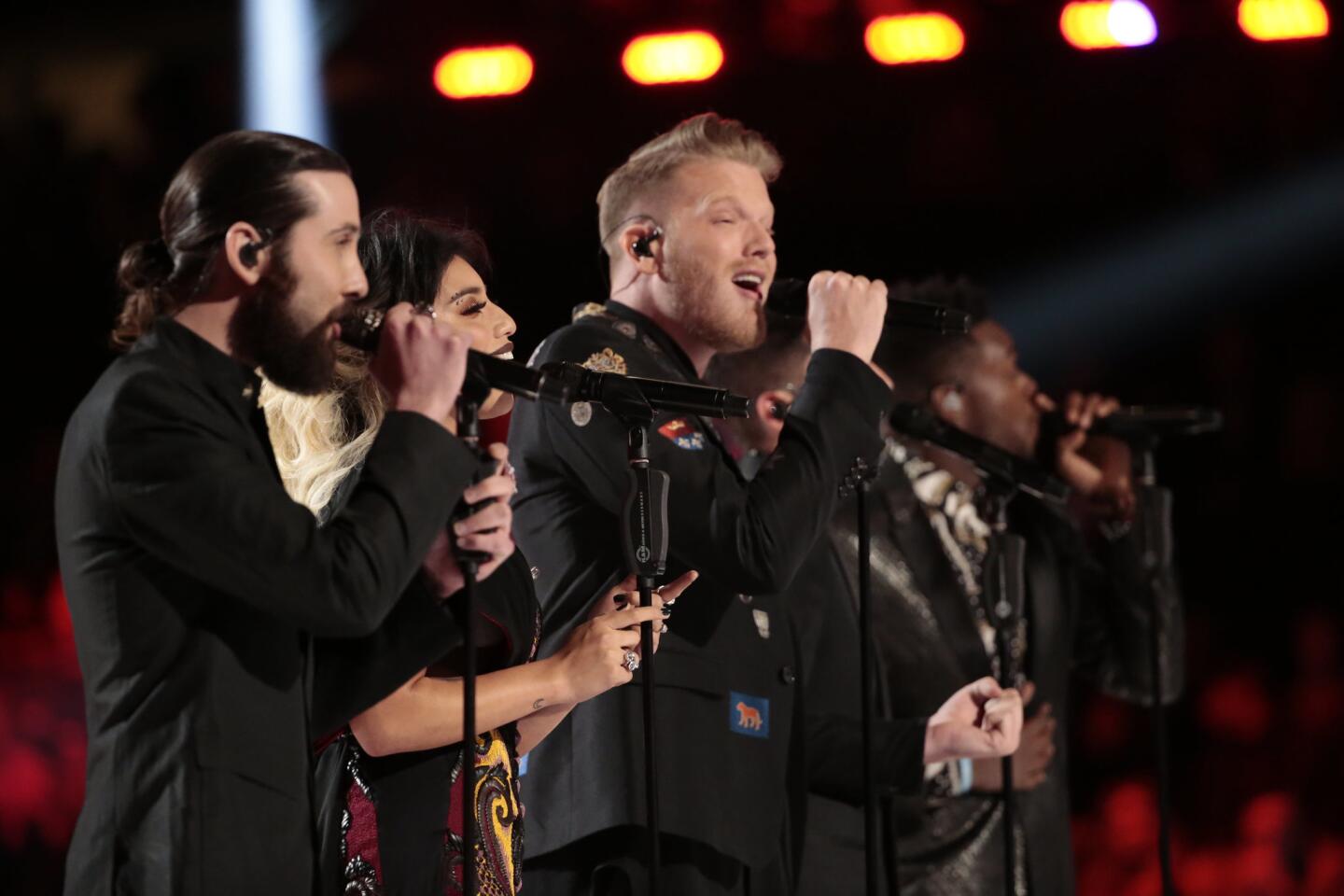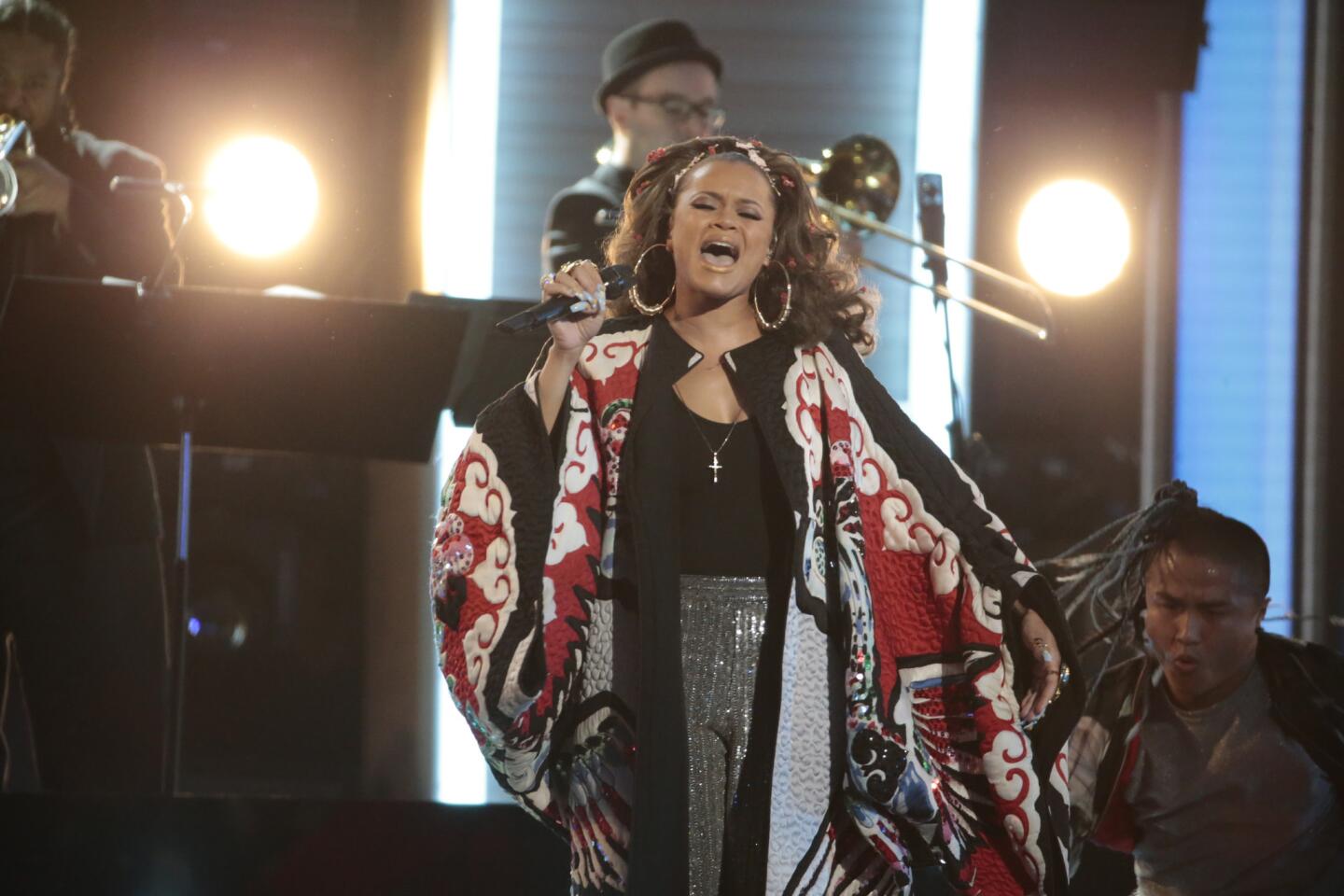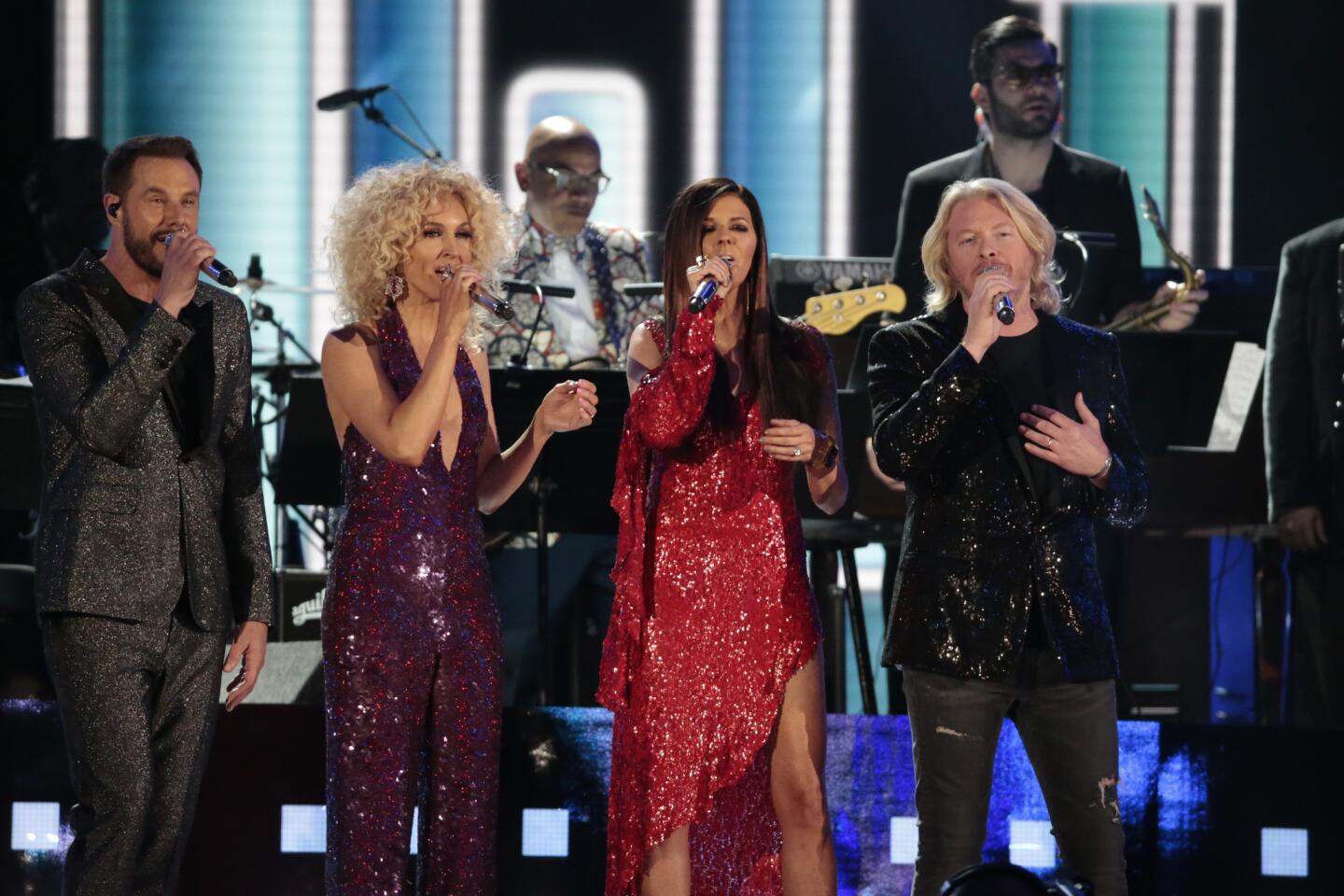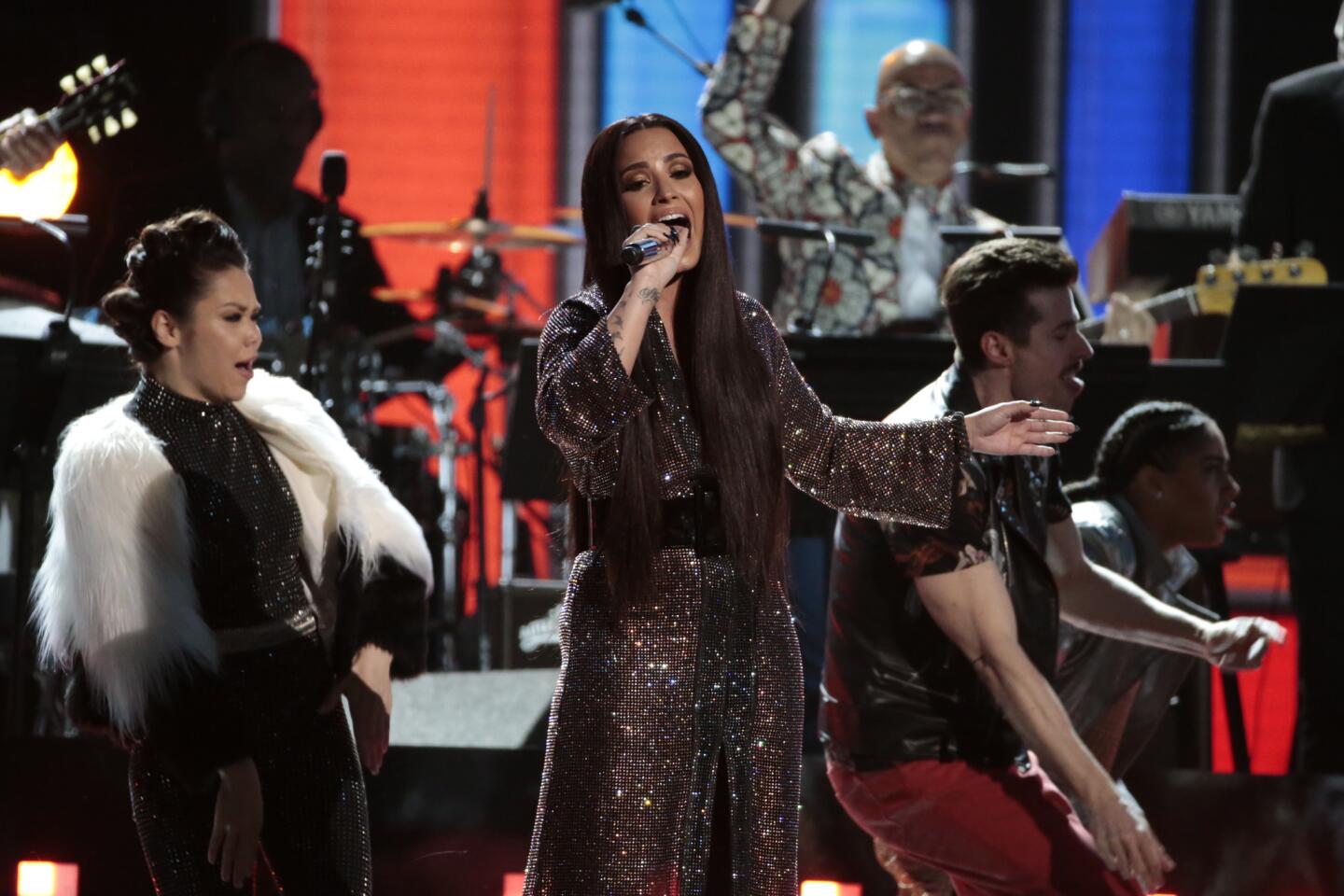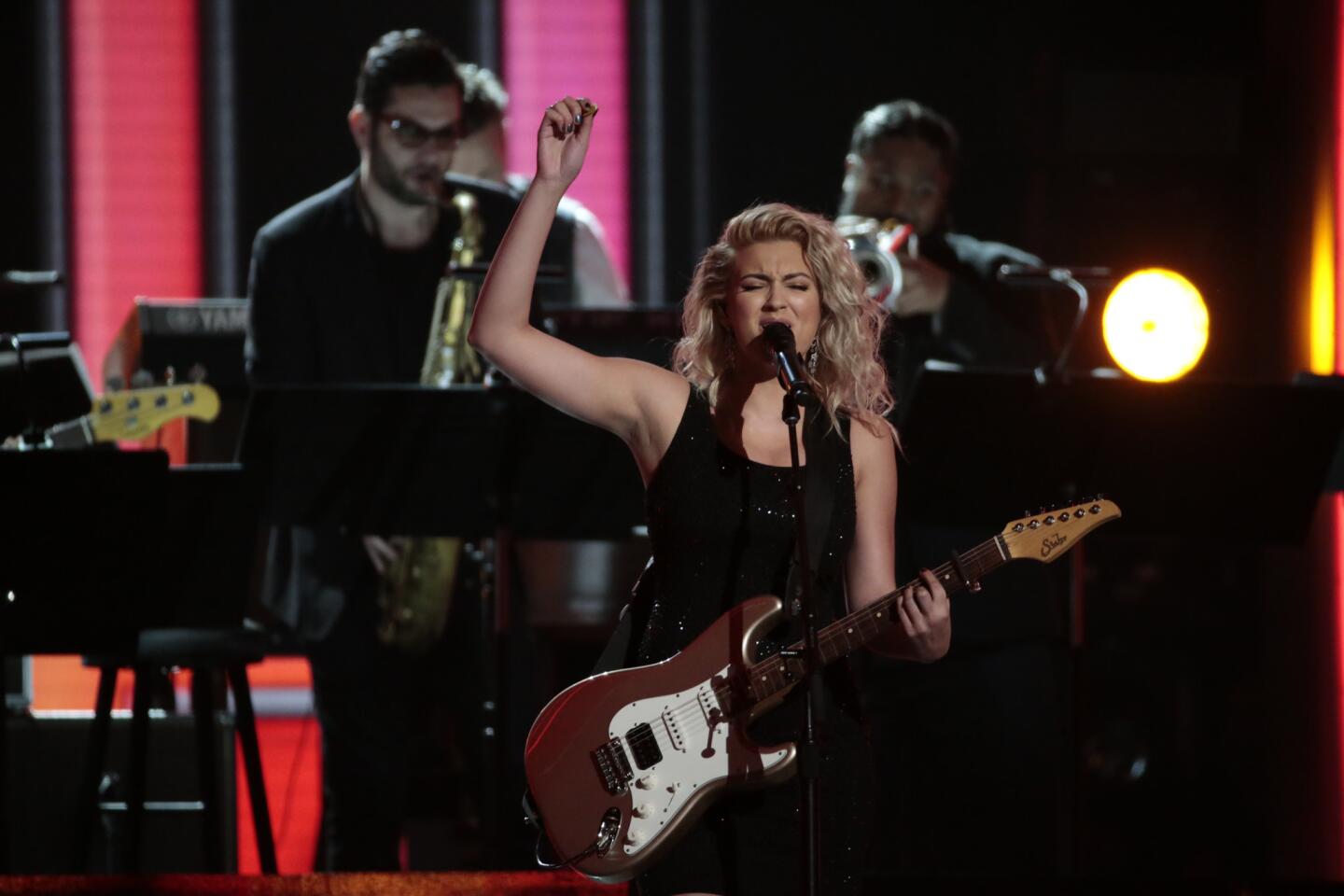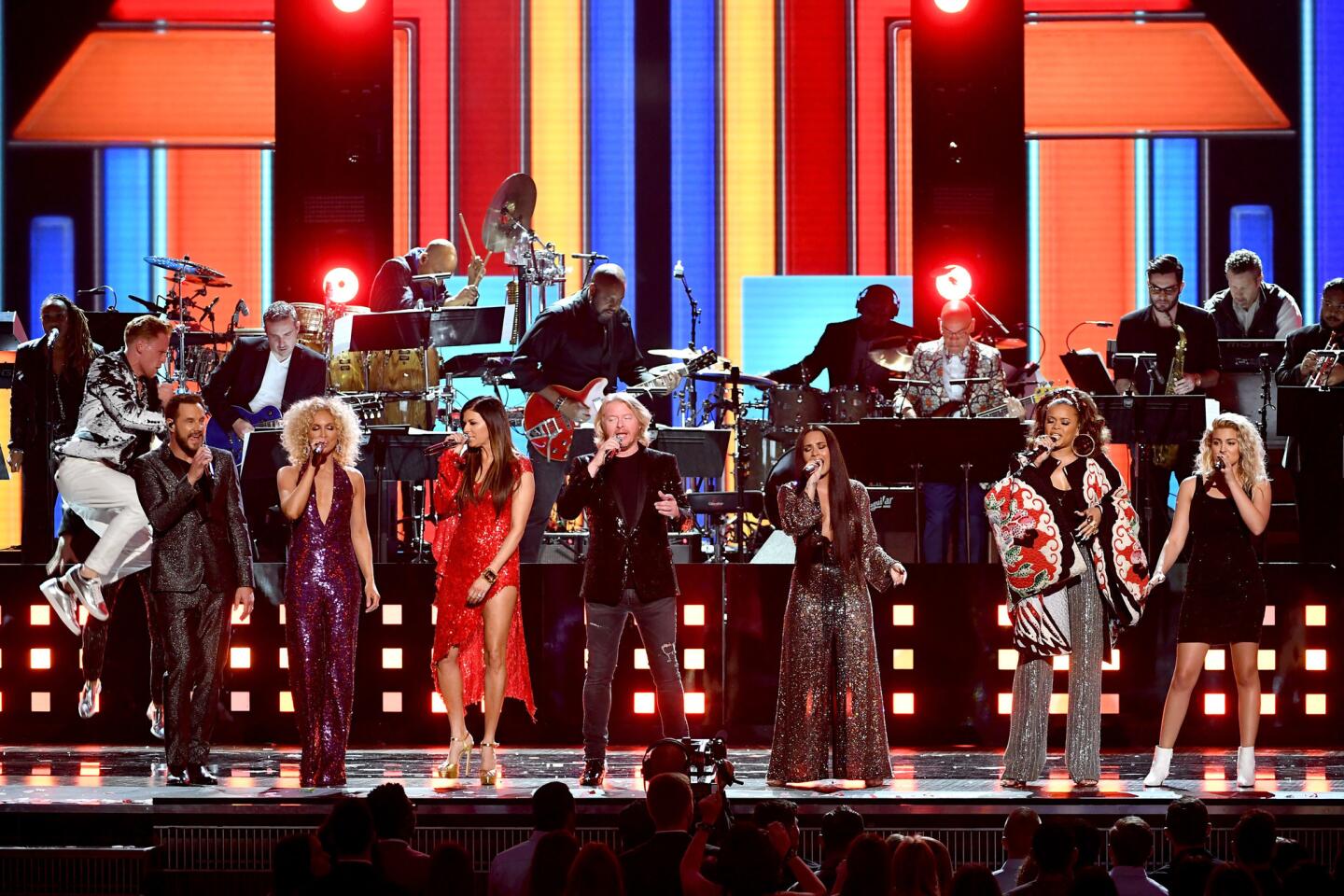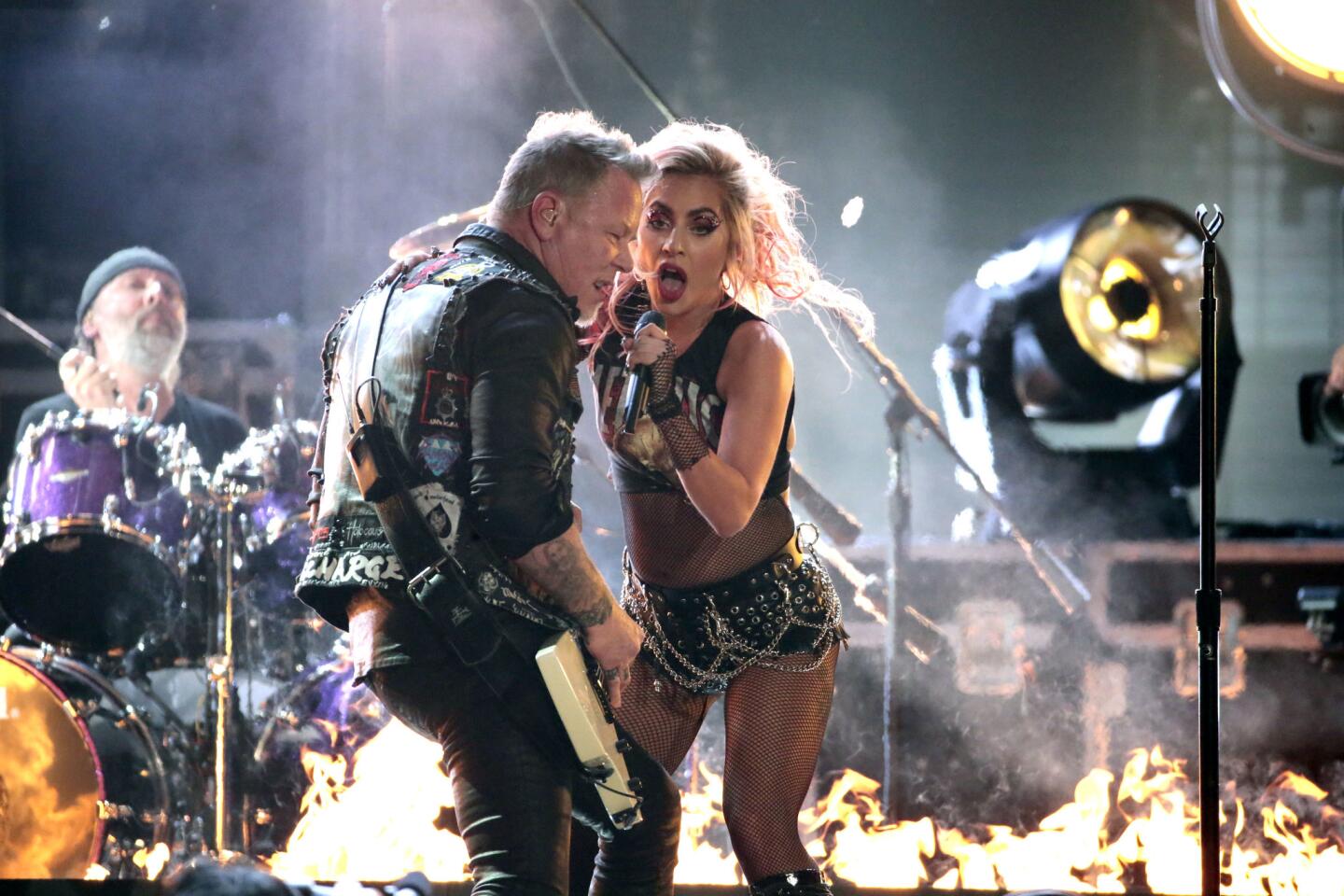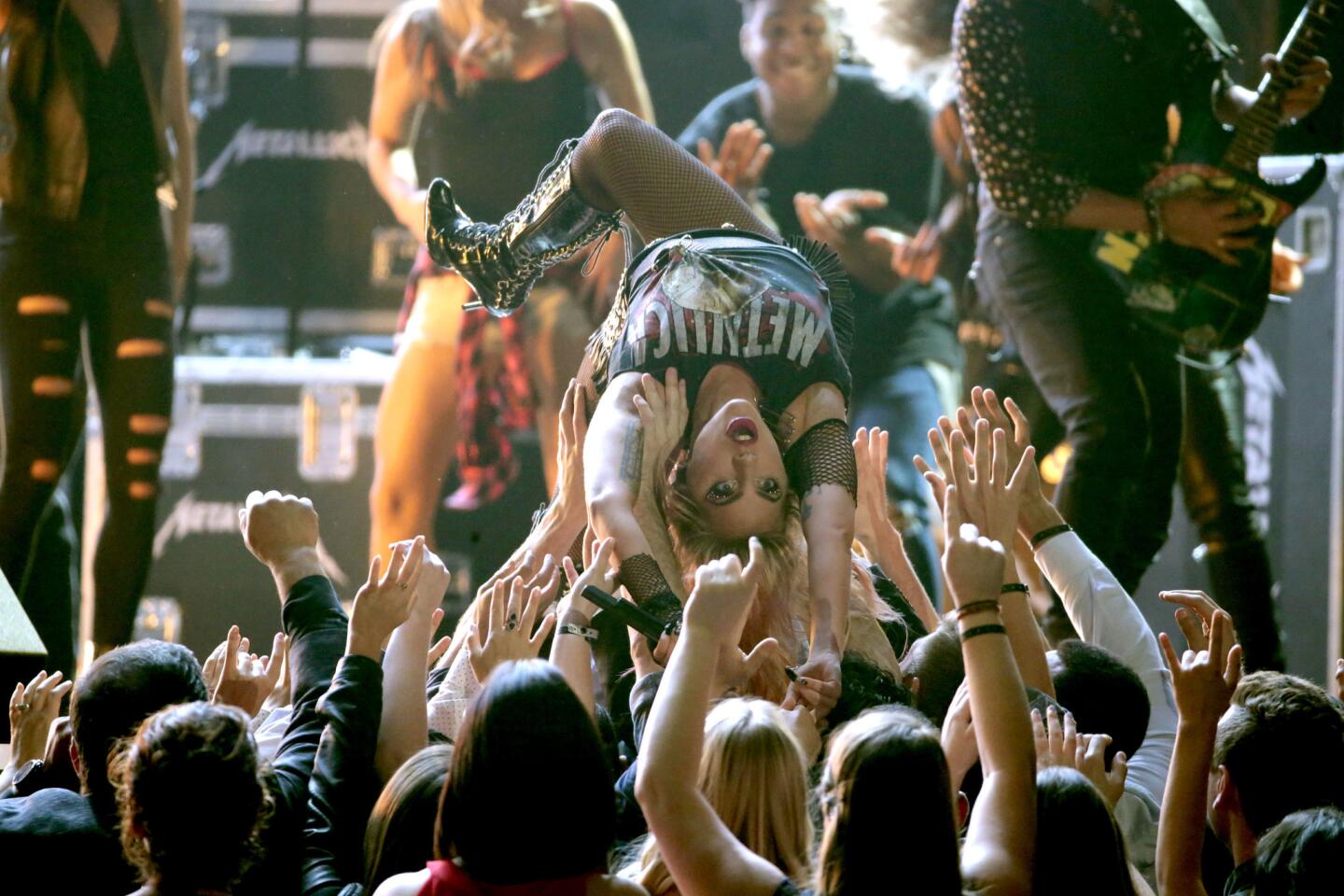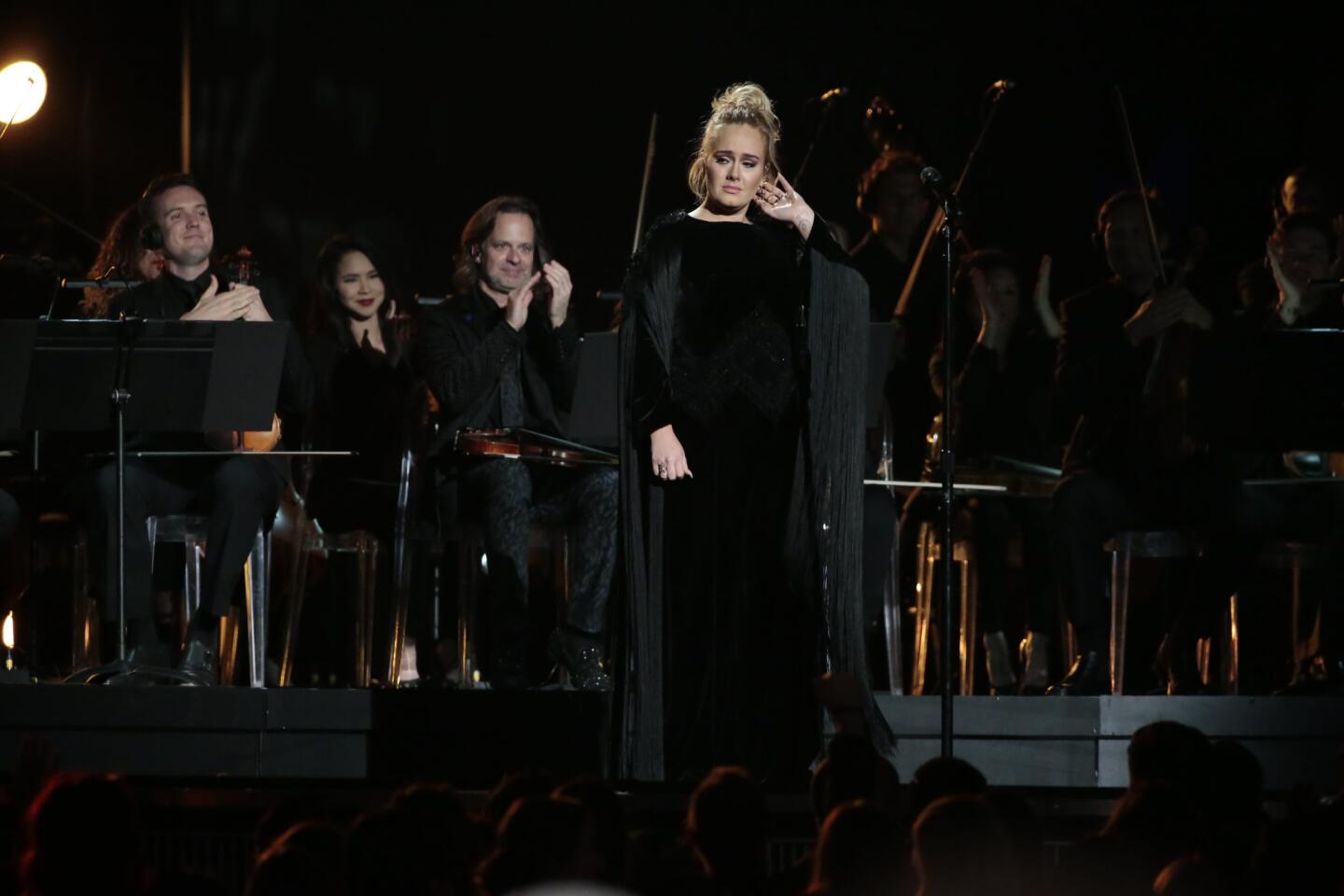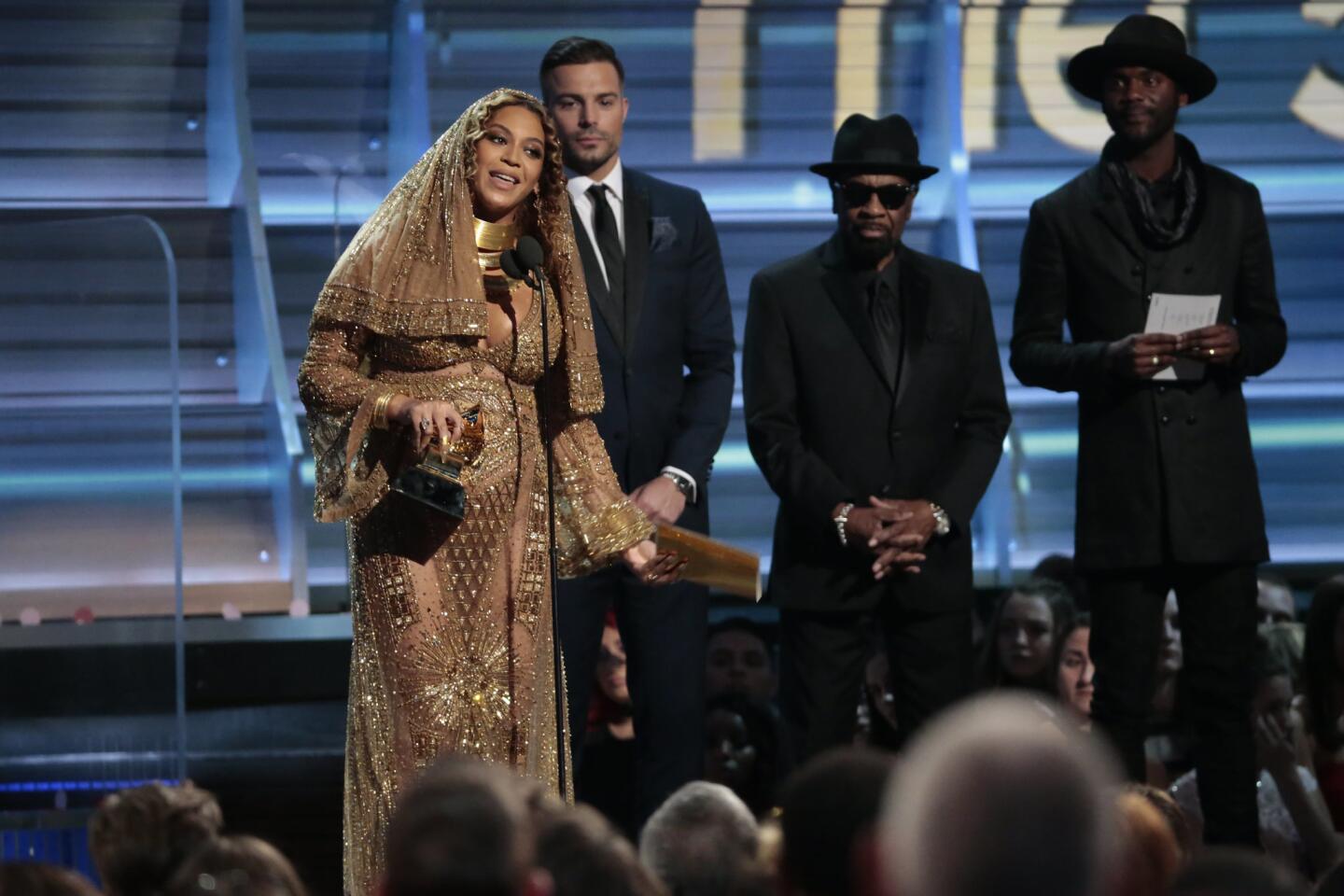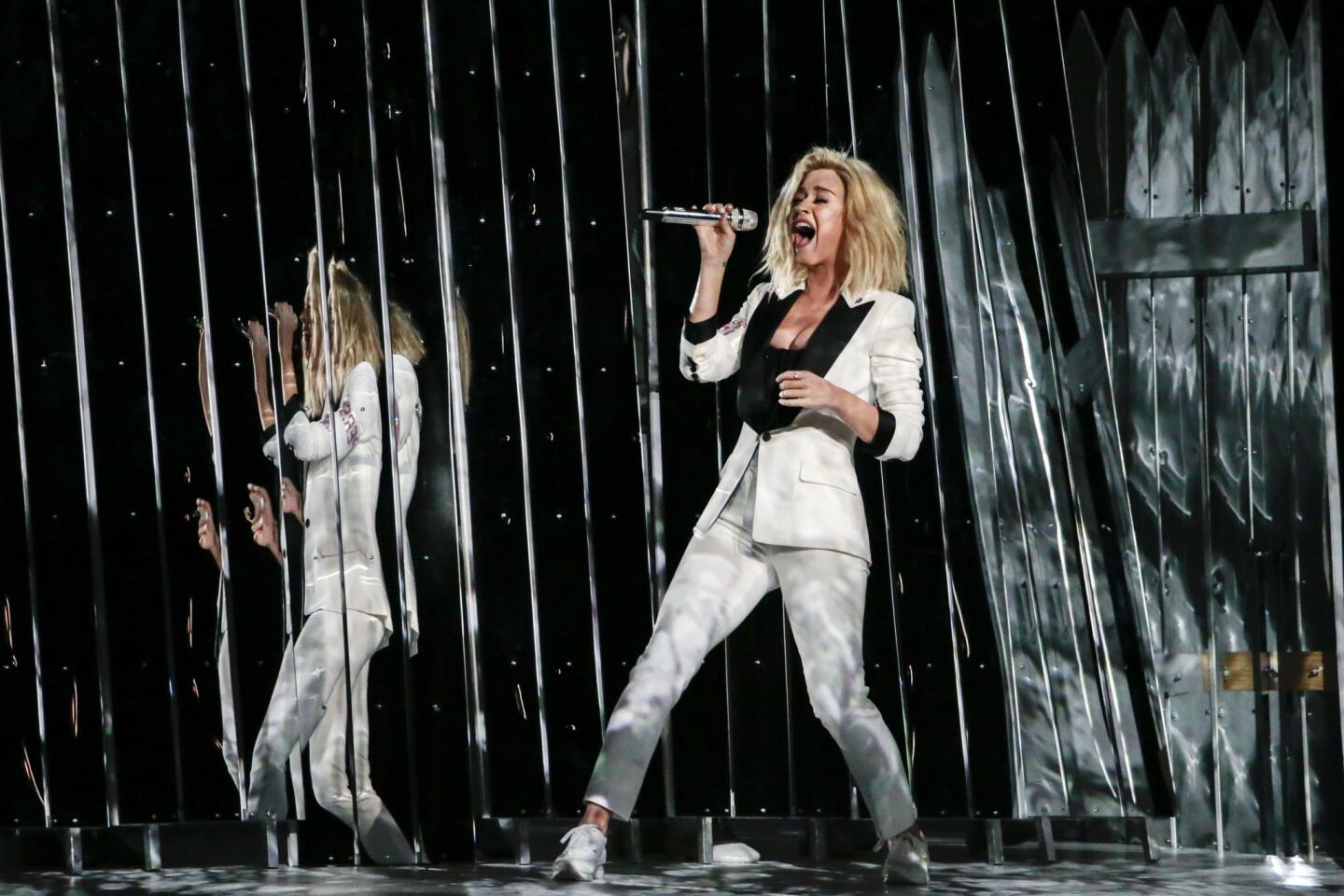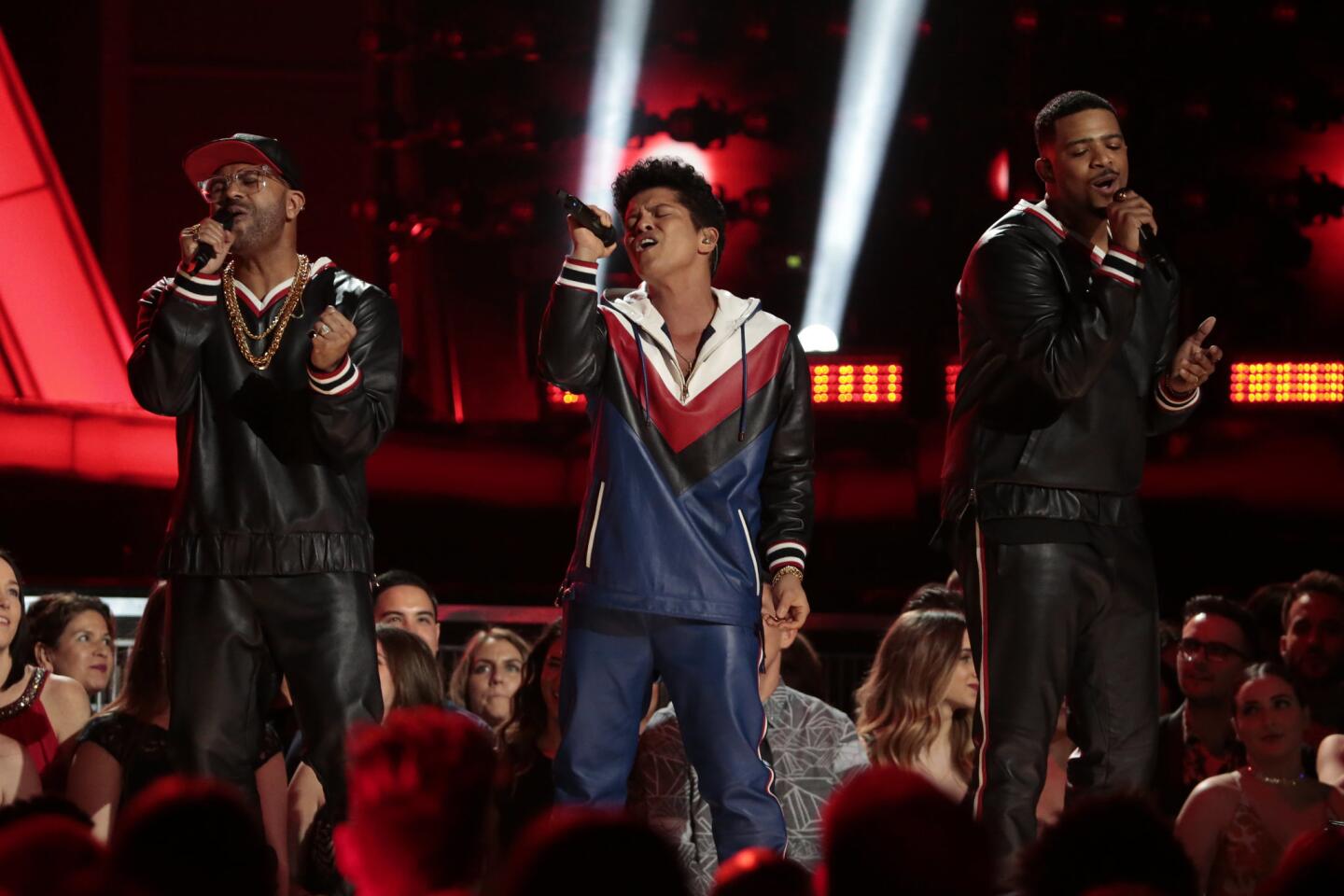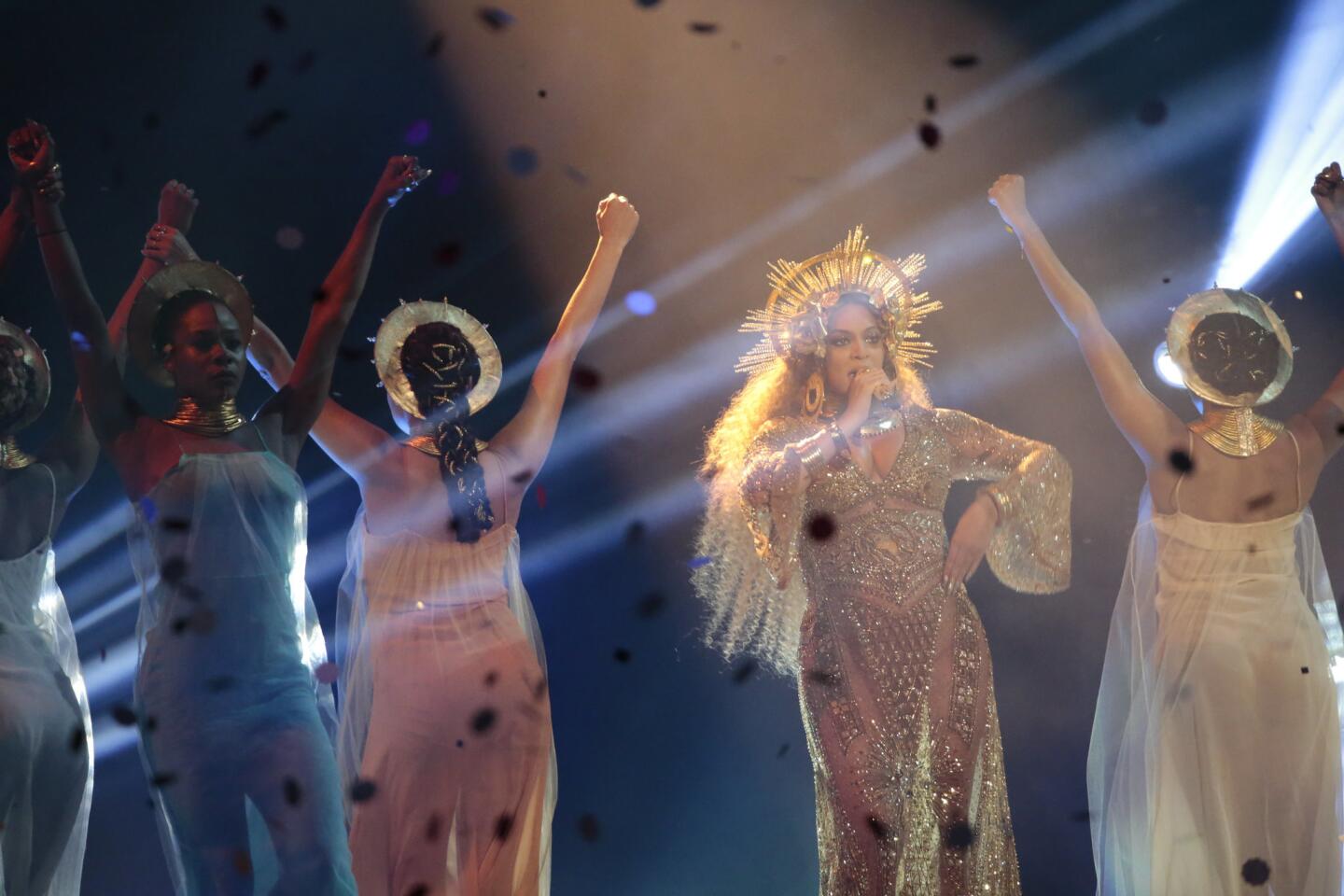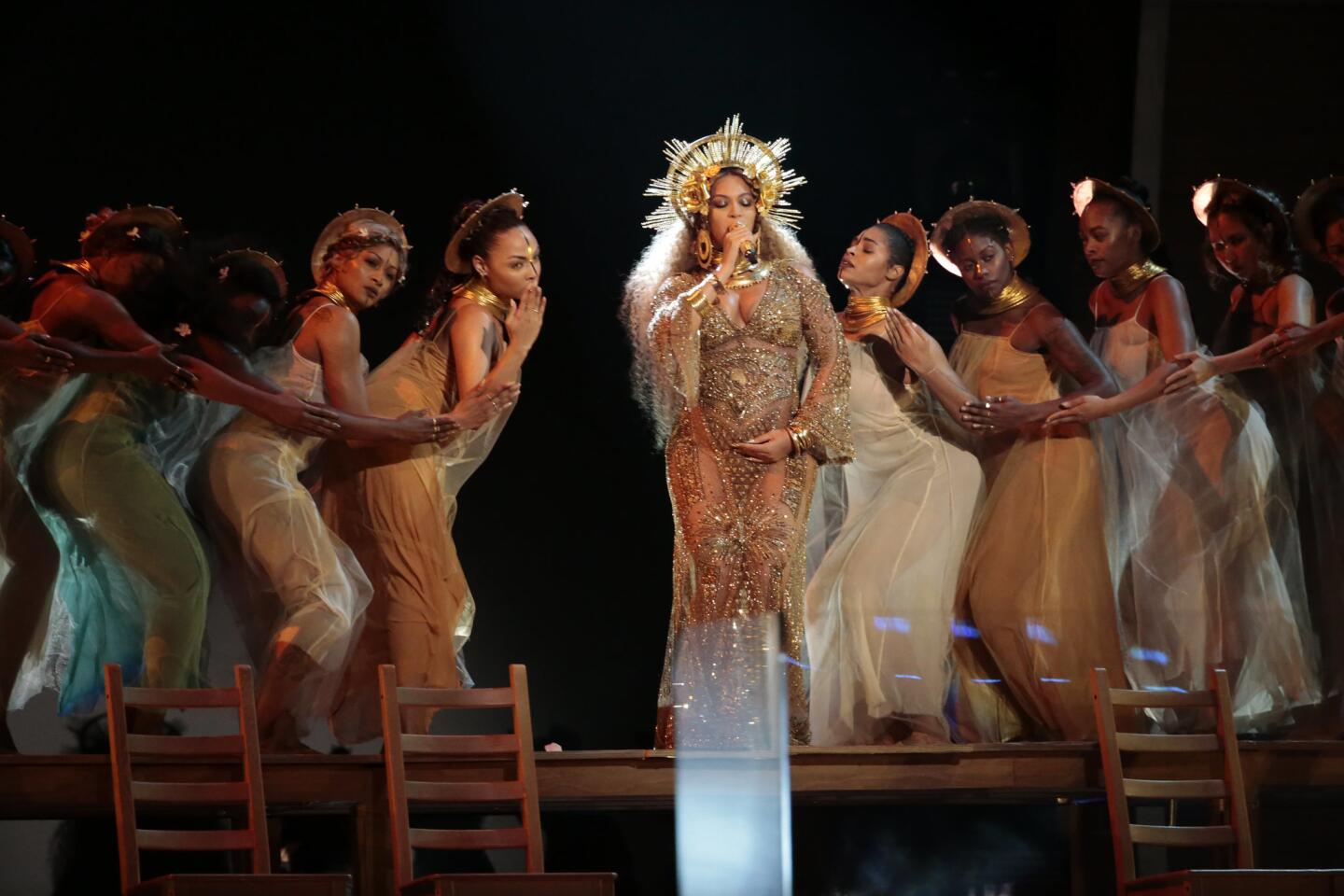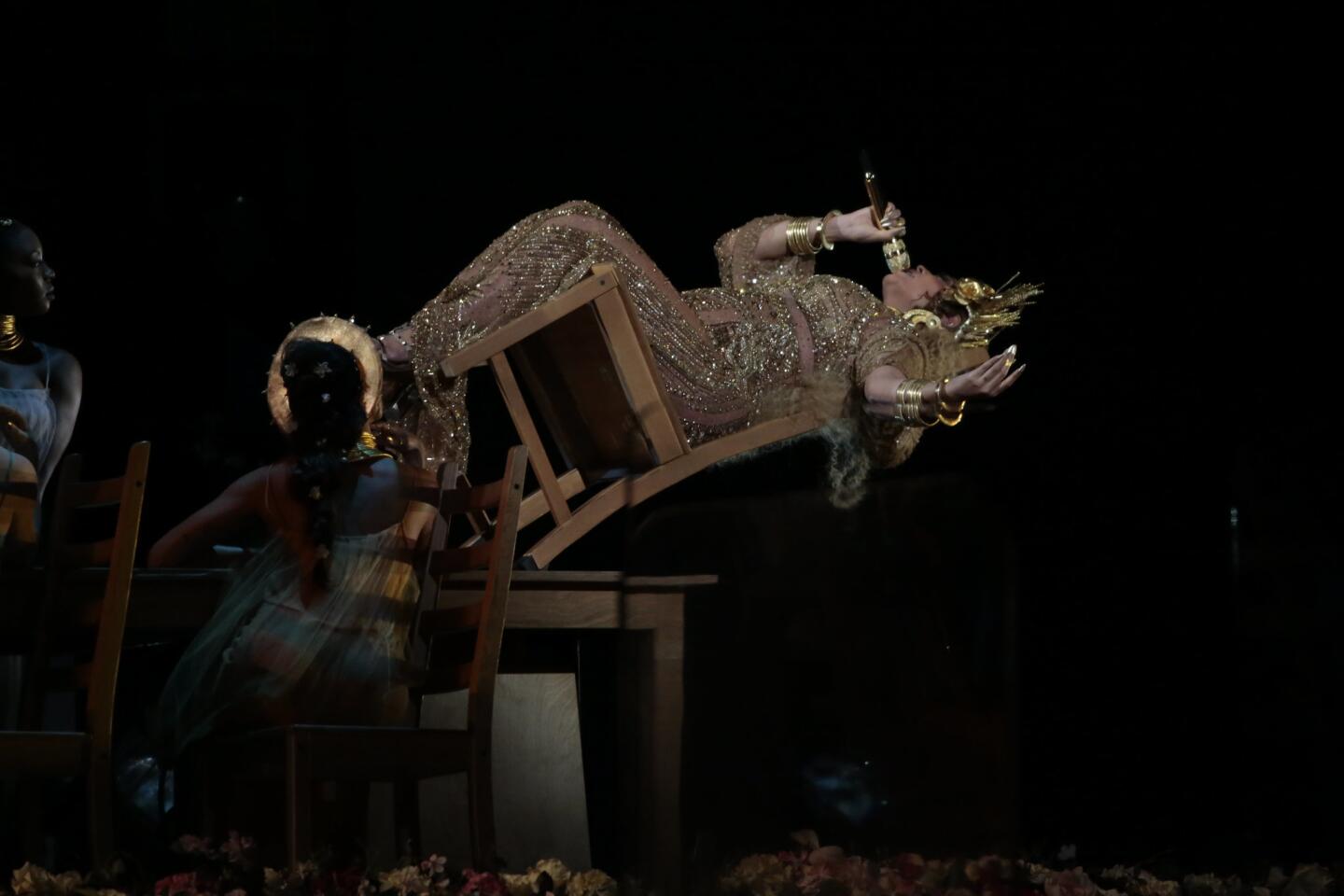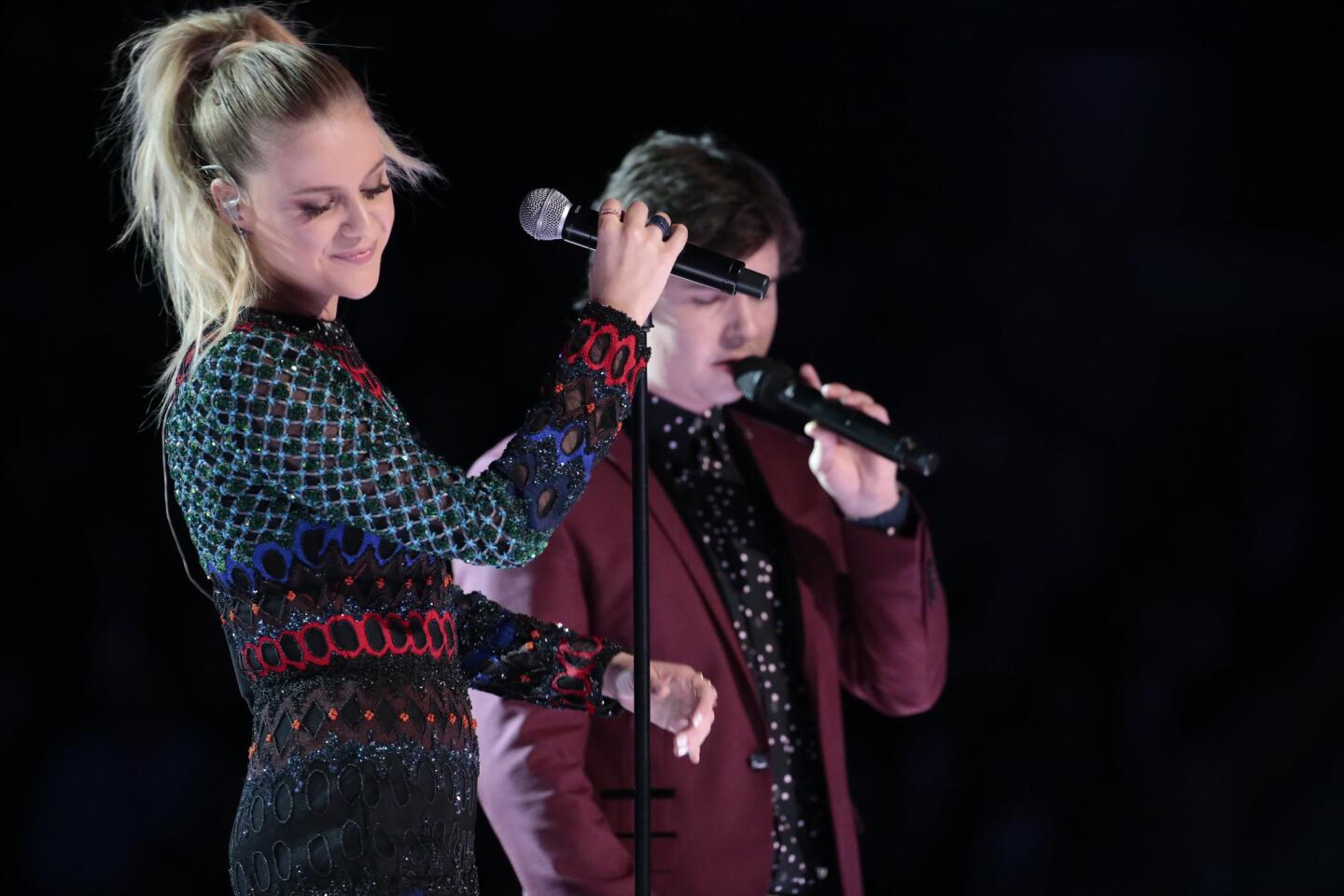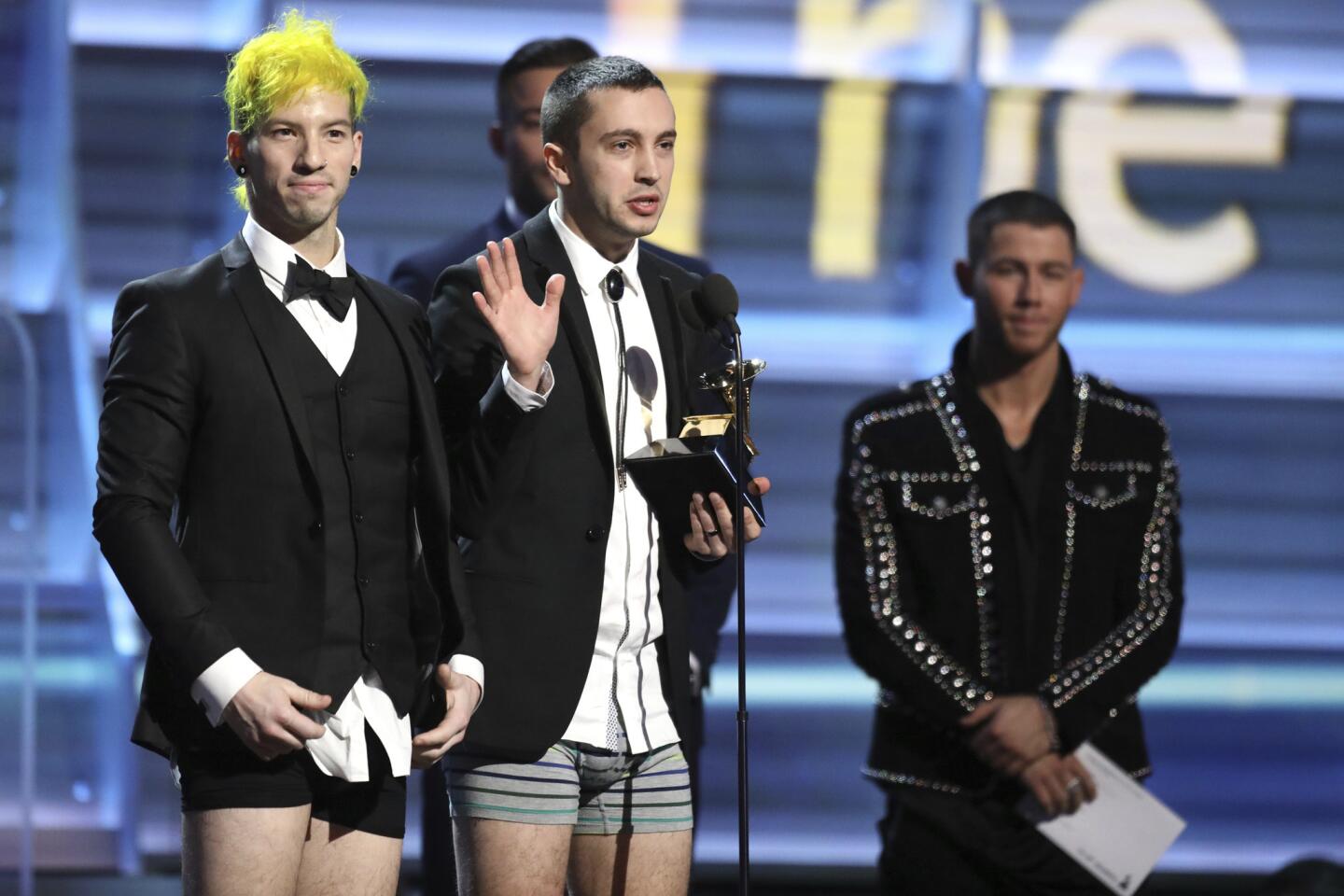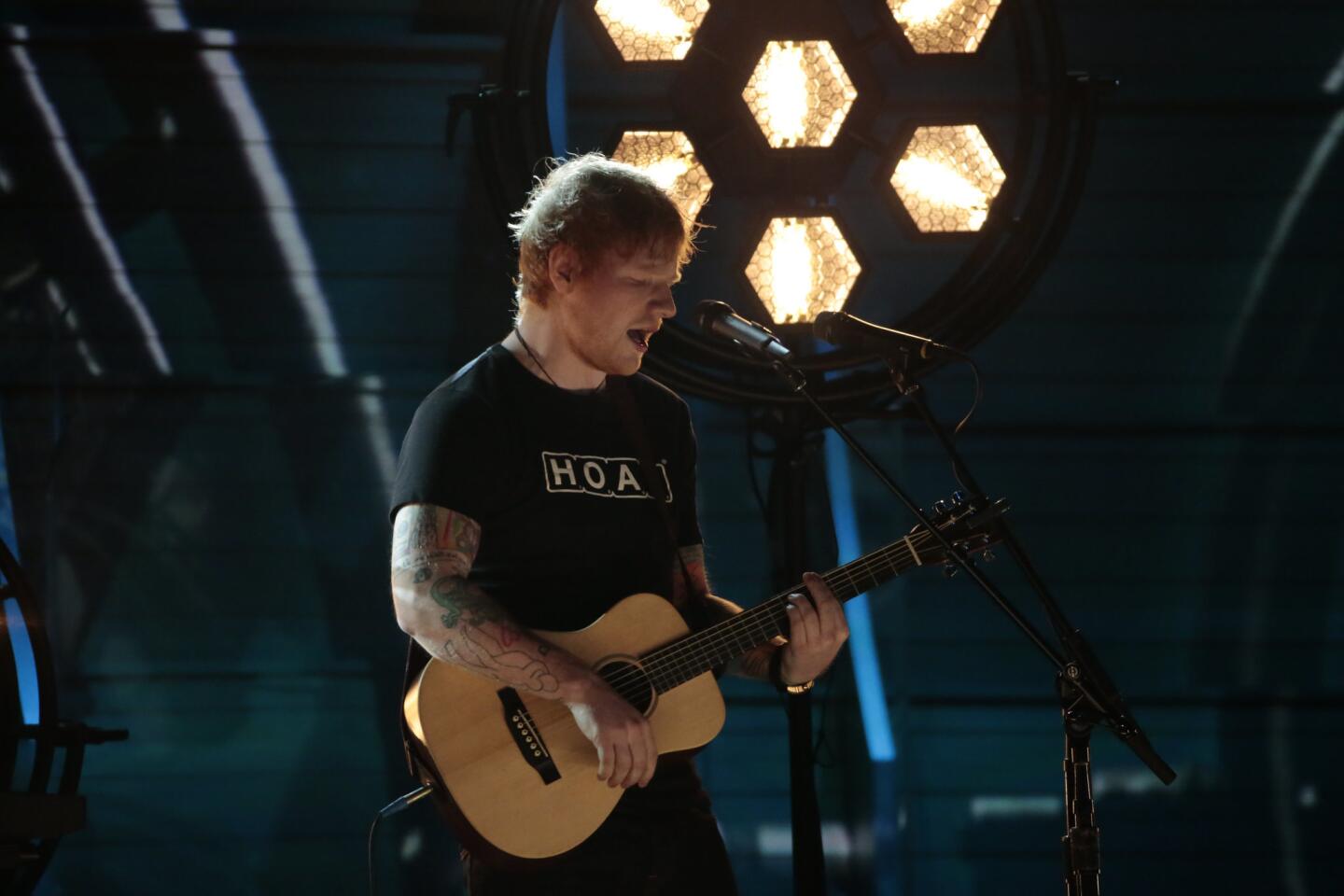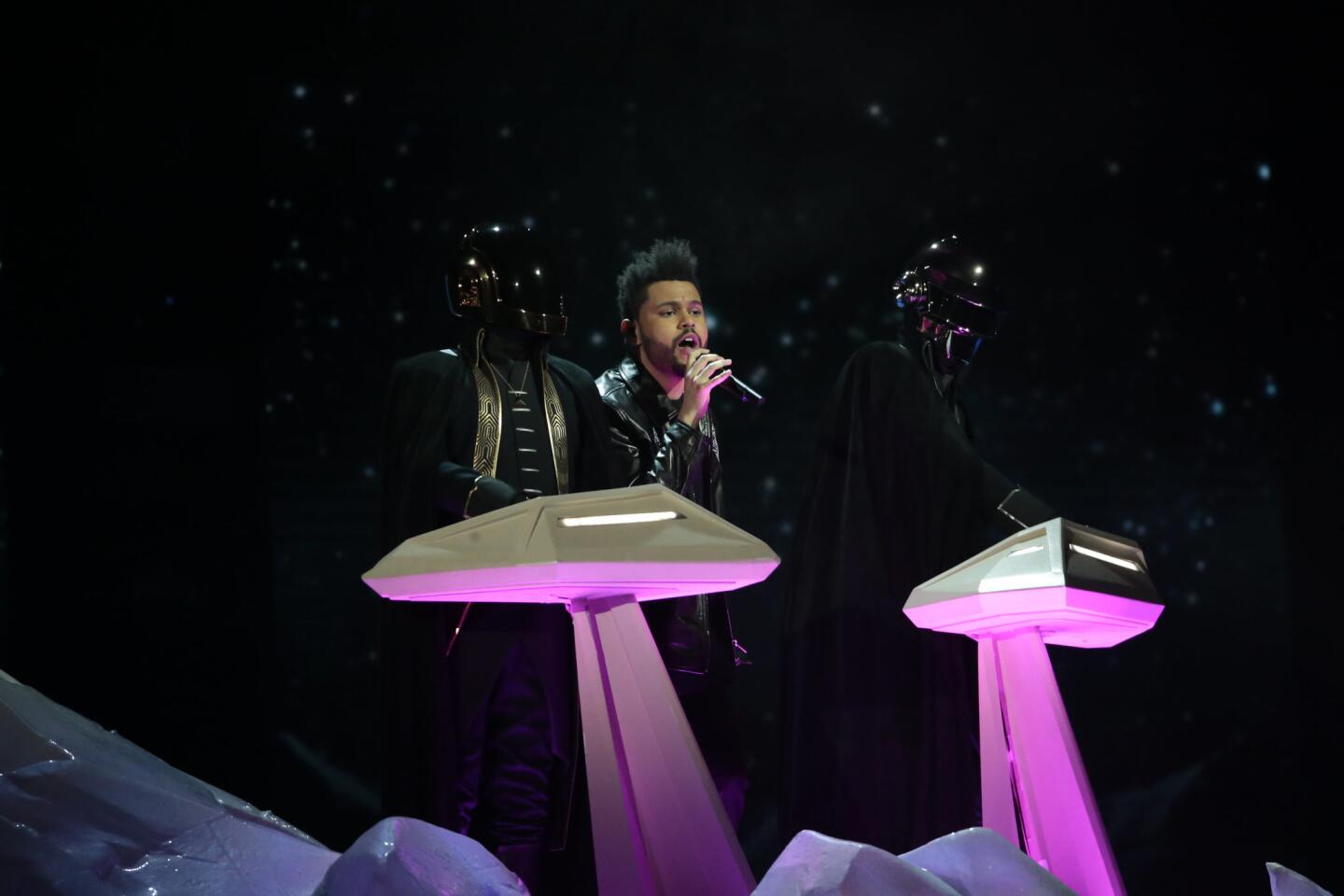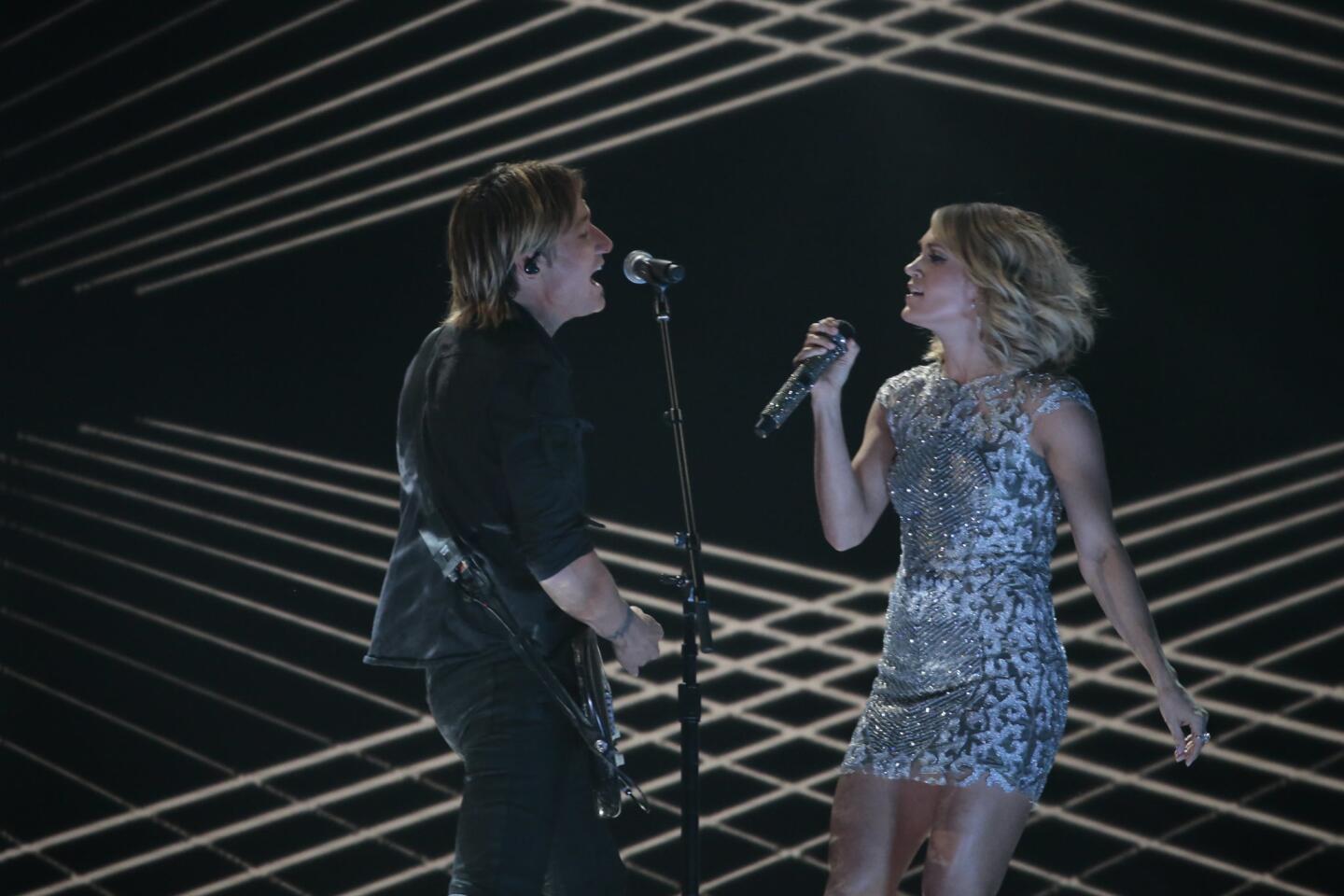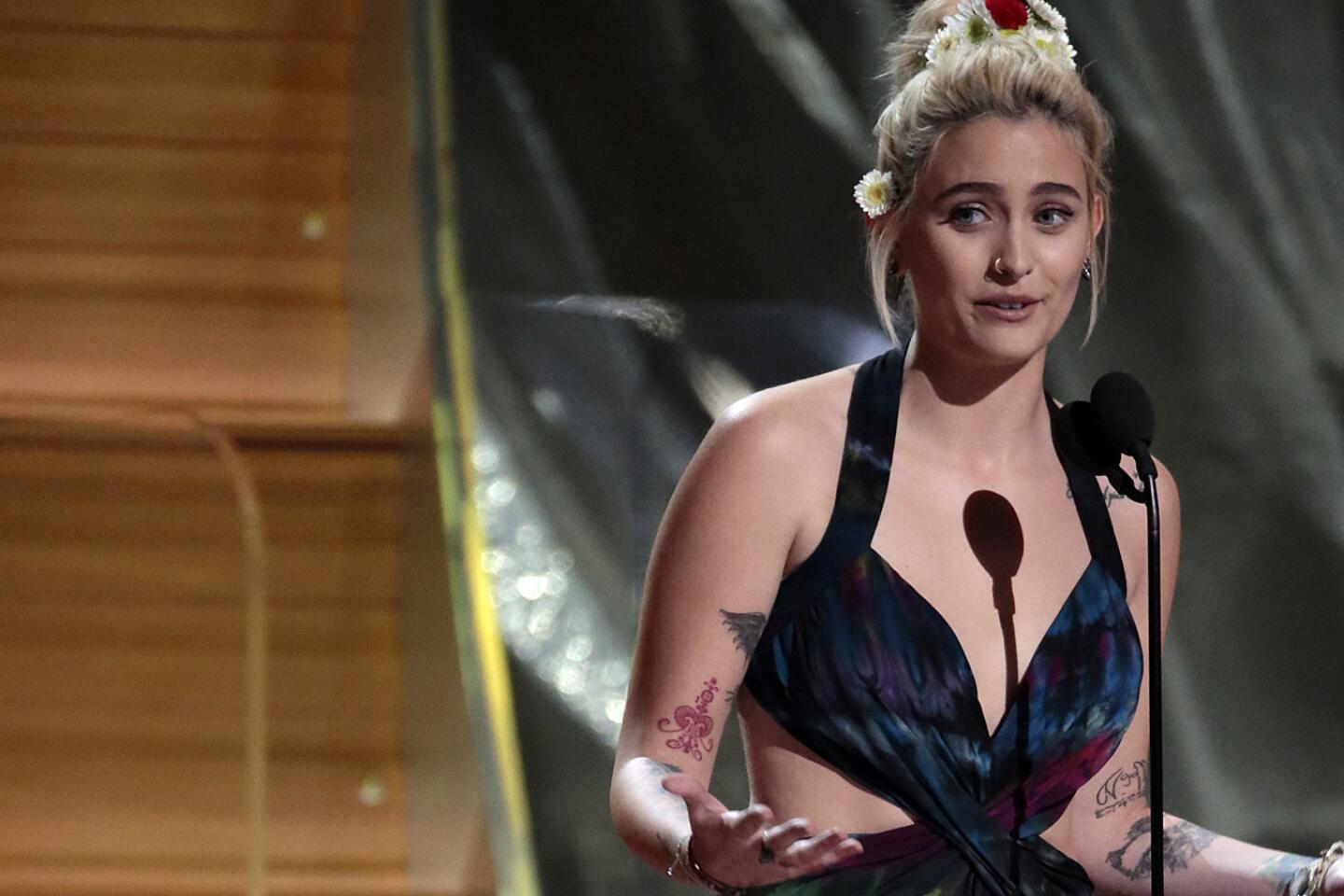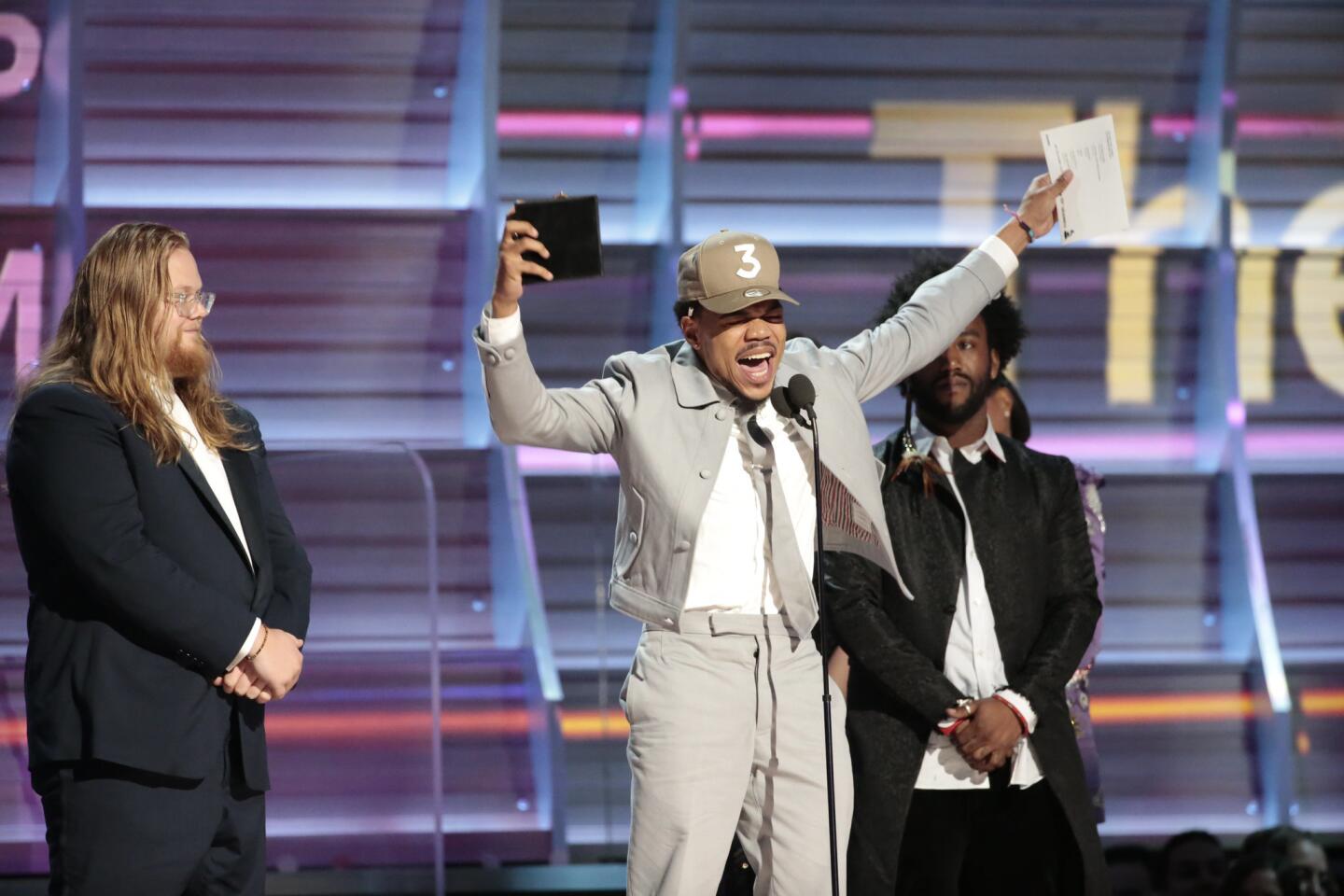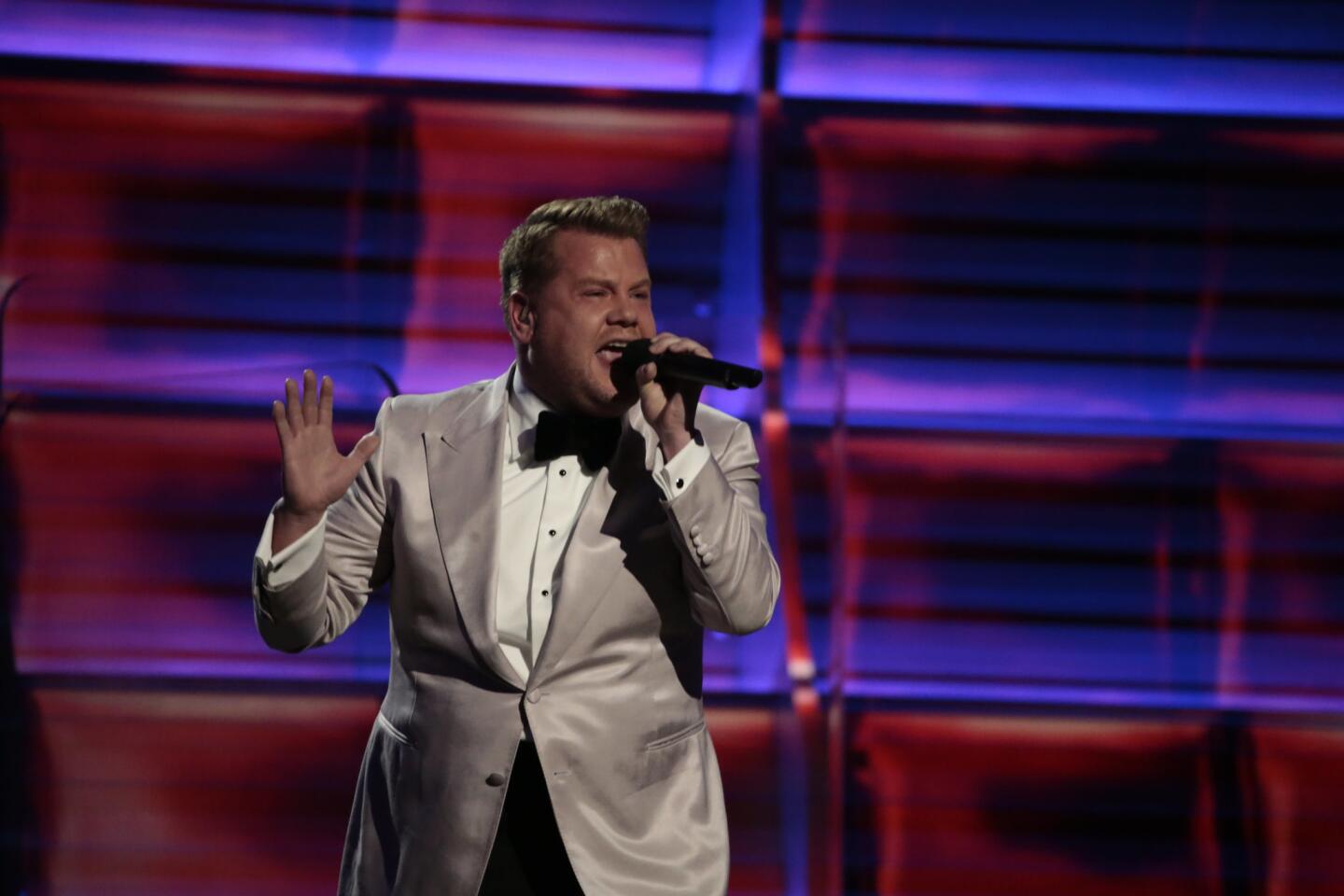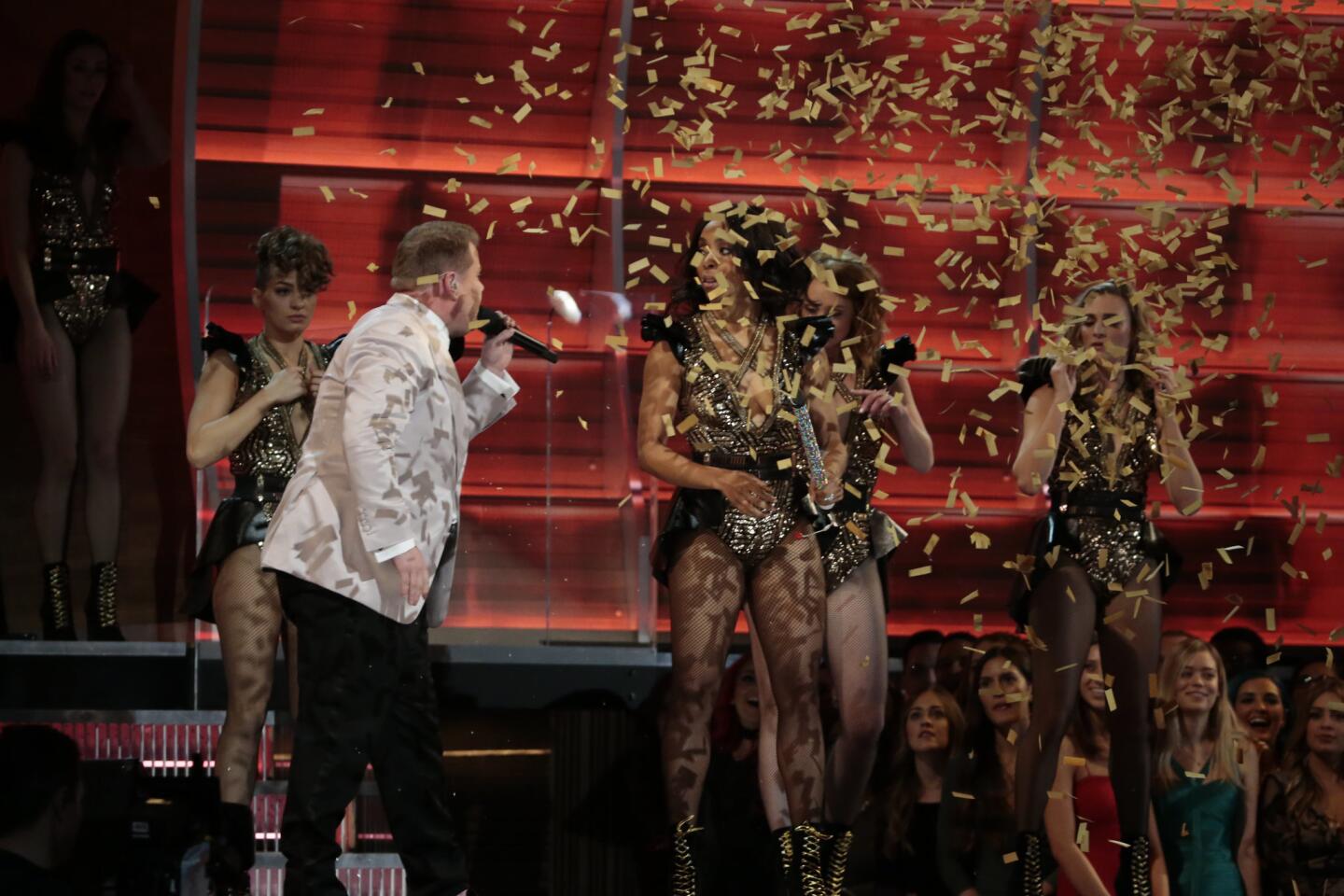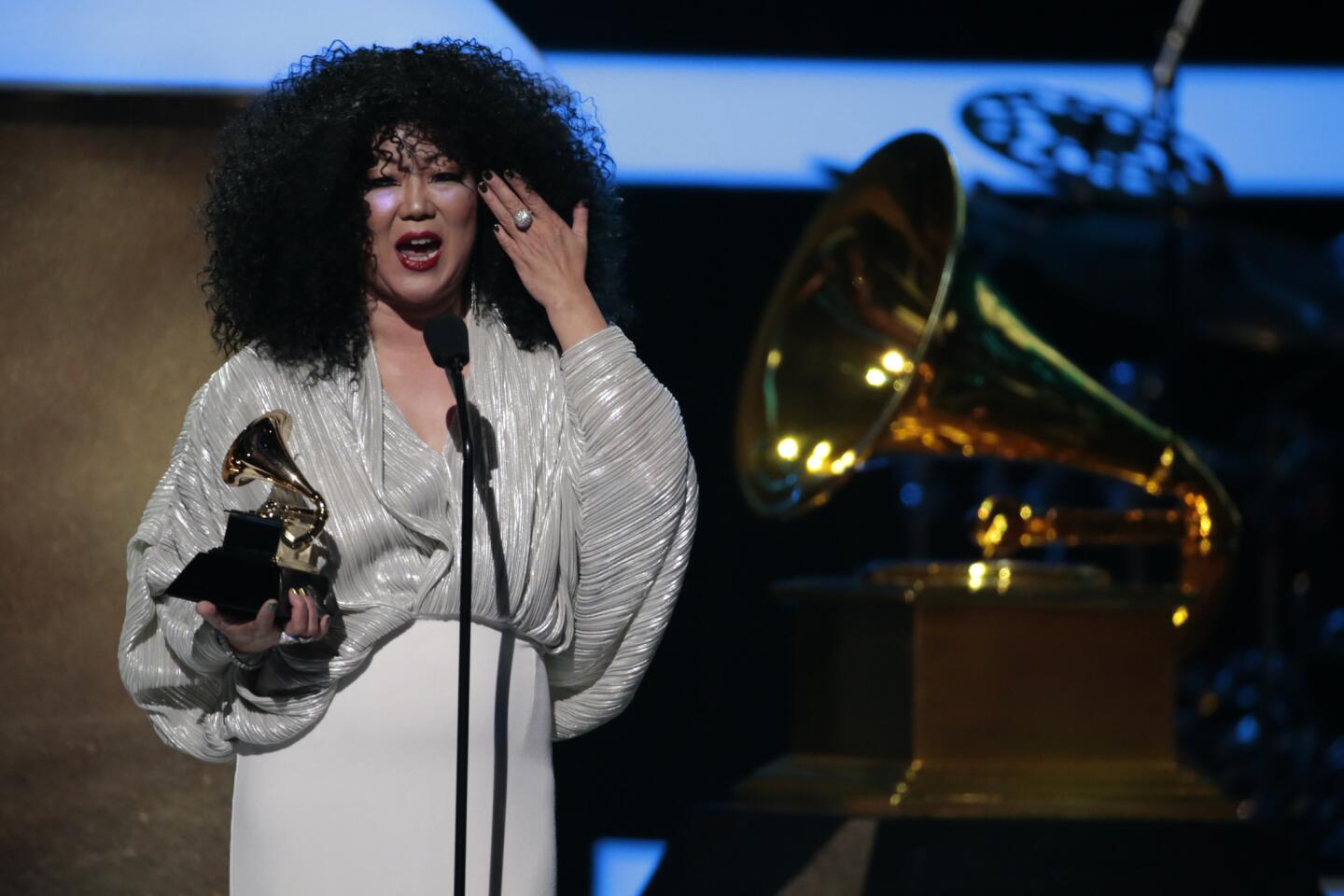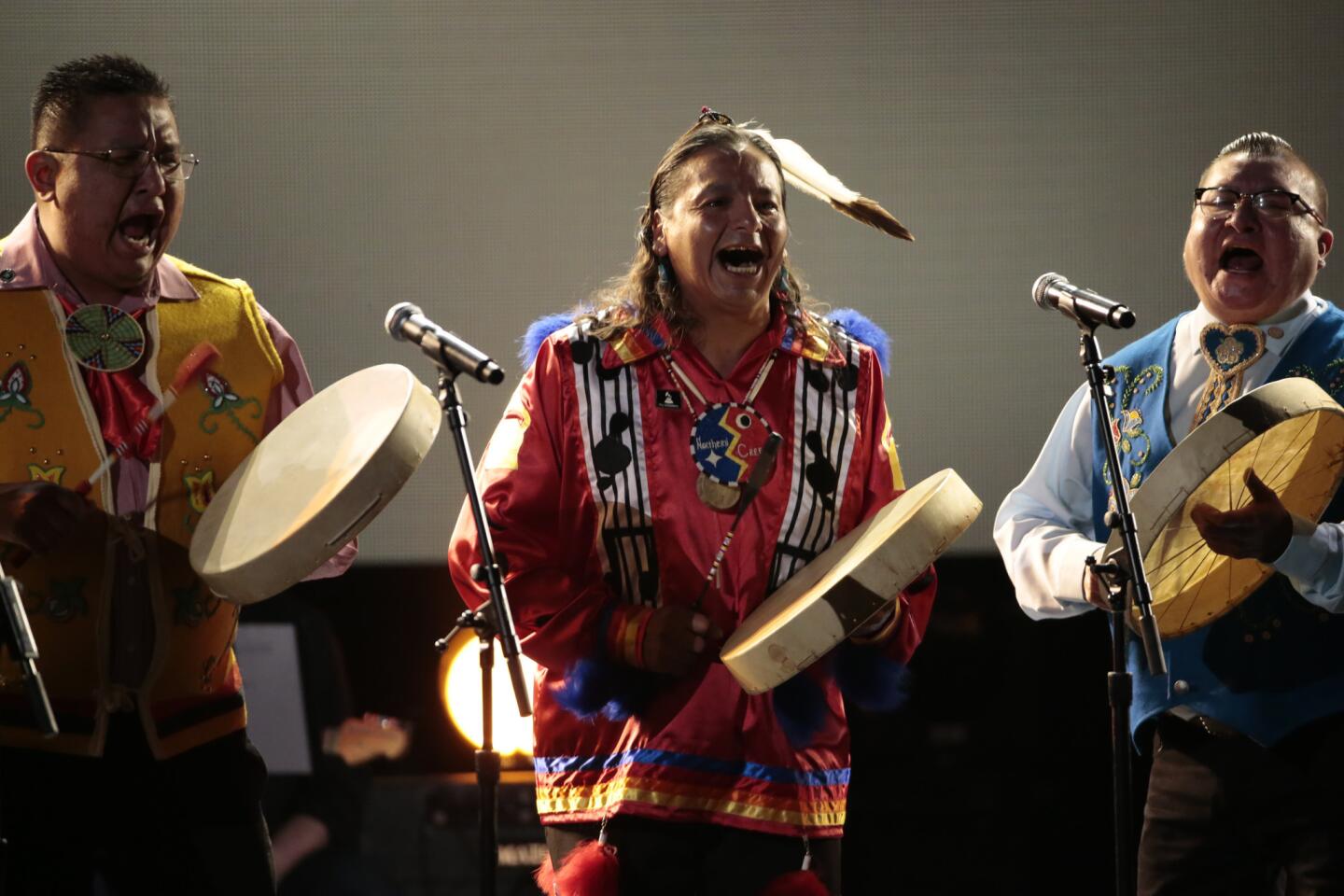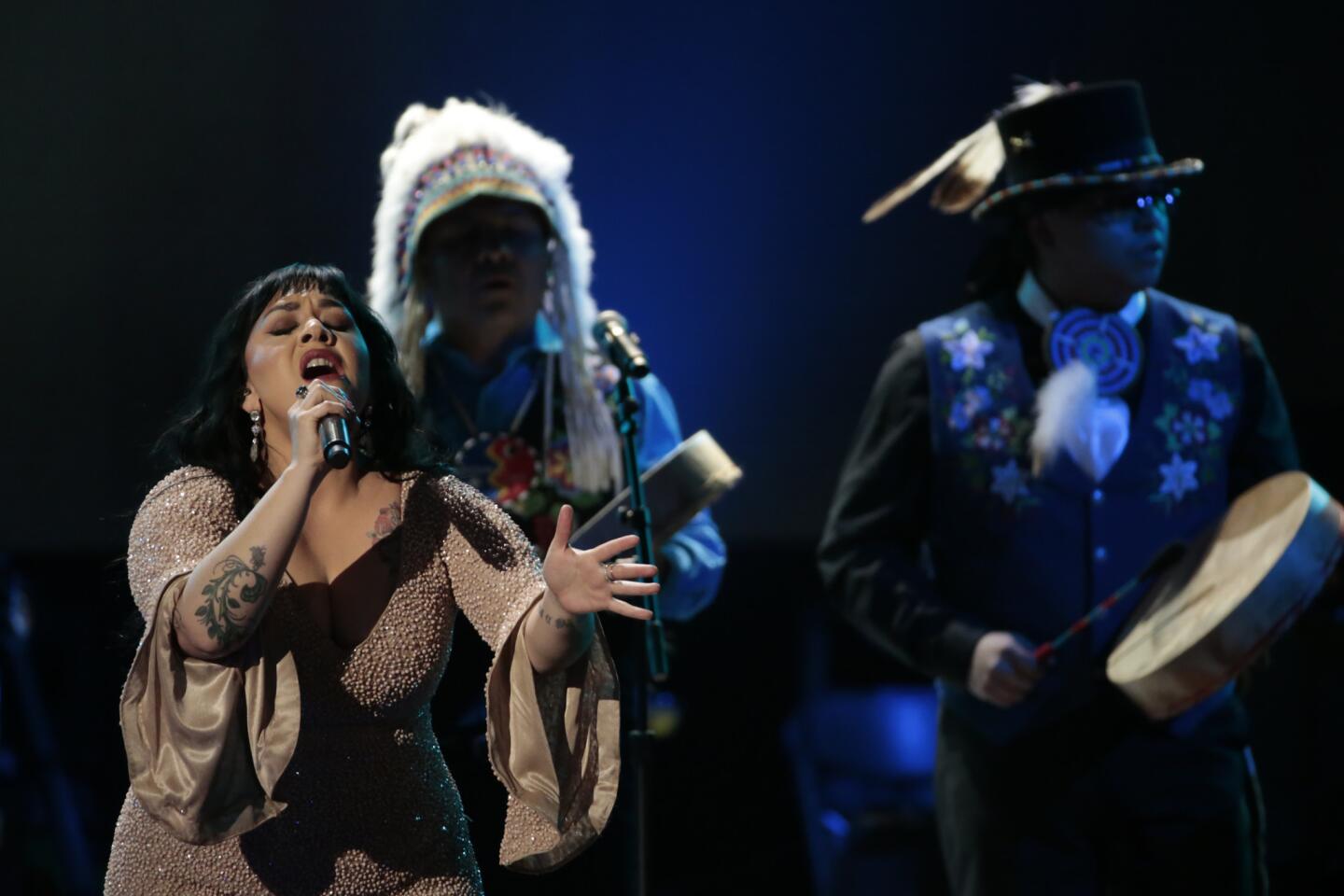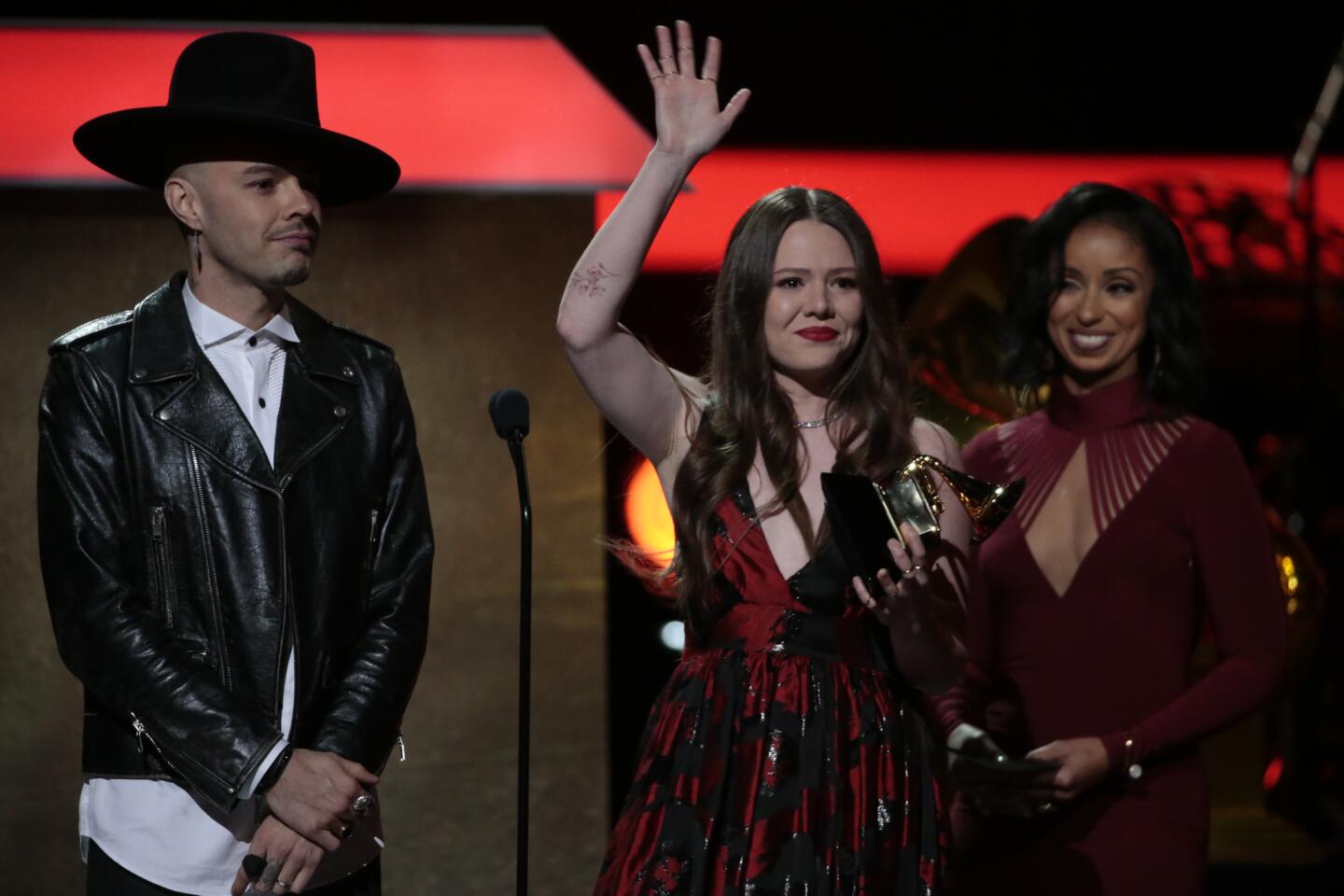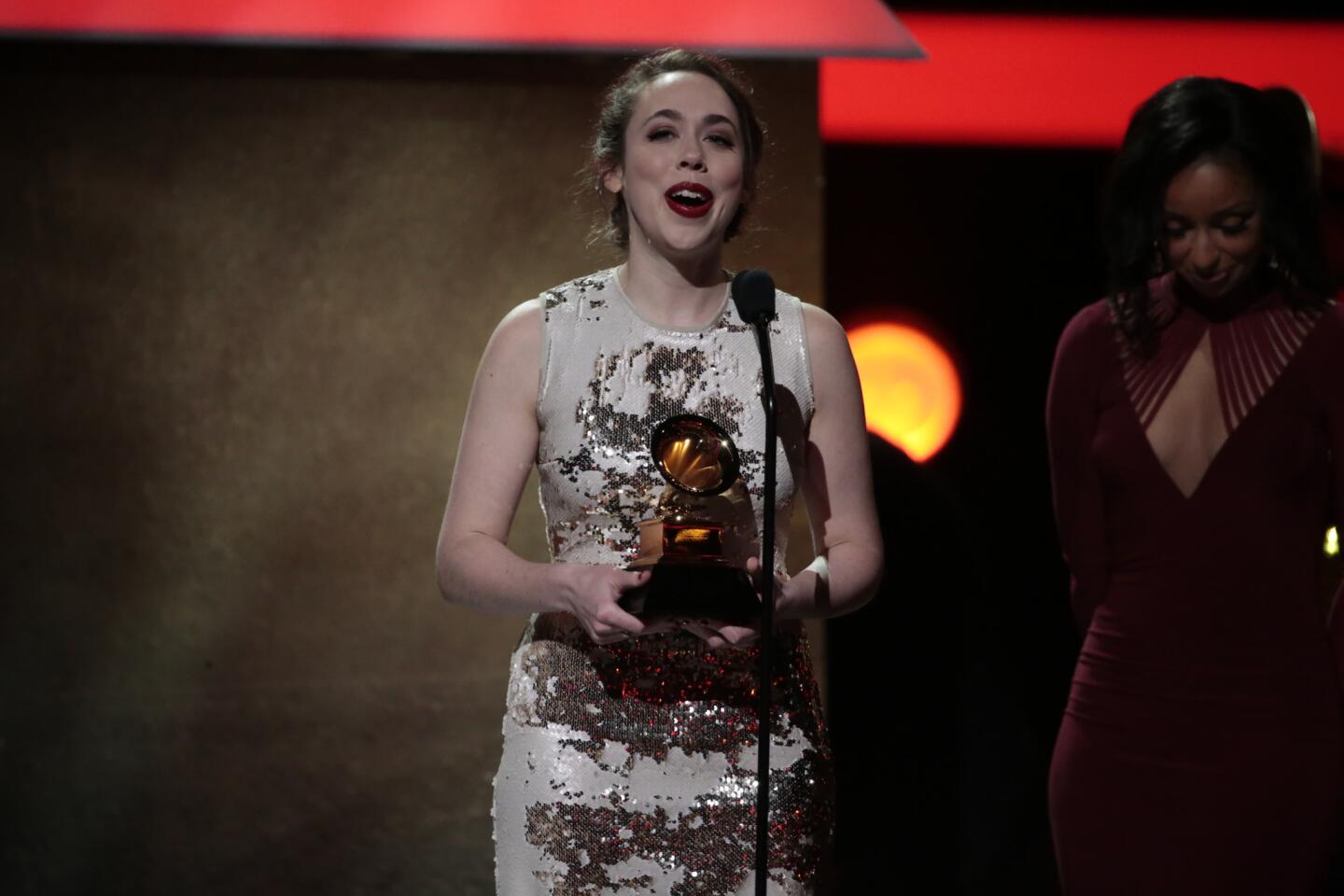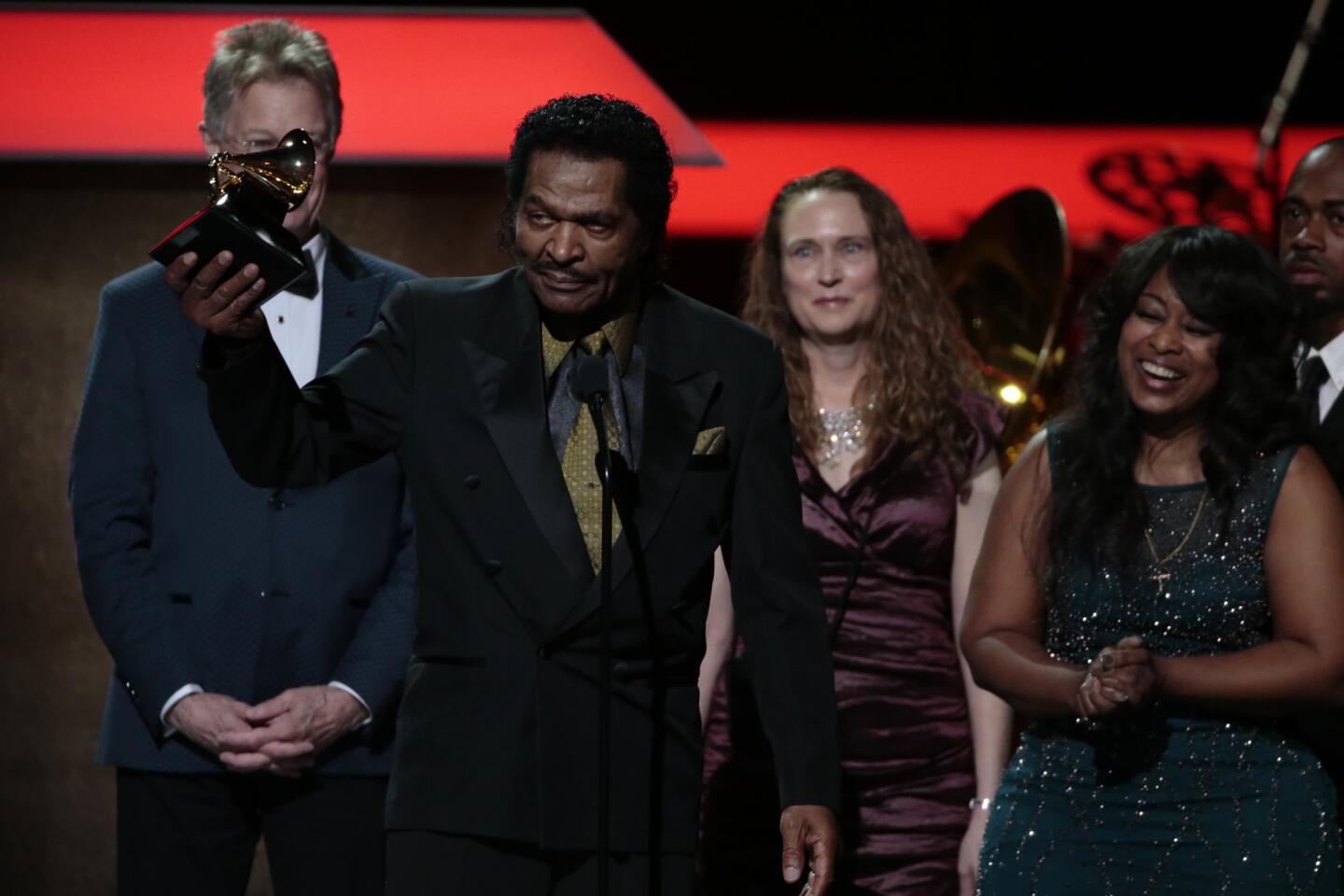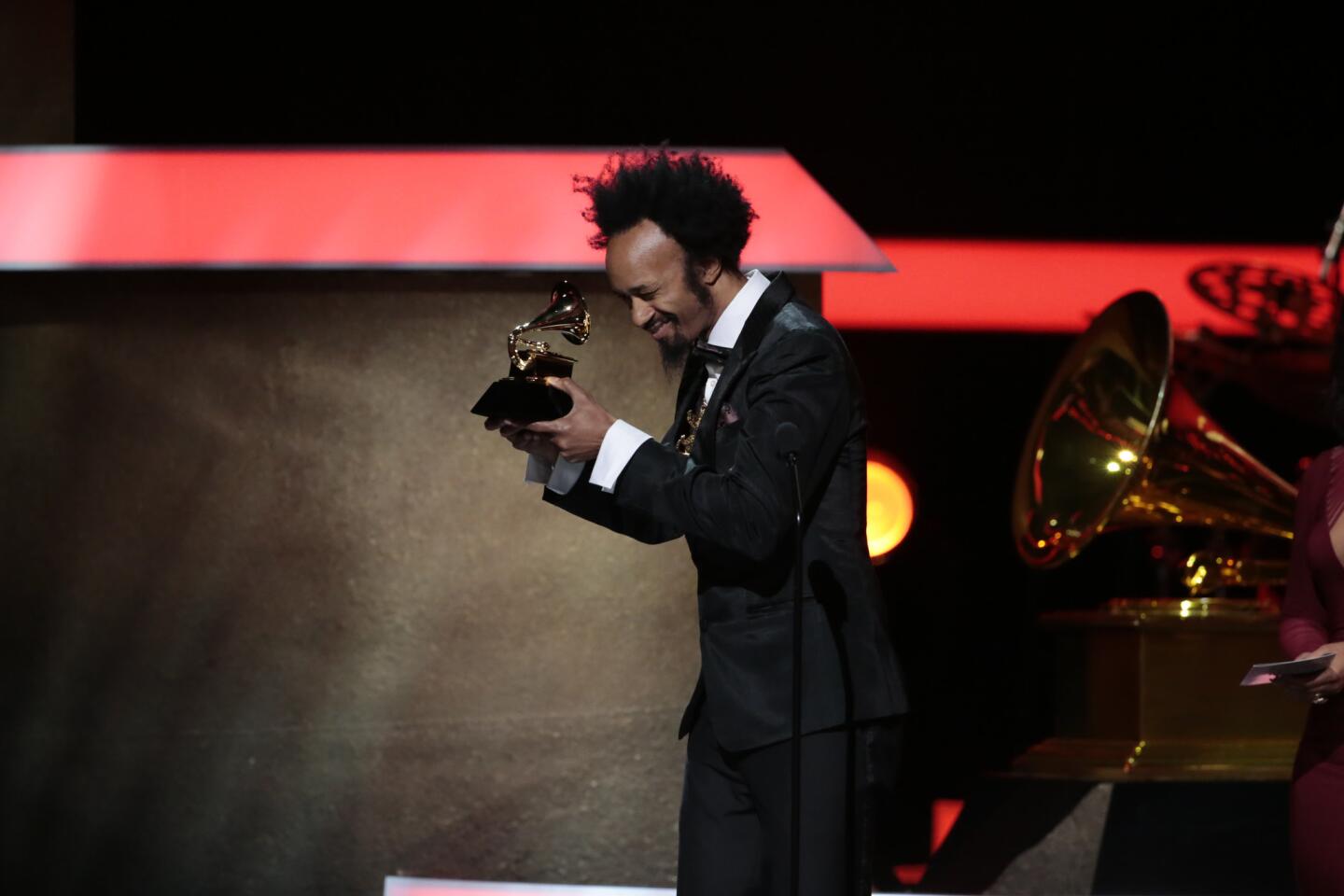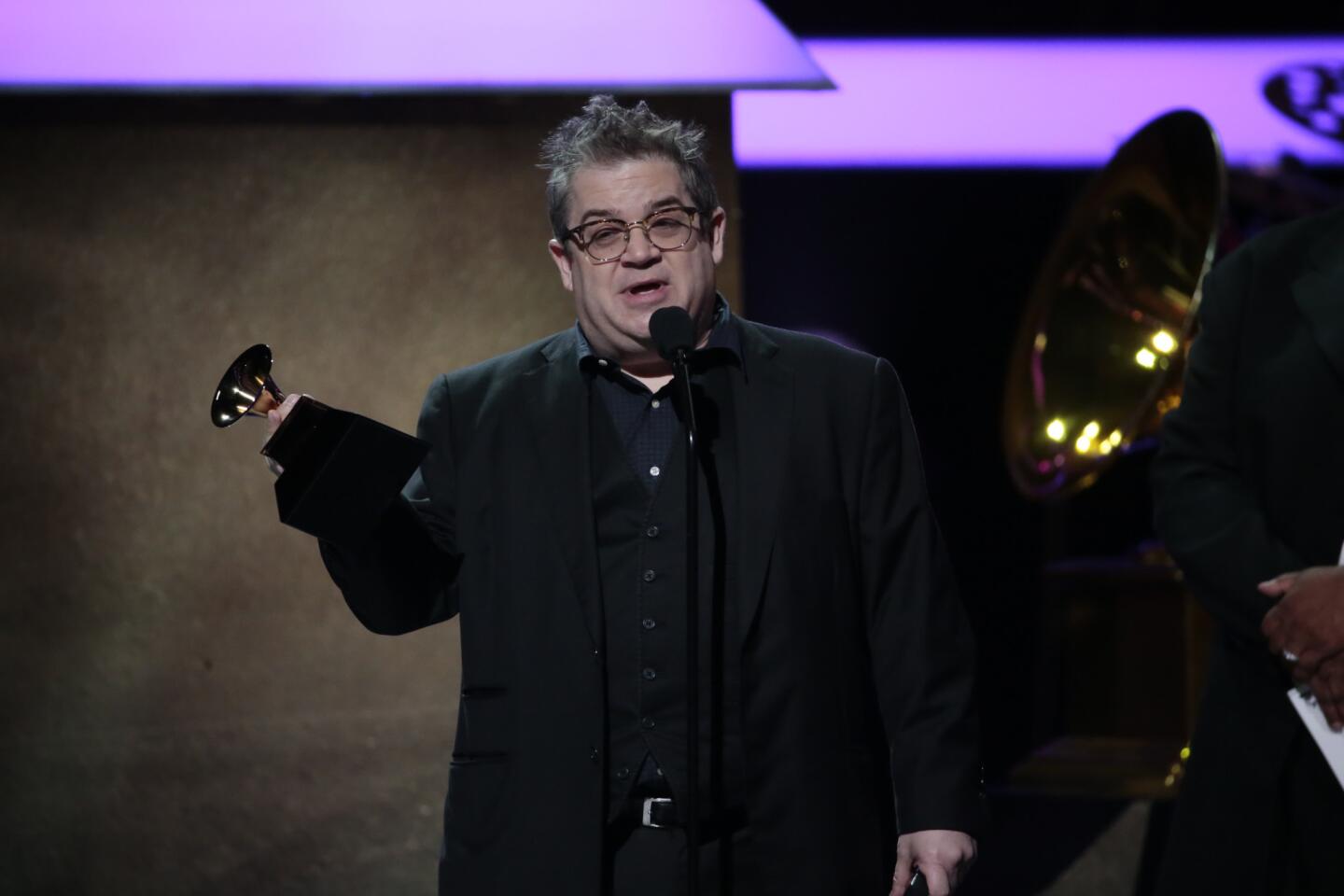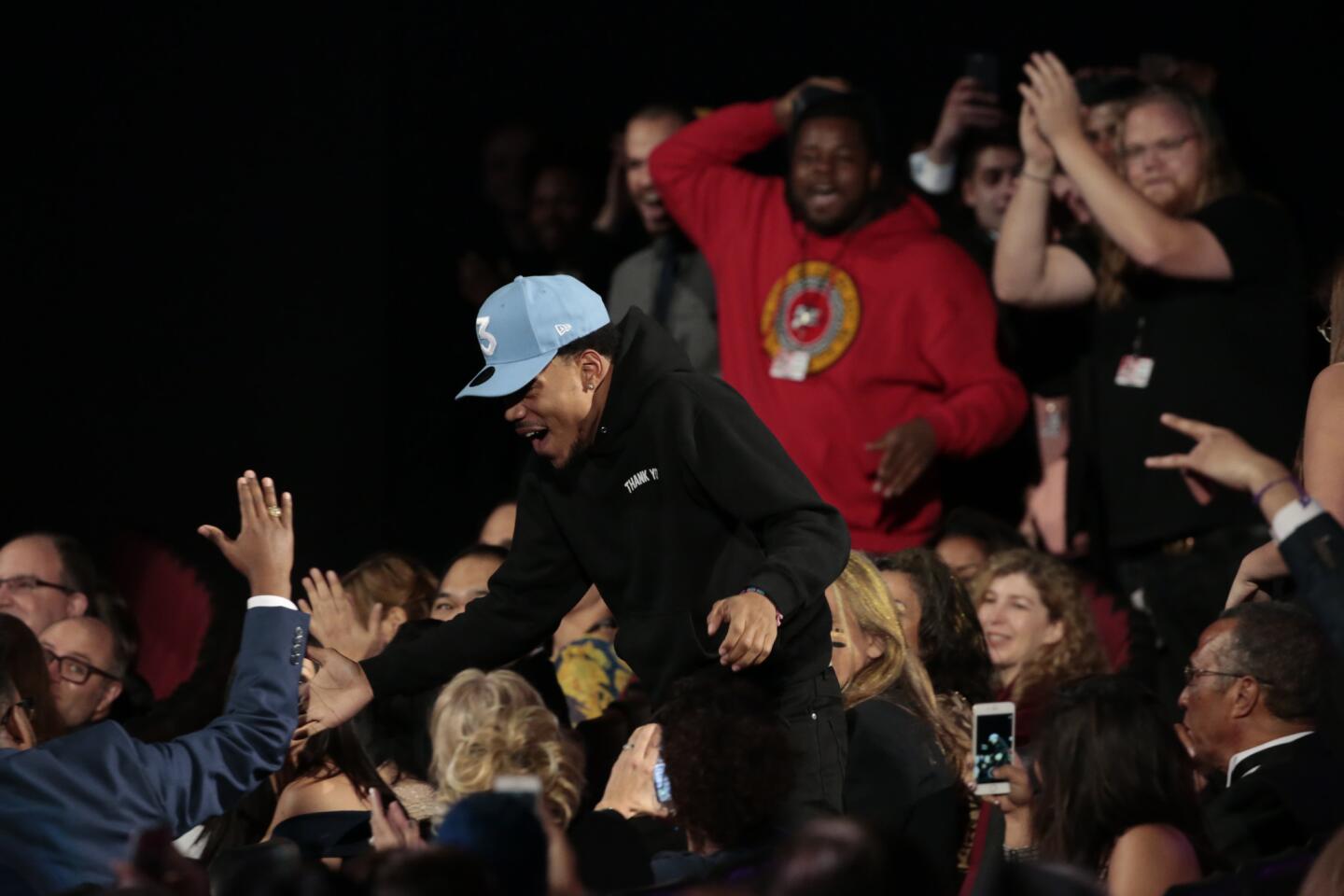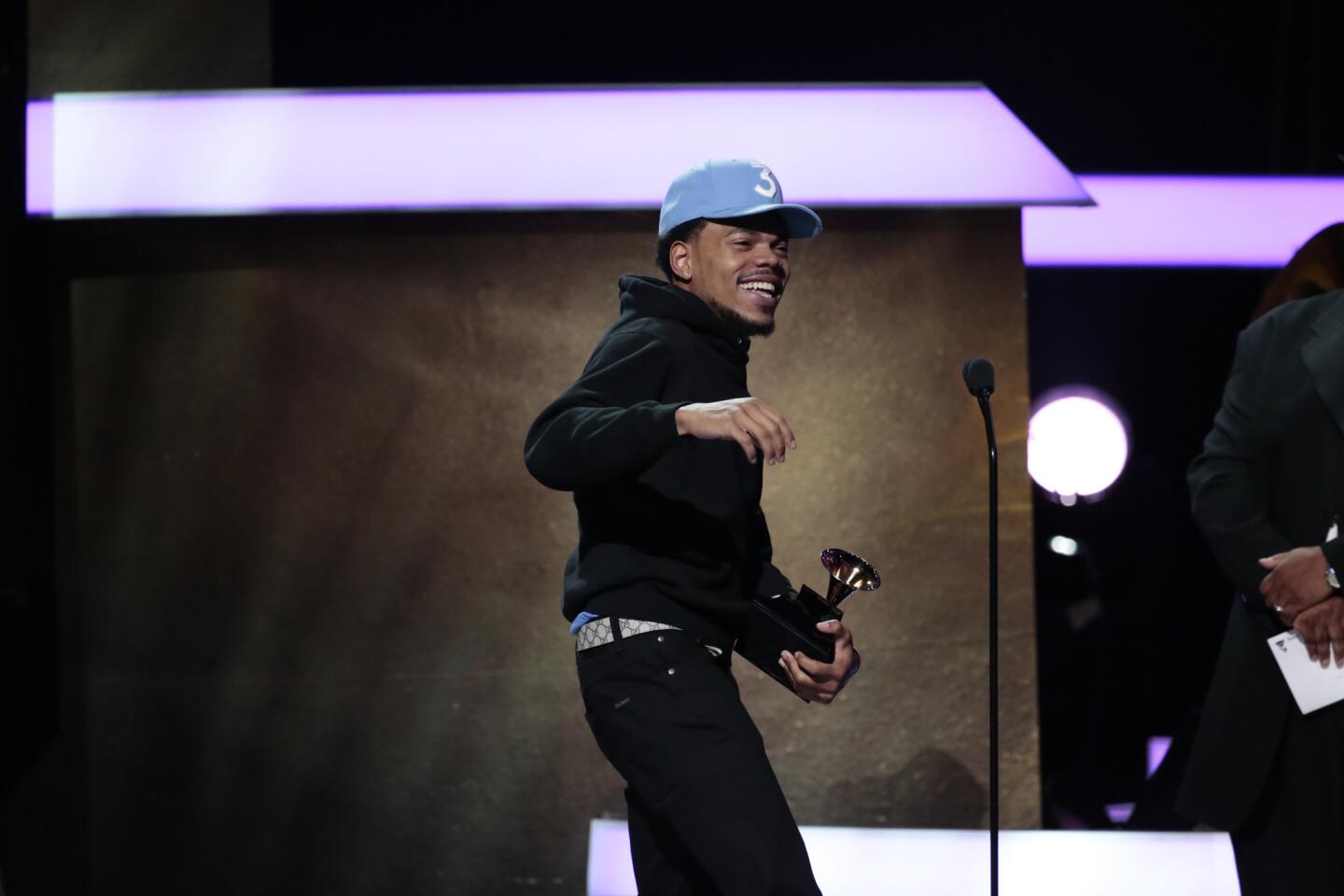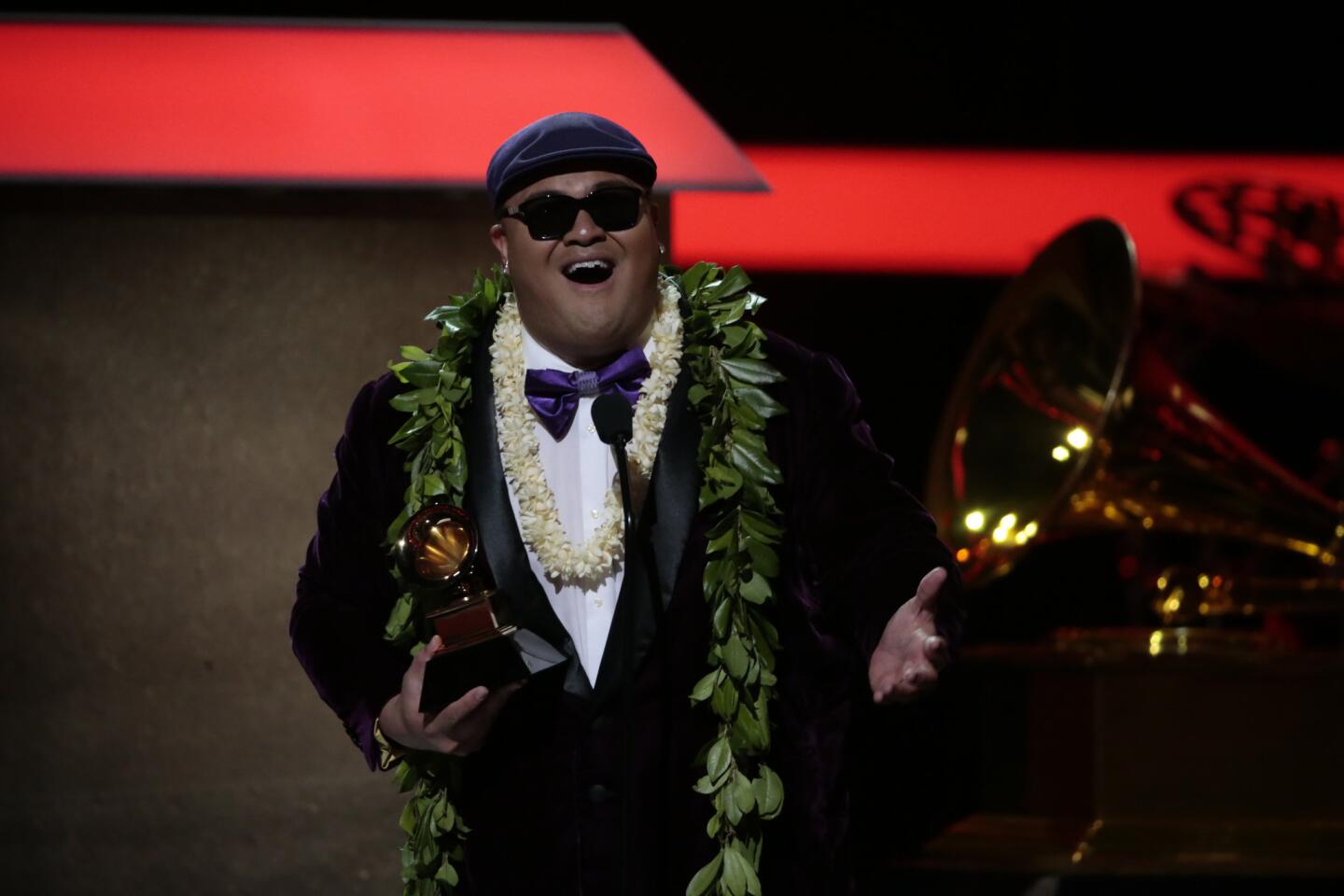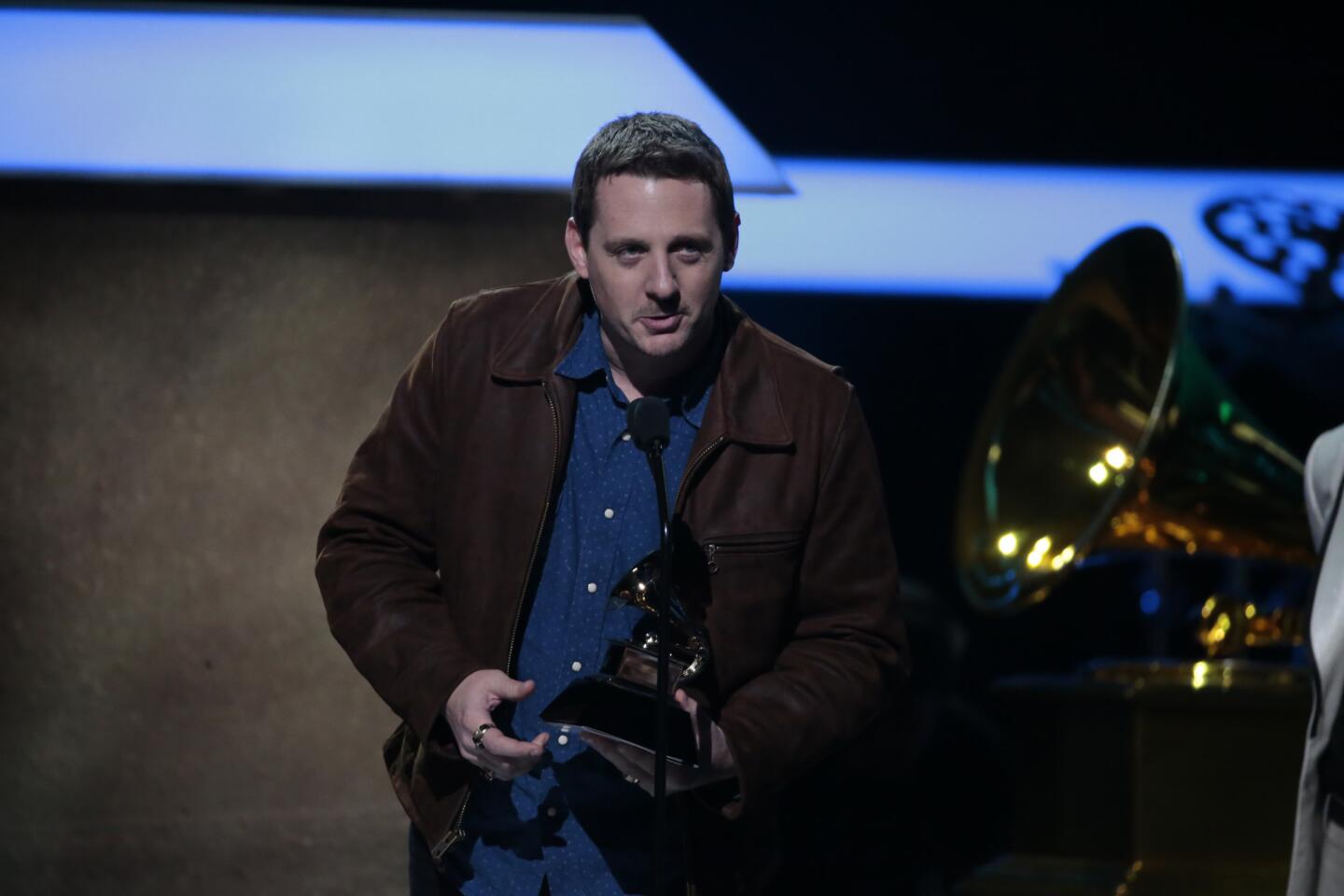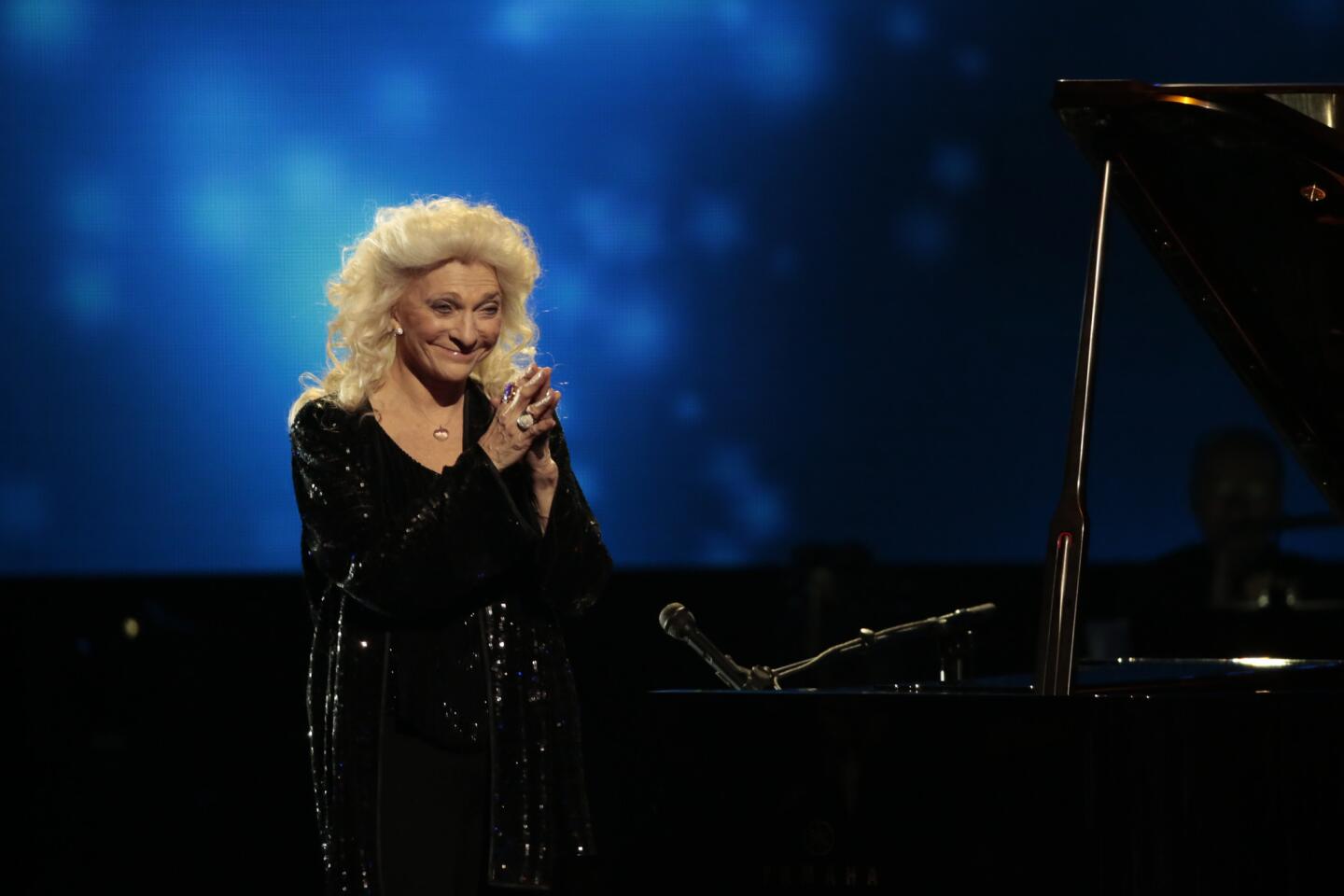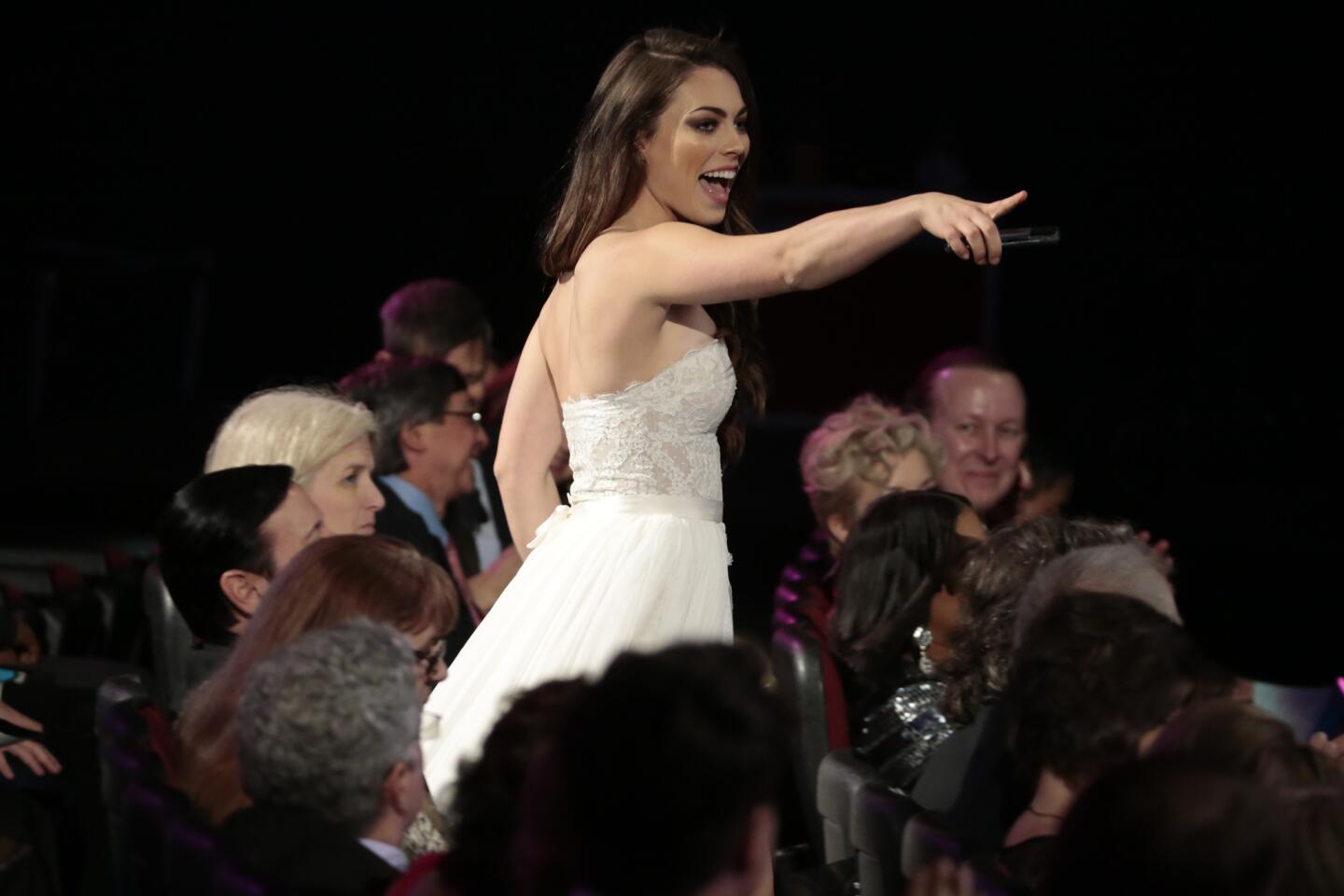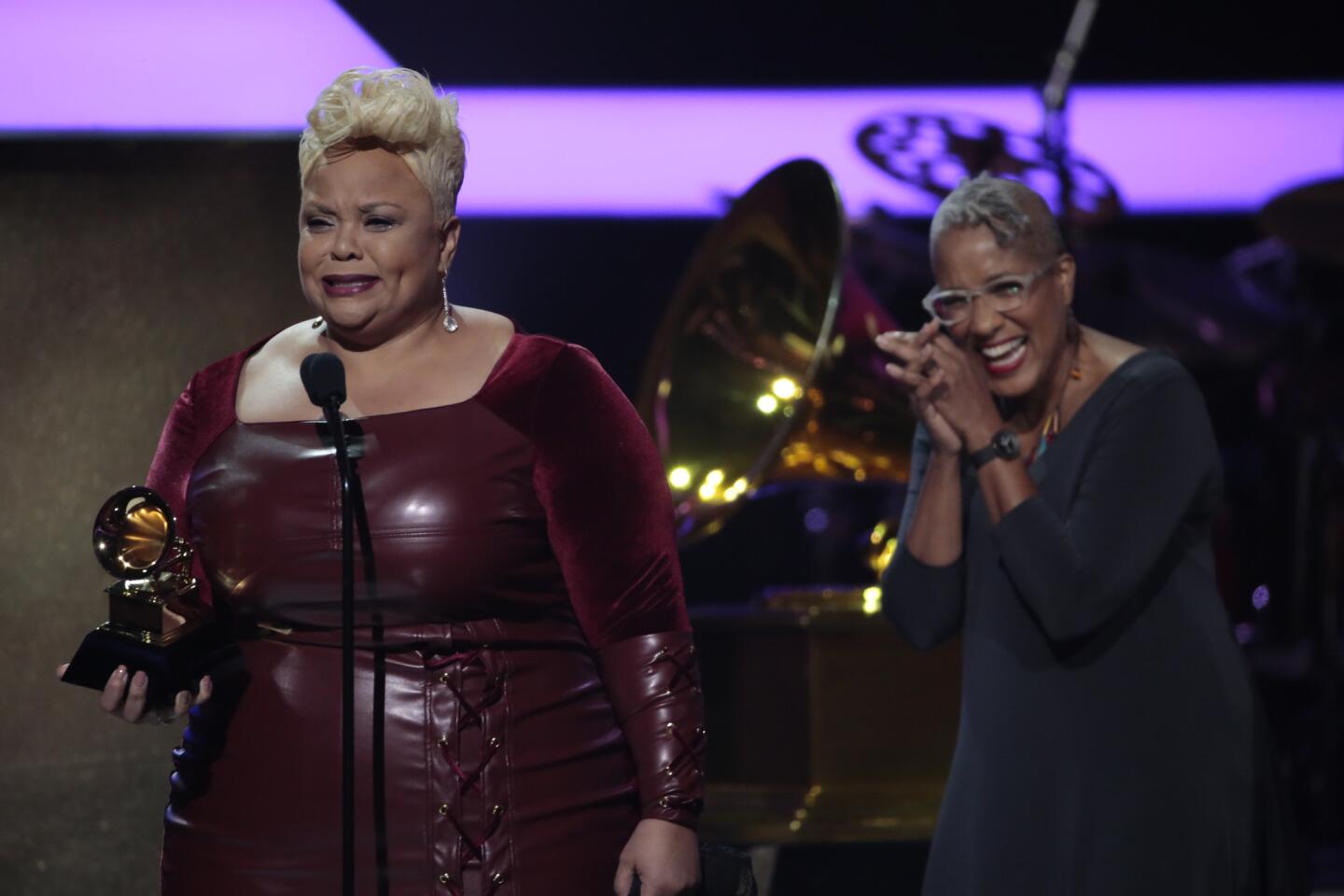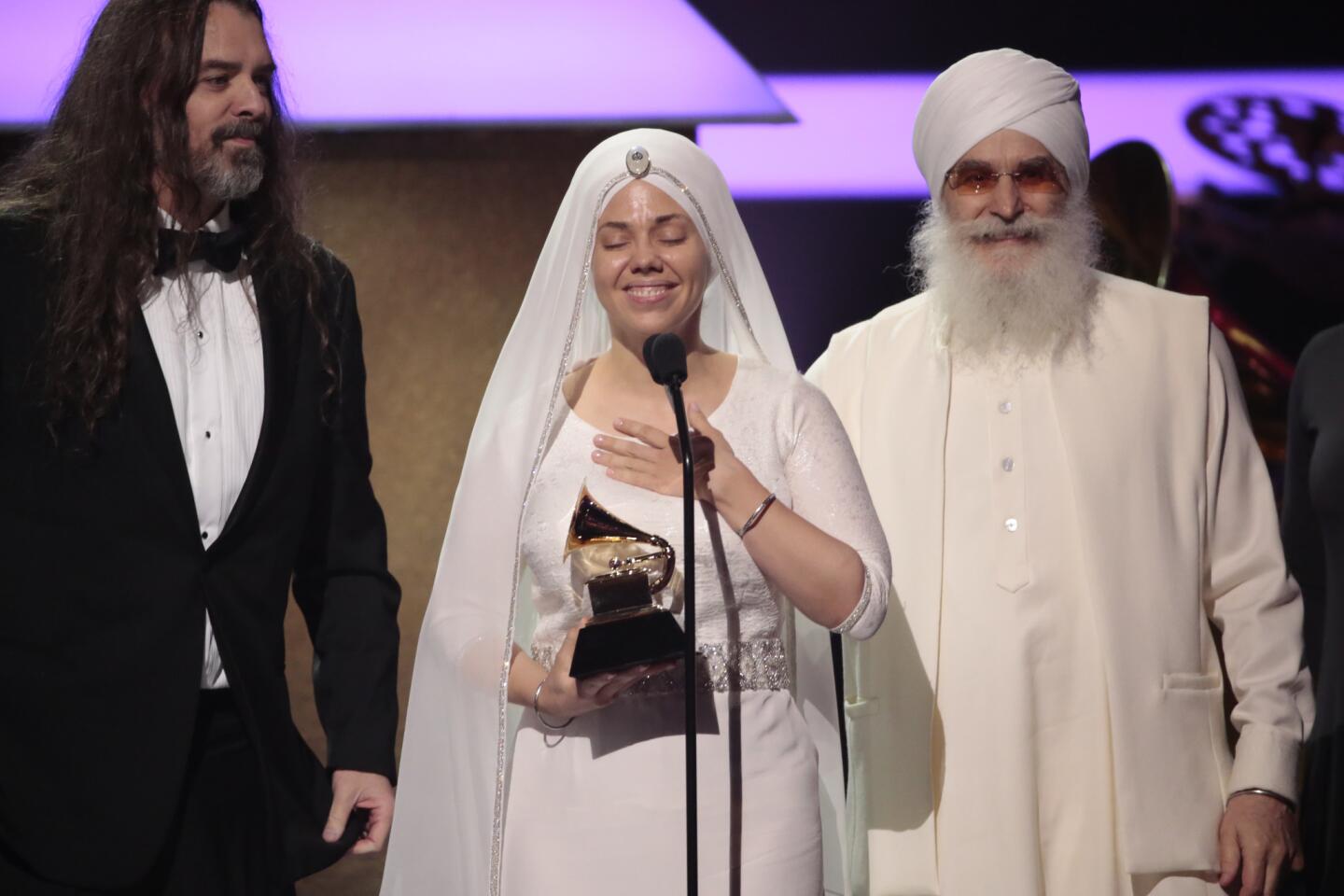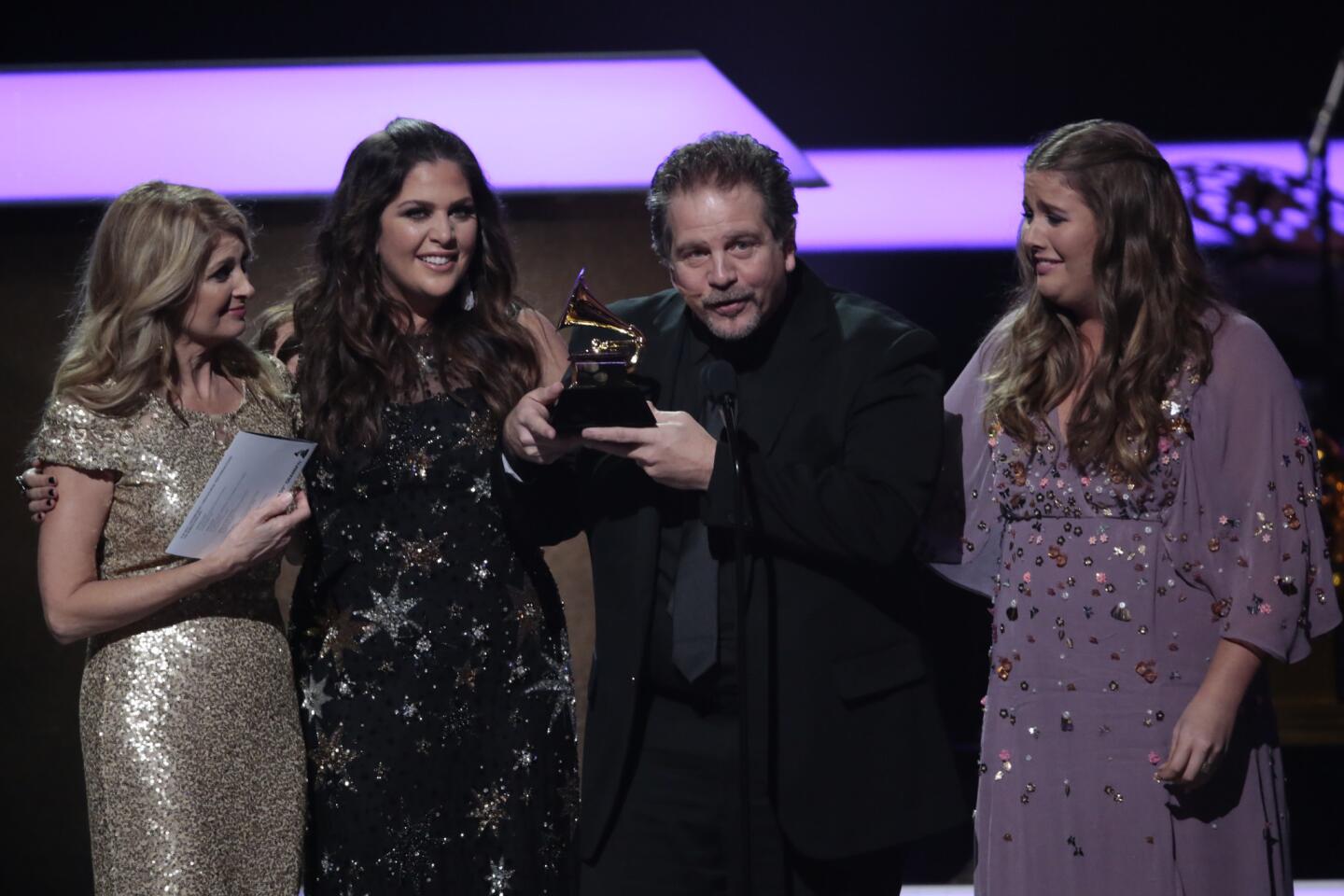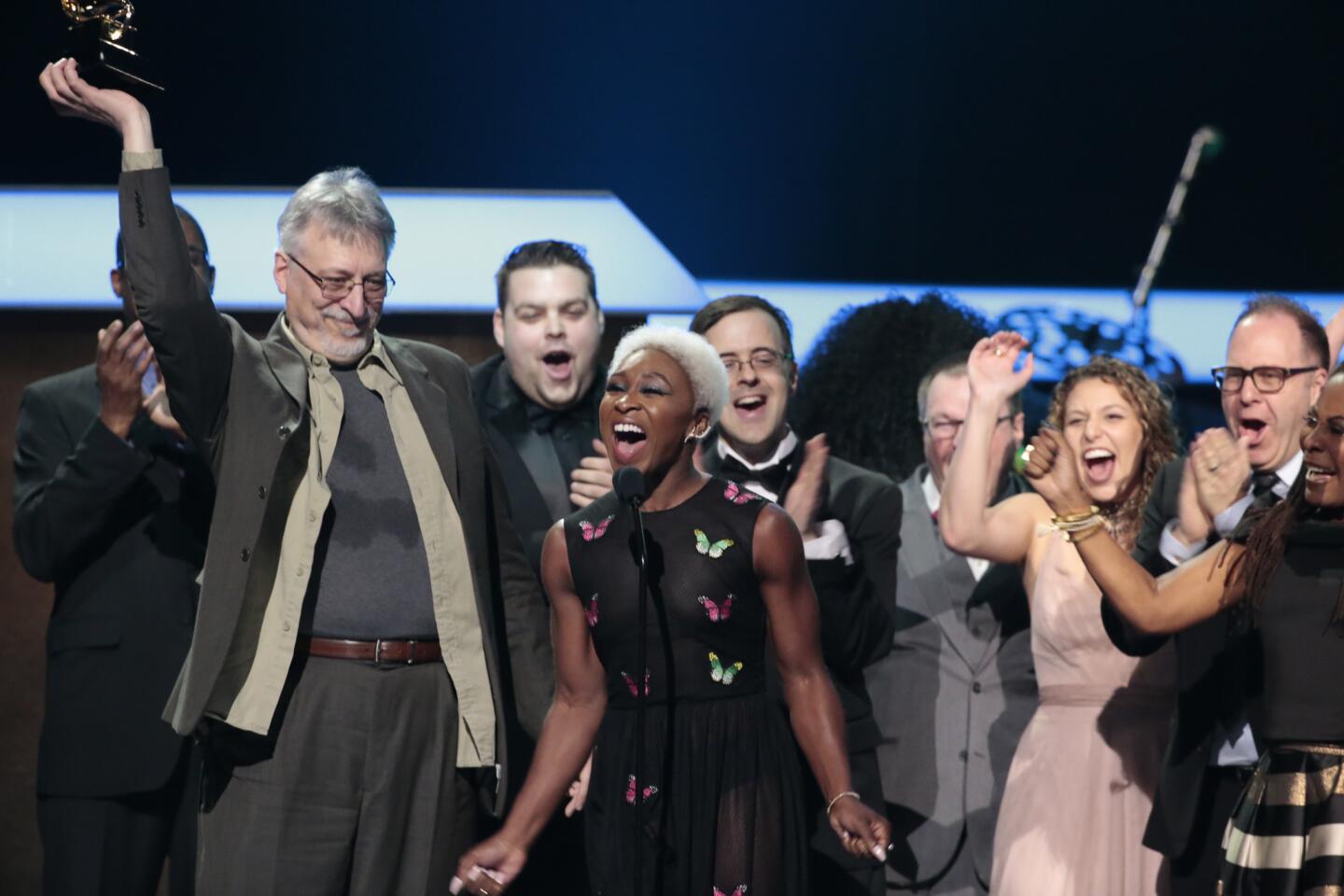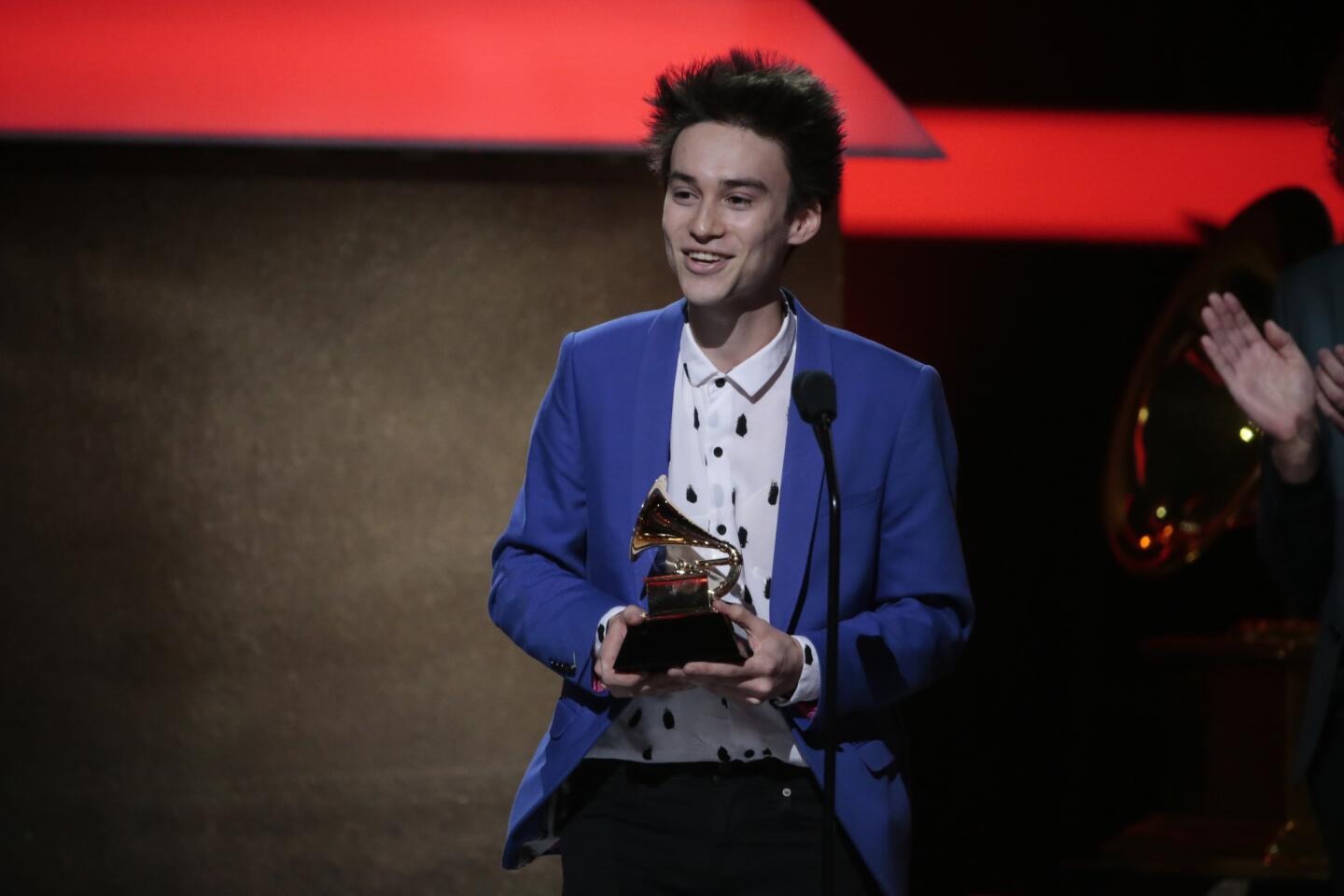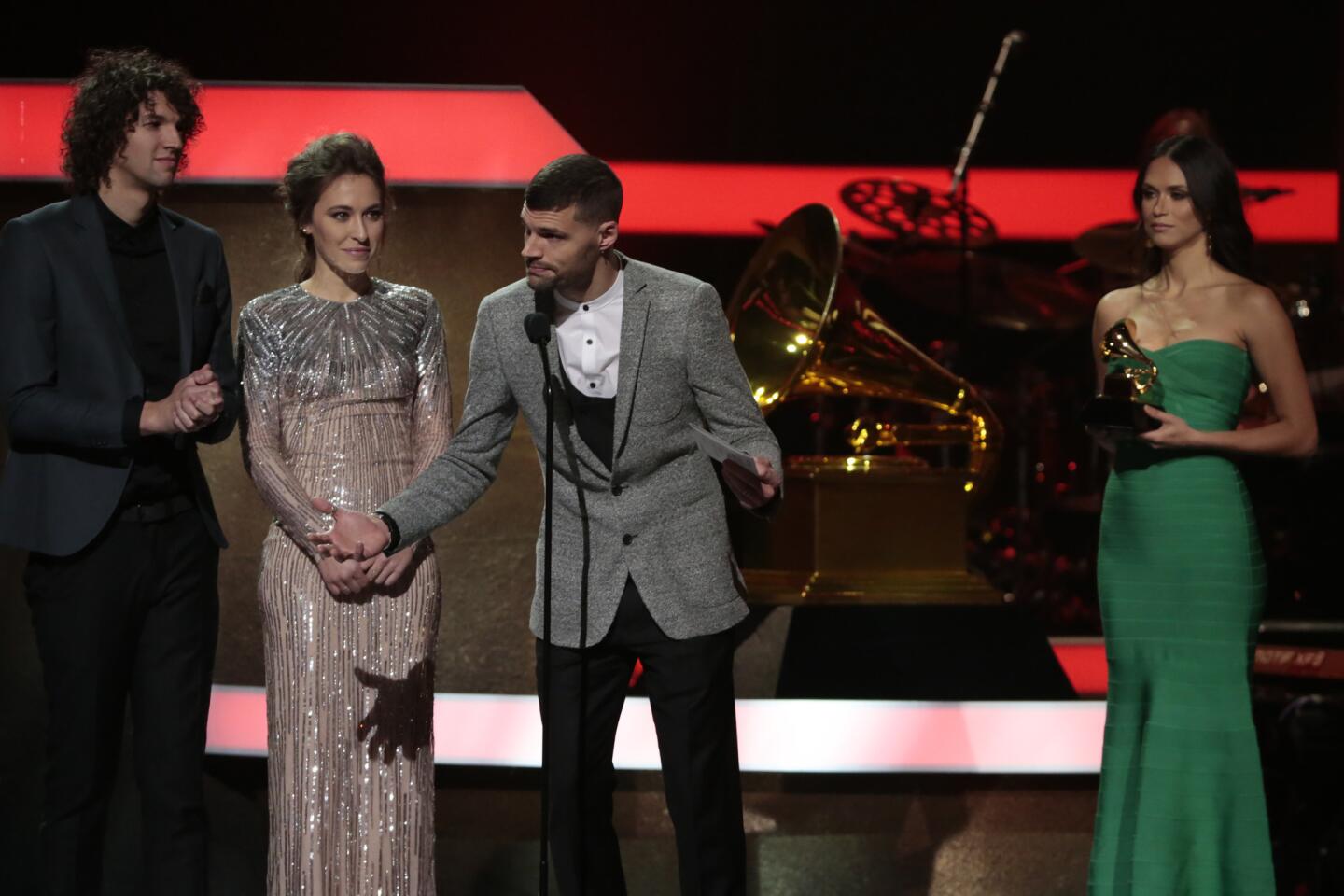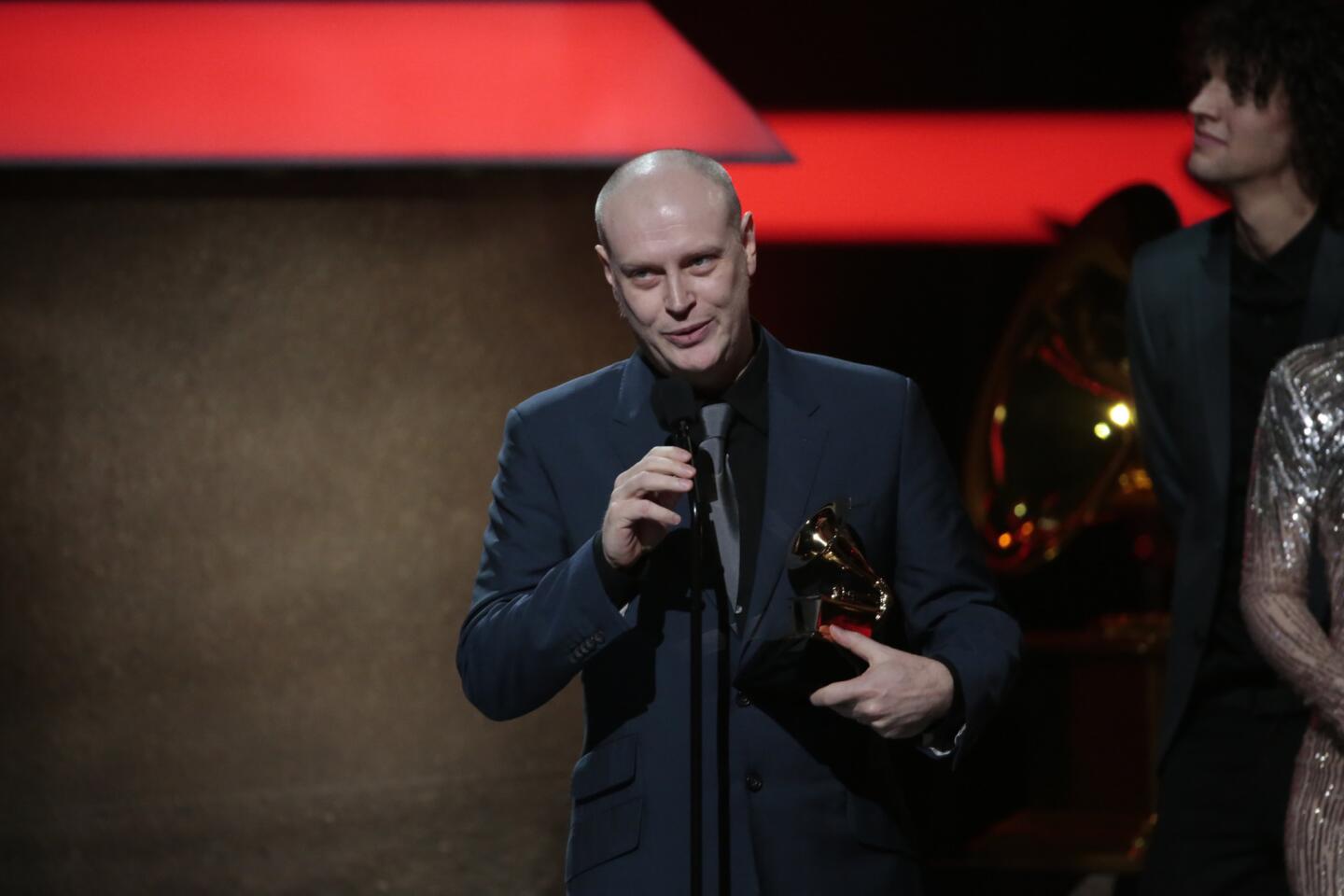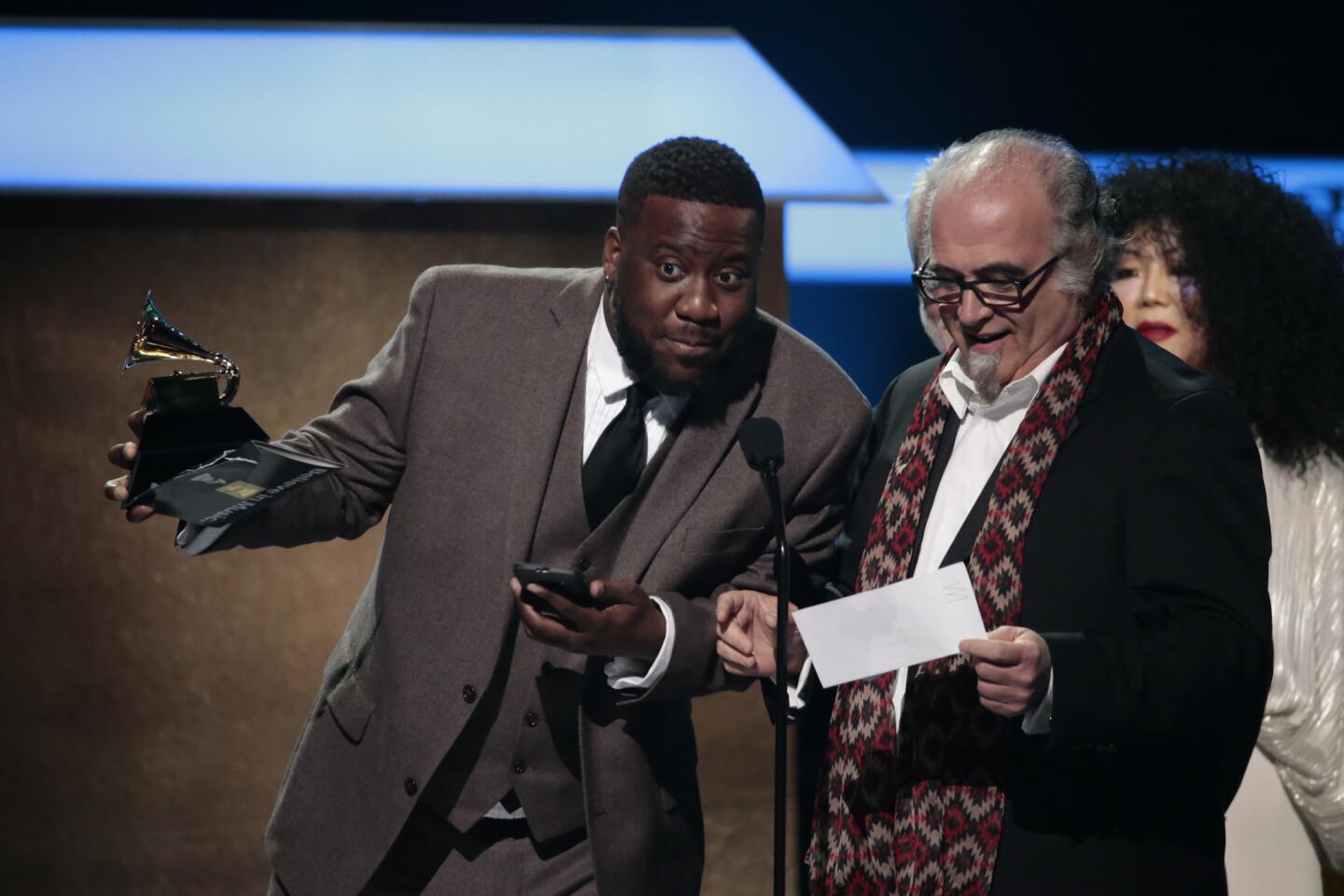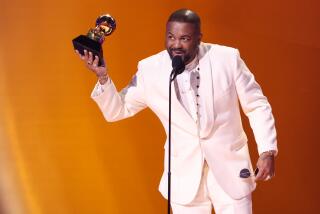Is this becoming a habit for Adele?
As you’ve surely heard by now, the young British singer went dramatically off-script at Sunday’s Grammy Awards, halting her shaky performance of the late George Michael’s “Fastlove” (presumably because she couldn’t hear her accompaniment) and asking to start the tribute again.
But although the moment was shocking — at least by the tightly managed standards of televised awards shows — it wasn’t exactly a surprise: After all, Adele experienced a similar mishap at the 2016 Grammys, where she delivered a deeply pitchy rendition of her song “All I Ask” that seemed to disrupt the idea of Adele’s vocal prowess.
1/59
Adele reacts to winning the award for song of the year for “Hello.” She also won record of the year.
(Robert Gauthier / Los Angeles Times) 2/59
Adele onstage after winning Album of the Year for “25.”
(Robert Gauthier / Los Angeles Times) 3/59
Bruno Mars performs a tribute to Prince at the 59th Grammy Awards.
(Robert Gauthier / Los Angeles Times) 4/59
Chance the Rapper performs with a choir and Kirk Franklin.
(Robert Gauthier / Los Angeles Times) 5/59
Sturgill Simpson with The Dap Kings performs “All Around You.”
(Robert Gauthier / Los Angeles Times) 6/59
Sturgill Simpson with The Dap Kings.
(Robert Gauthier / Los Angeles Times) 7/59
Cynthia Erivo, right, and John Legend
(Robert Gauthier / Los Angeles Times) 8/59
Chance the Rapper
(Robert Gauthier / Los Angeles Times) 9/59
Bruno Mars and Morris Day during the Prince tribute.
(Robert Gauthier / Los Angeles Times) 10/59
A Tribe Called Quest with Anderson .Paak performs at the 59th Grammy Awards.
(Robert Gauthier / Los Angeles Times) 11/59
A Tribe Called Quest and Anderson .Paak perform at the Grammys.
(Robert Gauthier / Los Angeles Times) 12/59
Songwriters Adele and Greg Kurstin accept the song of the year award for “Hello.”
(Robert Gauthier / Los Angeles Times) 13/59
Pentatonix performs at the 59th Grammy Awards at Staples Center.
(Robert Gauthier / Los Angeles Times) 14/59
Andra Day performs during a tribute to the Bee Gees.
(Robert Gauthier / Los Angeles Times) 15/59
Little Big Town perform during the Bee Gees tribute.
(Robert Gauthier / Los Angeles Times) 16/59
Demi Lovato performs during a tribute to the Bee Gees.
(Robert Gauthier / Los Angeles Times) 17/59
Tori Kelly performs during a tribute to the Bee Gees.
(Robert Gauthier / Los Angeles Times) 18/59
Jimi Westbrook, left, Kimberly Schlapman, Karen Fairchild and Philip Sweet of group Little Big Town, and Demi Lovato, Andra Day and Tori Kelly perform a tribute to the Bee Gees.
(Kevin Winter / Getty Images for NARAS) 19/59
Metallica and Lady Gaga perform onstage during the Grammys.
(Robert Gauthier / Los Angeles Times) 20/59
Lady Gaga crowd surfs while performing with Metallica.
(Robert Gauthier / Los Angeles Times) 21/59
Adele pays tribute to George Michael at the Grammys.
(Robert Gauthier / Los Angeles Times) 22/59
Beyonce accepts the award for best urban contemporary album for “Lemonade.”
(Robert Gauthier / Los Angeles Times) 23/59
Katy Perry performs “Chained to the Rhythm” at the Grammys.
(Robert Gauthier / Los Angeles Times) 24/59
Bruno Mars performs “That’s What I Like” at the Grammy Awards.
(Robert Gauthier / Los Angeles Times) 25/59
Beyoncé performs at the 59th Grammy Awards.
(Robert Gauthier / Los Angeles Times) 26/59
Beyonce performed “Love Drought.”
(Robert Gauthier / Los Angeles Times) 27/59
Beyoncé leans back on a throne-like chair while performing at the 59th Grammy Awards.
(Robert Gauthier / Los Angeles Times) 28/59
Lukas Graham and Kelsea Ballerini perform a mash-up of “7 Years” and “Peter Pan” at the Grammys.
(Robert Gauthier / Los Angeles Times) 29/59
Twenty One Pilots wins for pop duo/group performance for “Stressed Out.”
(Invision / Associated Press) 30/59
Ed Sheehan
(Robert Gauthier / Los Angeles Times) 31/59
The Weeknd performs with Daft Punk.
(Robert Gauthier / Los Angeles Times) 32/59
Keith Urban and Carrie Underwood
(Robert Gauthier / Los Angeles Times) 33/59
Paris Jackson introduces The Weeknd.
(Robert Gauthier / Los Angeles Times) 34/59
Chance the Rapper wins the rap album Grammy.
(Robert Gauthier / Los Angeles Times) 35/59
James Corden hosts the 59th Grammy Awards at Staples Center.
(Robert Gauthier / Los Angeles Times) 36/59
James Corden performs with backup dancers.
(Robert Gauthier / Los Angeles Times) 37/59
Margaret Cho at the 59th Grammy Awards pre-telecast show at the Microsoft Theater in Los Angeles.
(Robert Gauthier / Los Angeles Times) 38/59
Members of Northern Cree perform at the pre-telecast show.
(Robert Gauthier / Los Angeles Times) 39/59
Carla Morrison performs at Microsoft Theater in Los Angeles at the pre-telecast show for the Grammy Awards.
(Robert Gauthier / Los Angeles Times) 40/59
Jesse Huerta and Joy Huerta of Jesse & Joy after winning the Grammy for Latin pop album.
(Robert Gauthier / Los Angeles Times) 41/59
Sarah Jarosz accepts the award for folk album.
(Robert Gauthier / Los Angeles Times) 42/59
Bobby Rush accepts his Grammy for traditional blues album.
(Robert Gauthier / Los Angeles Times) 43/59
Fantastic Negrito wins the award for contemporary blues album.
(Robert Gauthier / Los Angeles Times) 44/59
Patton Oswalt wins for comedy album at the pre-telecast show.
(Robert Gauthier / Los Angeles Times) 45/59
Chance the Rapper after winning the rap performance award for “No Problem.”
(Robert Gauthier / Los Angeles Times) 46/59
Chance the Rapper takes the stage after winning the rap performance award for “No Problem.”
(Robert Gauthier / Los Angeles Times) 47/59
Kalani Pe’a, at the Grammys’ pre-telecast show, wins the award for regional music album.
(Robert Gauthier / Los Angeles Times) 48/59
Sturgill Simpson picks up the award for country album.
(Robert Gauthier / Los Angeles Times) 49/59
Judy Collins performs at the pre-telecast show for the 59th Grammy Awards at the Microsoft Theater.
(Robert Gauthier / Los Angeles Times) 50/59
Emily Weisband at the Grammy Awards pre-telecast show.
(Robert Gauthier / Los Angeles Times) 51/59
Tamela Mann, left, wins for gospel performance/song for “God Provides” at the Grammy Awards pre-telecast show.
(Robert Gauthier / Los Angeles Times) 52/59
White Sun, which won in the New Age category for its album “White Sun II,” is seen onstage at the Grammy Awards pre-telecast show.
(Robert Gauthier / Los Angeles Times) 53/59
Hillary Scott, second from left, and the Scott Family with their award for contemporary Christian music album.
(Robert Gauthier / Los Angeles Times) 54/59
Kirk Franklin accepts his Grammy for gospel album for “Losing My Religion.”
(Robert Gauthier / Los Angeles Times) 55/59
Cynthia Erivo, center, of “The Color Purple” speaks for the winners for musical theater album at the 59th Grammy Awards pre-telecast show at the Microsoft Theater in Los Angeles.
(Robert Gauthier / Los Angeles Times) 56/59
Jacob Collier wins at the 59th Grammy Awards pre-telecast show at the Microsoft Theater in Los Angeles.
(Robert Gauthier / Los Angeles Times) 57/59
Luke Smallbone, left, Lauren Daigle and Joel Smallbone at the 59th Grammy Awards pre-telecast show at the Microsoft Theater in Los Angeles.
(Robert Gauthier / Los Angeles Times) 58/59
Graphic designer Jonathan Barnbrook wins the recording package award for David Bowie’s “Blackstar” at the 59th Grammy Awards pre-telecast show at the Microsoft Theater in Los Angeles.
(Robert Gauthier / Los Angeles Times) 59/59
Robert Glasper and Steve Berkowitz at the 59th Grammy Awards pre-telecast show at the Microsoft Theater in Los Angeles.
(Robert Gauthier / Los Angeles Times) Full coverage: Grammys 2017 »
“I can’t do it again like last year,” she said Sunday as she stopped “Fastlove,” and the pain of “All I Ask” was clearly still vivid in her memory.
After the earlier incident, some wondered if the singer’s career would take a hit — including Adele herself, who appeared on Ellen DeGeneres’ talk show and spoke about the crippling pressure to live up to her success.
Yet the damage never materialized; in fact, 2016 ended up a banner year for Adele, with a sold-out world tour that stopped for eight nights at Staples Center and a blockbuster album, “25,” that finished as the year’s biggest seller. (On Sunday, “25” was named album of the year, one of five awards the singer took home.)
One conclusion to draw here is that messing up actually helped Adele, as indeed will this latest blunder-if-you-can-call-it-that.
More than her ability as a singer, it’s Adele’s perceived relatability that’s made her one of music’s biggest stars. At a moment when so much pop feels so carefully strategized, she cuts a different, more approachable figure — less polished than Taylor Swift, less cunning than Katy Perry, less intellectually ambitious than Beyoncé.
So to crumple under the hot lights — and then own up to the panic anyone might feel in the situation — is only to deepen the valuable sense of connection listeners feel with her.
As this year’s Grammys host, James Corden, said in a recent interview, fans watch Adele onstage and think, “She’s representing me up there.” And who among us can’t envision themselves whiffing in front of an audience of tens of millions of people?
Then again, there’s another way of looking at the “Fastlove” episode that demonstrates just how exceptional Adele is — and how powerful.
Musicians flub notes all the time on live TV; Adele wasn’t even the only one to do it Sunday, as anybody who caught Lukas Graham and Kelsea Ballerini’s ear-bending duet can tell you.
But Adele was the only one to bring an elaborate prime-time production to a standstill because she didn’t like the way it was going.
That takes real confidence in one’s artistic vision.
Was she genuine in her apologies to the crowd and to the Grammys’ producer, Ken Ehrlich, whom she mentioned by name? There’s no reason to doubt it, particularly given the anguished look on her face.
But along with the horror at repeating a familiar mistake, Adele’s mind had to have been filled with the certainty that she’d be allowed to pick the song up again, something Kelsea Ballerini could scarcely have assumed.
In other words, the Grammy stage was a safe space for Adele, not just in success but in failure too.
It almost makes you wonder if she’s started planning next year’s snafu.
[email protected]
Twitter: @mikaelwood
ALSO
How Beyoncé won the Grammys without taking the big awards
The biggest fan at the Grammy Awards? The show’s host, James Corden
Meet Busbee, the producer who helped Maren Morris get to the Grammys
